- Home
- ~ Camino Portugués (The Portuguese Way)
- Day Twenty-Two, Redondela to Pontevedra
Jump to Camino Portugués Stages
Day Twenty-Two on the Camino Portugués ~ Redondela to Pontevedra, 20 Km (12.43 Miles) on the Central Route
Just so you know, the PilgrimageTraveler.com is an associate of Booking.com, Roamless, and Amazon. As an associate of these merchants, we earn from qualifying purchases from our links.
On our day twenty-two on the Camino Portugués, we joined the throngs of additional pilgrims all converging from the Coastal and Central Routes.
This day was most certainly an adjustment for me, and we did have some moments where the presence of other pilgrims presented a personal challenge for us. On the plus side, we hooked up once again with our British friend, for an enjoyable time spent in Pontevedra, a wonderful town with lots of history and a special chapel, just for pilgrims!
“I don’t know who I am. And I don’t think people ever will know who they are. We have to be humble enough to learn to live with this mysterious question. Who am I? So, I am a mystery to myself. I am someone who is in this pilgrimage from the moment that I was born to the day to come that I’m going to die. And this is something that I can’t avoid, whether I like it or not — I’m going to die.
So, what I have to do is to honor this pilgrimage through life. And so I
am this pilgrim — if I can somehow answer your question — who’s constantly
amazed by this journey. Who is learning a new thing every single day. But who’s
not accumulating knowledge, because then it becomes a very heavy burden on your
back. I am this person who is proud to be a pilgrim, and who’s trying to honor
his journey.” Paulo Coelho
🙋♀️ Why Trust Us at the Pilgrimage Traveler?
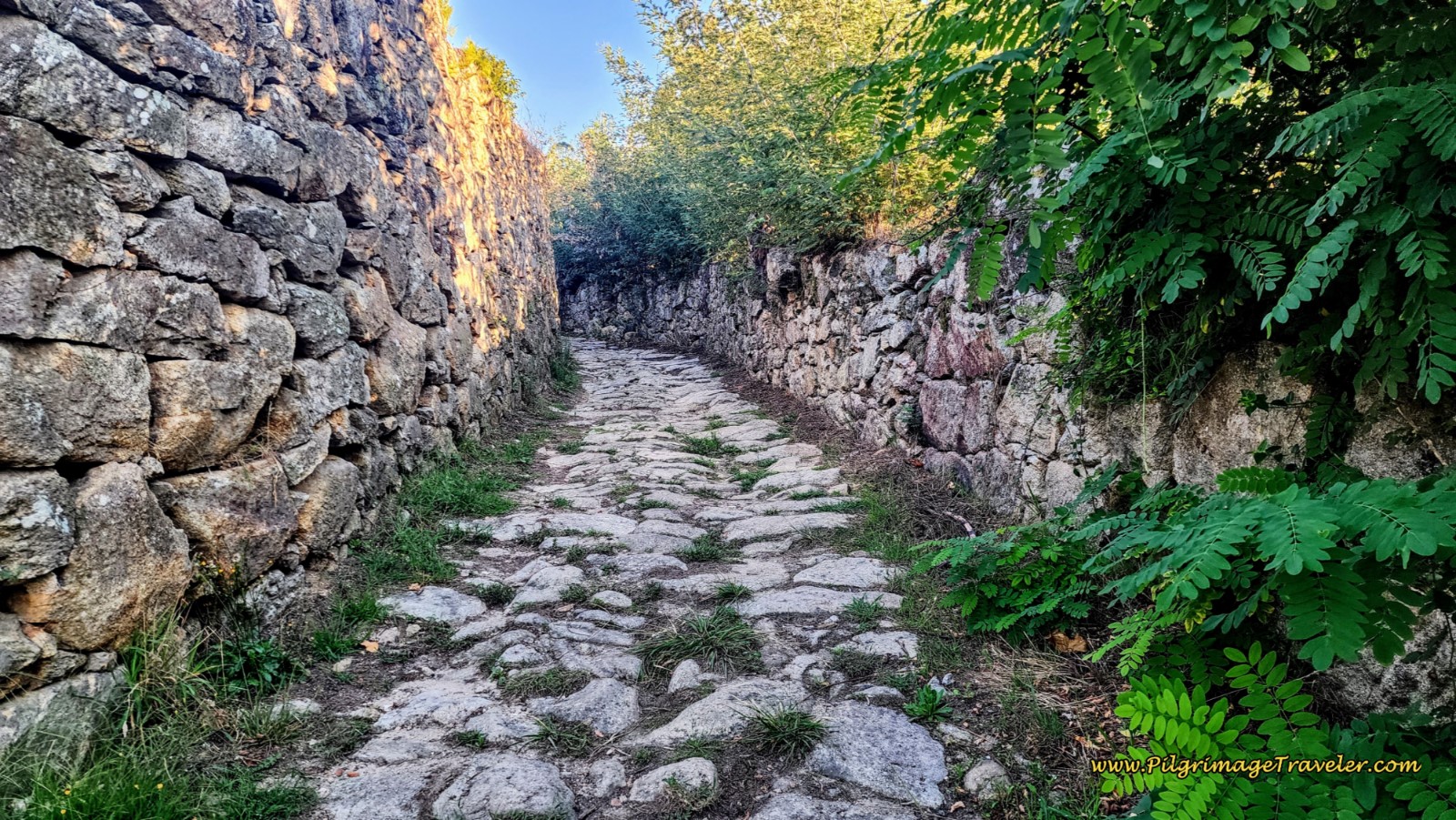
We’re not a travel agency ~ we’re pilgrims, just like you.
We've walked Pilgrimage Routes Across Europe!
💬 We’ve:
- Gotten lost so you don’t have to. 😉
- Followed yellow arrows in the glowing sunlight, the pouring rain and by moonlight. ☀️🌧️🌙
- Slept in albergues, hostals & casa rurals. Ate and drank in cafés along the way. 🛌 😴
- Created detailed and downloadable GPS maps and eBook Guides, full of must-have information based on real pilgrimage travels. 🧭 🗺️
- Shared our complete journeys, step by step to help YOU plan your own ultimate pilgrimage and walk with your own Heart and Soul. 💙✨
Every detail is from our own experiences ~ no fluff, no AI rewrite. Just fellow pilgrims sharing the way. We add a touch of spirituality, a big dose of ❤️ and lots of wisdom from the road.
Ultreia and Safe Pilgrimage Travels, Caminante! 💫 💚 🤍
Map and Stats of Day Twenty-Two on the Camino Portugués
Here is my Google Map of our day, made with our GPS tracks. I added the albergues/hotels/cafés on the maps that we visited. There are more albergues as you get closer to Santiago, so I also added some of the more prominent ones.
There are two routes from O Pobo on the south side of Pontevedra, into town. The official route is in orange on the map below and the Camino Complementario I kept in blue, as this is the one that almost everyone takes.
The Camino Complementario follows along a river on a wonderful shady path, however it is about 1/2 kilometer longer. The orange route stays on the highway into Pontevedra, so if it is happening to be pouring rain and you want to avoid a muddy path take it instead. See the text farther below for the description of both routes.
There are two significant climbs for the day, both about 150 meters (500 ft), with the town of Arcade between the two high points.
Camino Portugués eBook Guides
Our Downloadable Camino Portugués eBook Guides in PDF Format contain all the valuable information from our web pages, for comfortable reading offline and without ads on your personal device. Don't carry a hard copy guide book to increase your pack weight. Use our digital guides on your next Camino instead!
Our ebook guides are packed with frequently updated information, because a digital format is more nimble than hard-copy publishing. Our eBook Guide is unique because we also entertain and immerse you with our story! Click on any eBook above for more information.
Buy only what you need OR buy ALL FOUR eBooks for the price of THREE - a 25% savings! Click here for more information or BUY NOW at only 17.85!
Jump to Camino Portugués Stages
Photo-Rich Travelogue of Day Twenty-Two on the Camino Portugués
We walked out of our albergue (we wished we had booked a different Redondela albergue instead) and onto the quiet side street of Rúa Isidoro Queimaliños. After walking past the church of Santiago, at the top of the hill, I saw this interesting shop sign. I just had to take a picture. How do Spaniards pronounce "Virginia?" (There is a pilgrim accommodation here as well.)
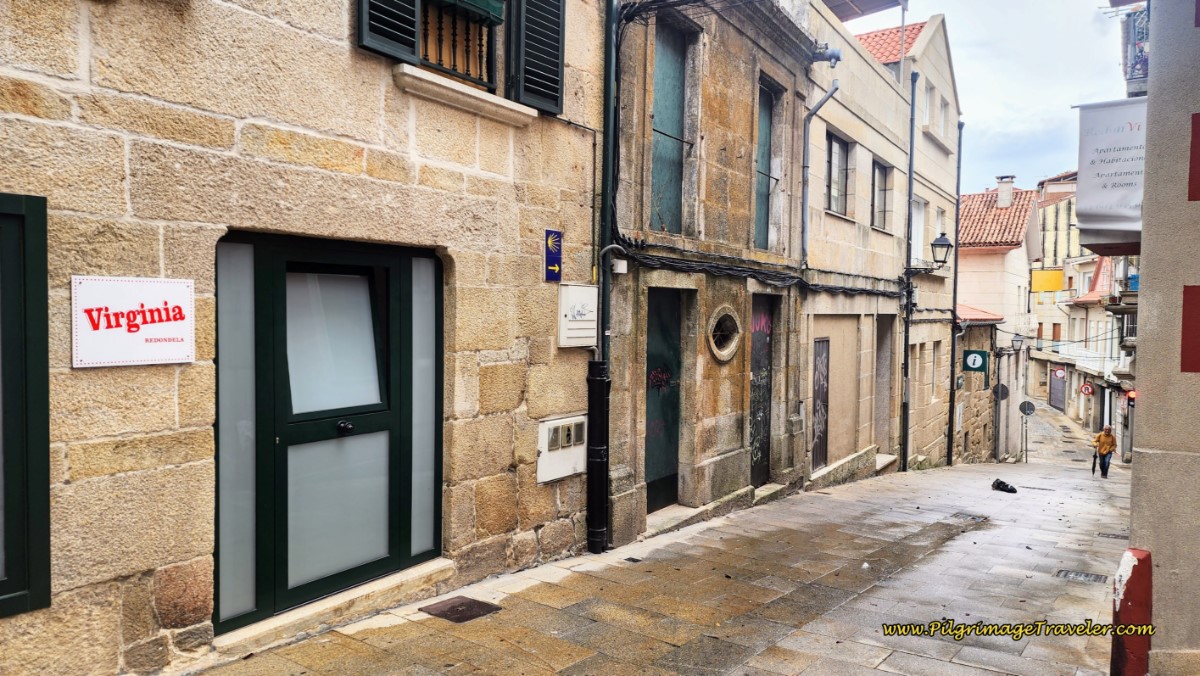 Shop Virginia on the Rúa Isidoro Queimaliños in Redondela
Shop Virginia on the Rúa Isidoro Queimaliños in RedondelaThe Camino stays straight on and walks down the hill and up another one as the street changes names several times. All is completely shut down this early in the a.m., just after daybreak. A typical Spanish morning. It was a good thing we had our breakfast at the albergue, I suppose!
Walking down the street we came to this hórreo (a small building, historically that stored grain), right in the middle of town! There are many of these historic granaries in Redondela. Here the street is called the Rúa da Picota.
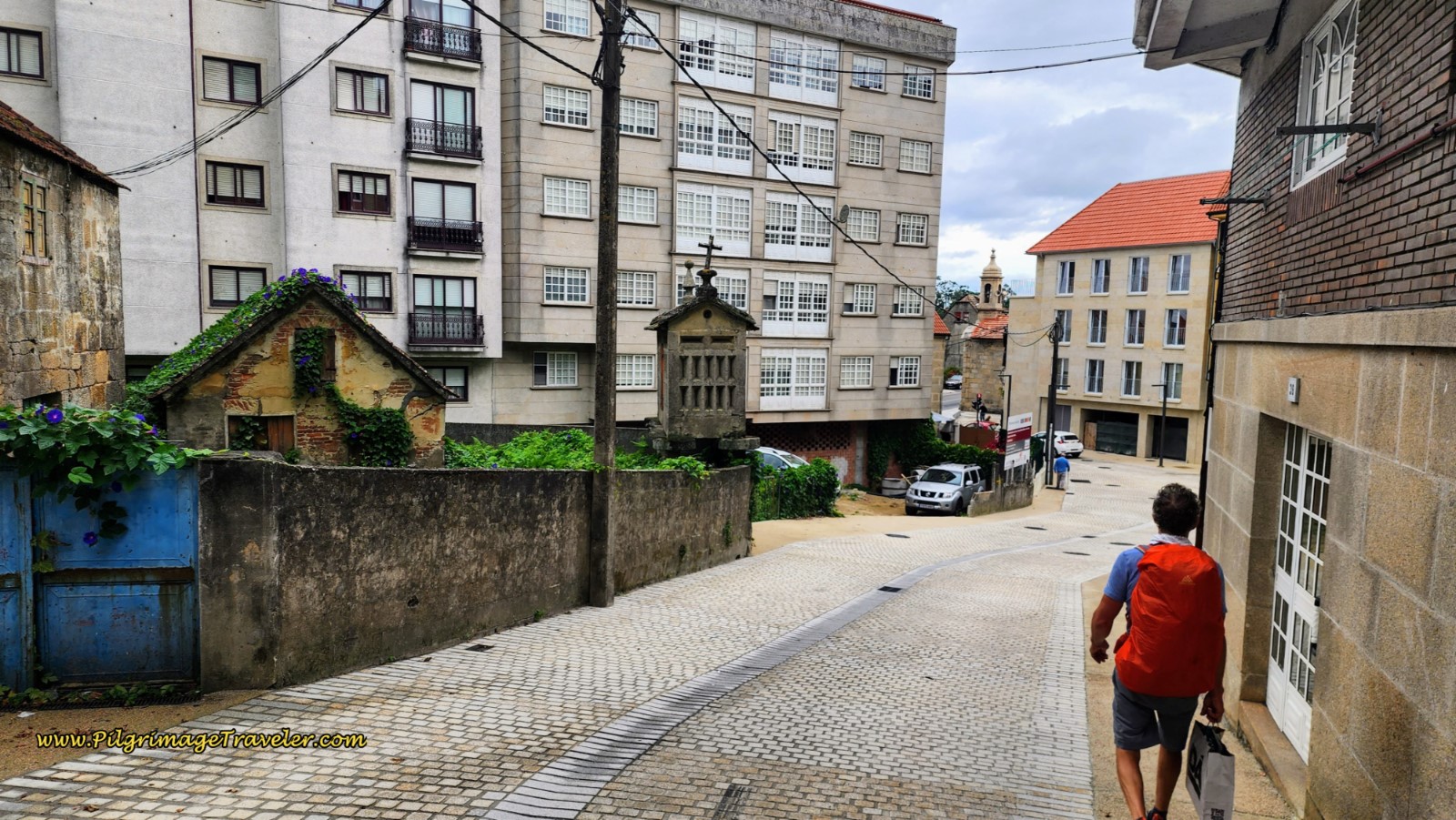 Hórreo Along the Rúa da Picota in Redondela
Hórreo Along the Rúa da Picota in RedondelaContinue just past the hórreo to meet the N-550 after about 700 meters from the main albergue. Carefully cross over it and pick up another side road, veering immediately off to the left. This is called the Rúa Campo de Fútbol because it leads to a soccer field that you will pass shortly on your left, after first walking by a college and a high school.
Walk by the soccer field, and after a total of about 700 meters more, turn left onto the Camiño do Esteiro as the scenery becomes decidedly more rural.
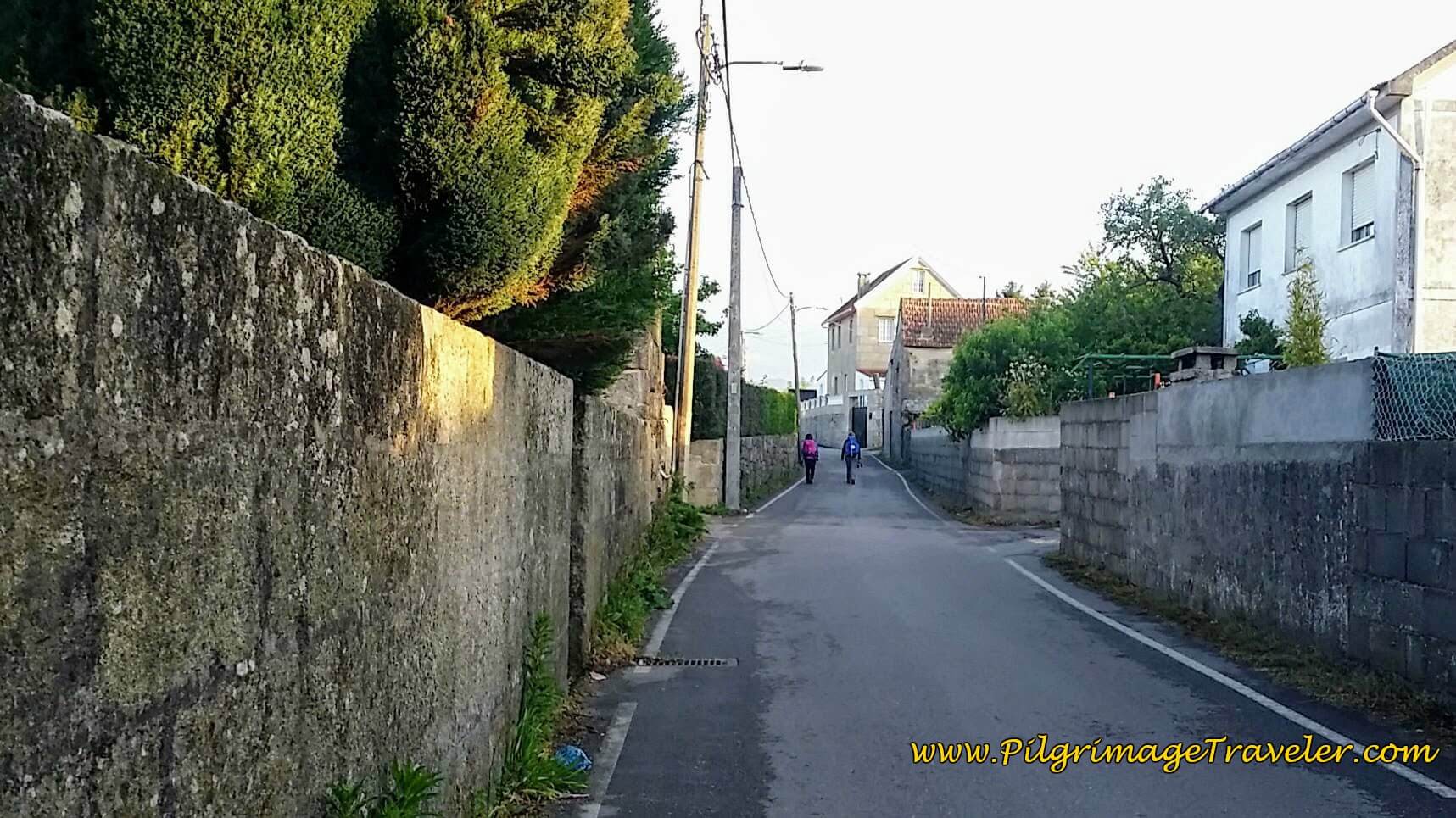 Leaving Redondela on the Camiño do Esteiro
Leaving Redondela on the Camiño do EsteiroAfter 1/3 km, stay uphill turning right onto the Estrada de Zacande, another quiet, paved road on day twenty-two of your Portuguese Camino. At this intersection is the Albergue A Dársena do Francés.
After another 1/3 kilometer come to a T-intersection and turn right onto the Rúa Torre de Calle.
After 150 meters turn left off the Rúa Torre de Calle, here.
The cobblestone turns into a very nice improved pilgrim's path.
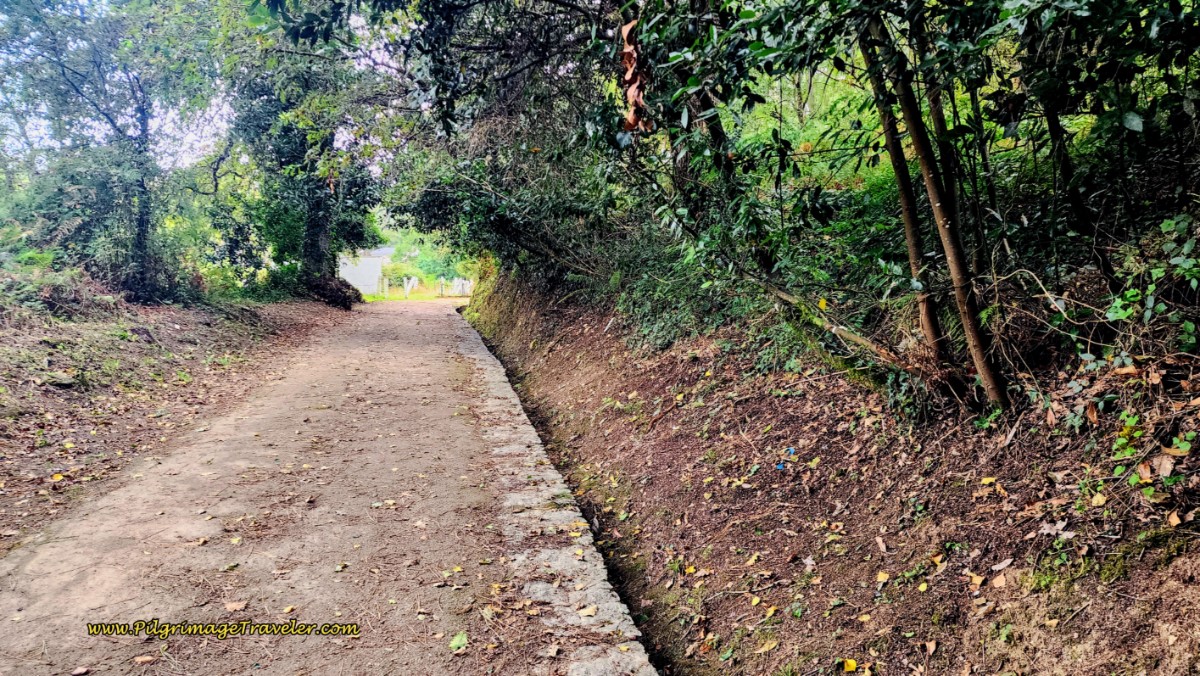 Improved Pilgrim's Path
Improved Pilgrim's PathAfter about 400 meters on the path come to a paved road at a T-intersection and turn left onto the Camiño Abreavella and where there are some nice vineyards. Their leaves were a brilliant spring green in April when we walked.
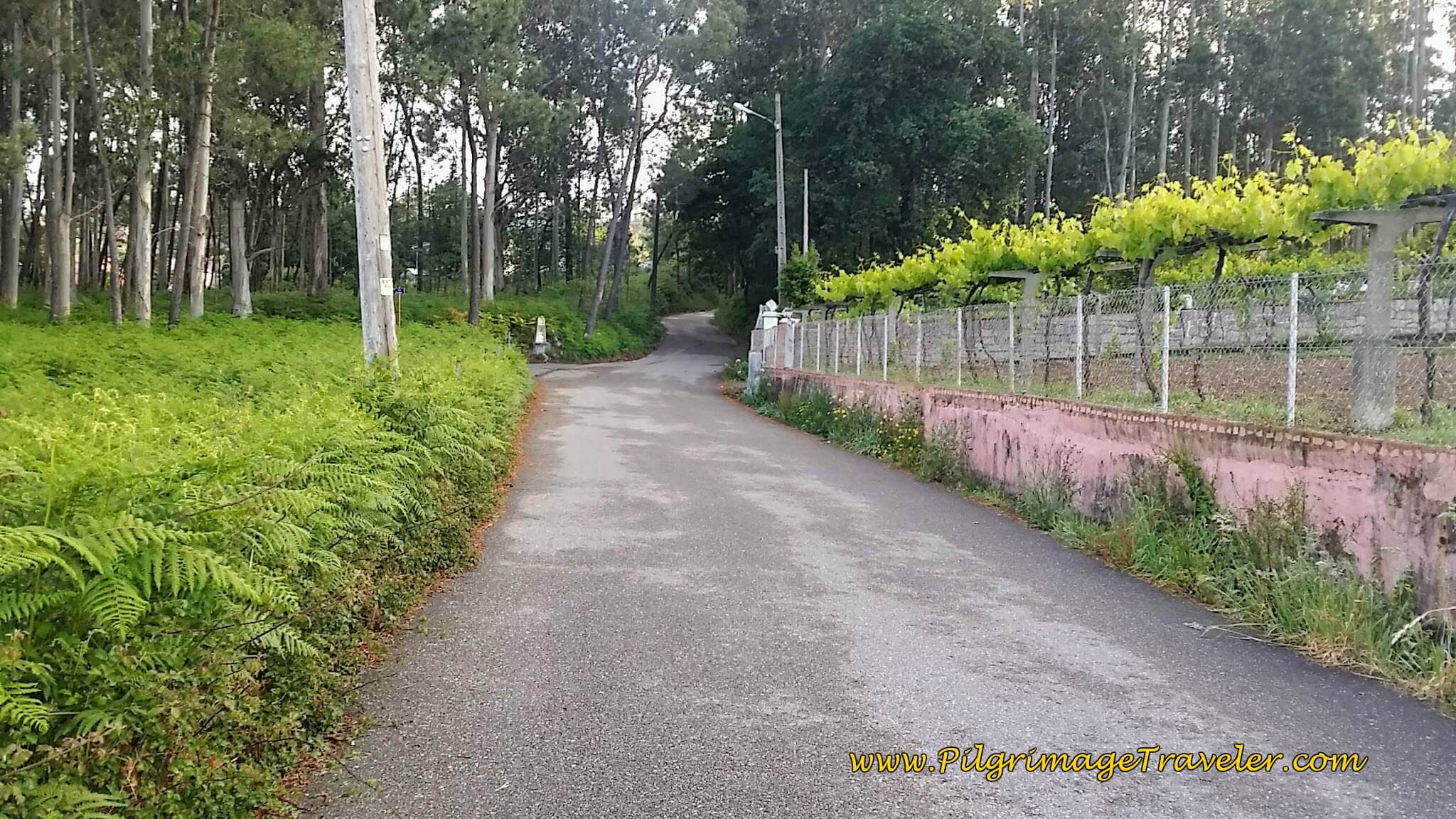 Walk by Vineyards on the Camiño Abreavella
Walk by Vineyards on the Camiño AbreavellaThe road becomes the Camiño Real de Cesantes. On this quiet and narrow paved road, walk through the forest and into the village of Cesantes.
Stay right at a Y-intersection in town. Come to a major T-intersection with the N-550. Carefully cross over the highway on a short jog to the left, then right on the wider paved street, the Aldea Saramagoso.
At this point you are about 3 kilometers into the day. There are cafés and accommodation here in Cesantes if you need it, including the O Refuxio de la Jerezana, the Jumboli (+34 986 49 50 66) , and the Pension Yumboli II ( +34 986 49 50 66).
Lovely vineyards abound here in the Spanish hills! Mmm, can't wait til dinner!
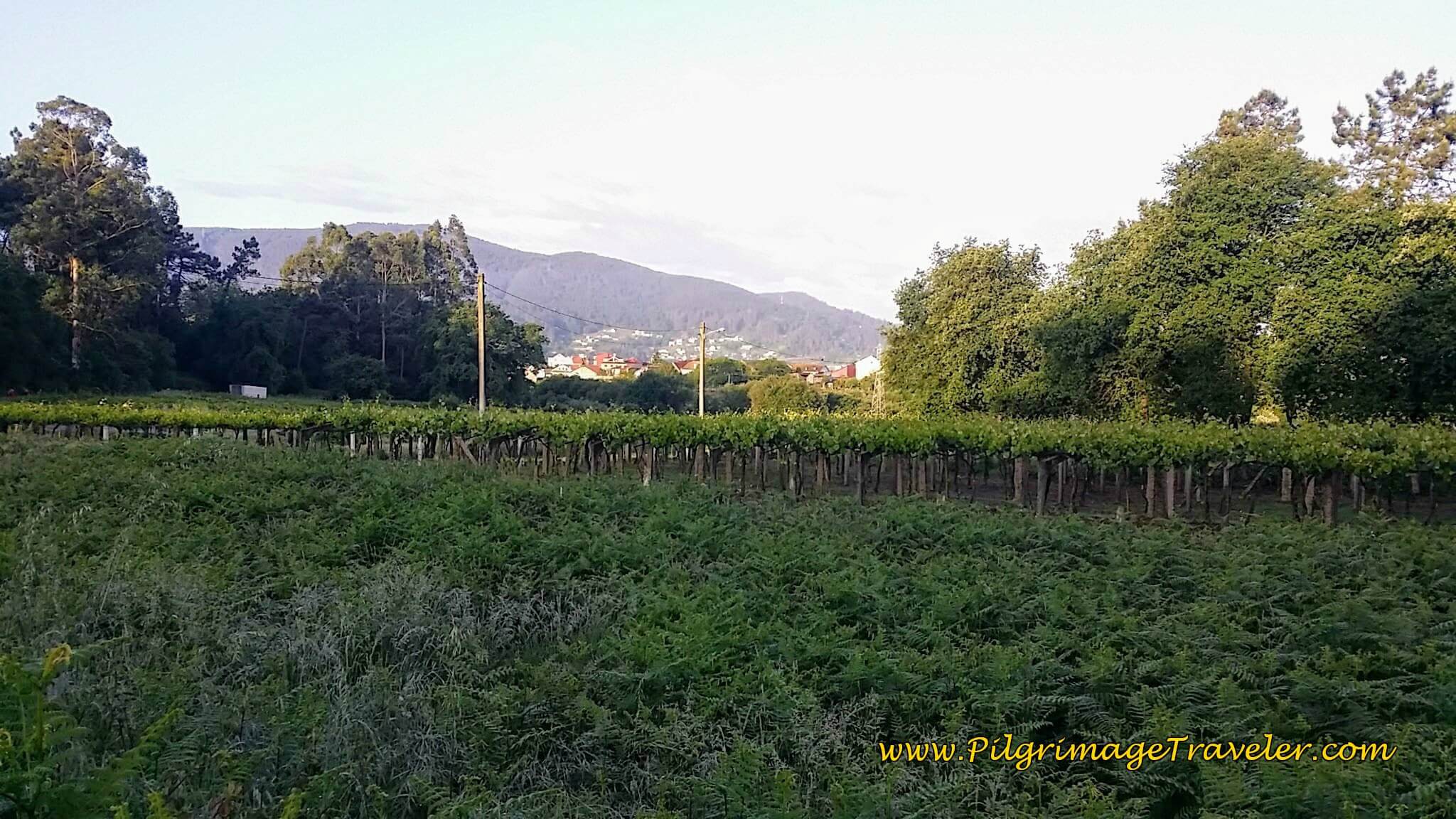 Bountiful and Plentiful Vineyards
Bountiful and Plentiful VineyardsContinue on the Aldea Saramagoso, uphill for approximately 400 meters then turn left on a very small side road, the Camiño do Loureiro do Viso.
Continue climbing on this narrow, paved road, lined with high walls and banks. In about 150 meters you come to this lovely old fountain, the Fonte O Viso. I do not know if the water is safe to drink from it. There is a park with picnic tables here as well, if you need.
After another 100 meters, stay lower (yay) and left to continue on a dirt road into the eucalyptus forest. We passed a waymark with an 82.74 kilometer plaque on it! Getting closer now on day twenty-two of the Camino Portugués.
This is an old logging road as far as I could tell.
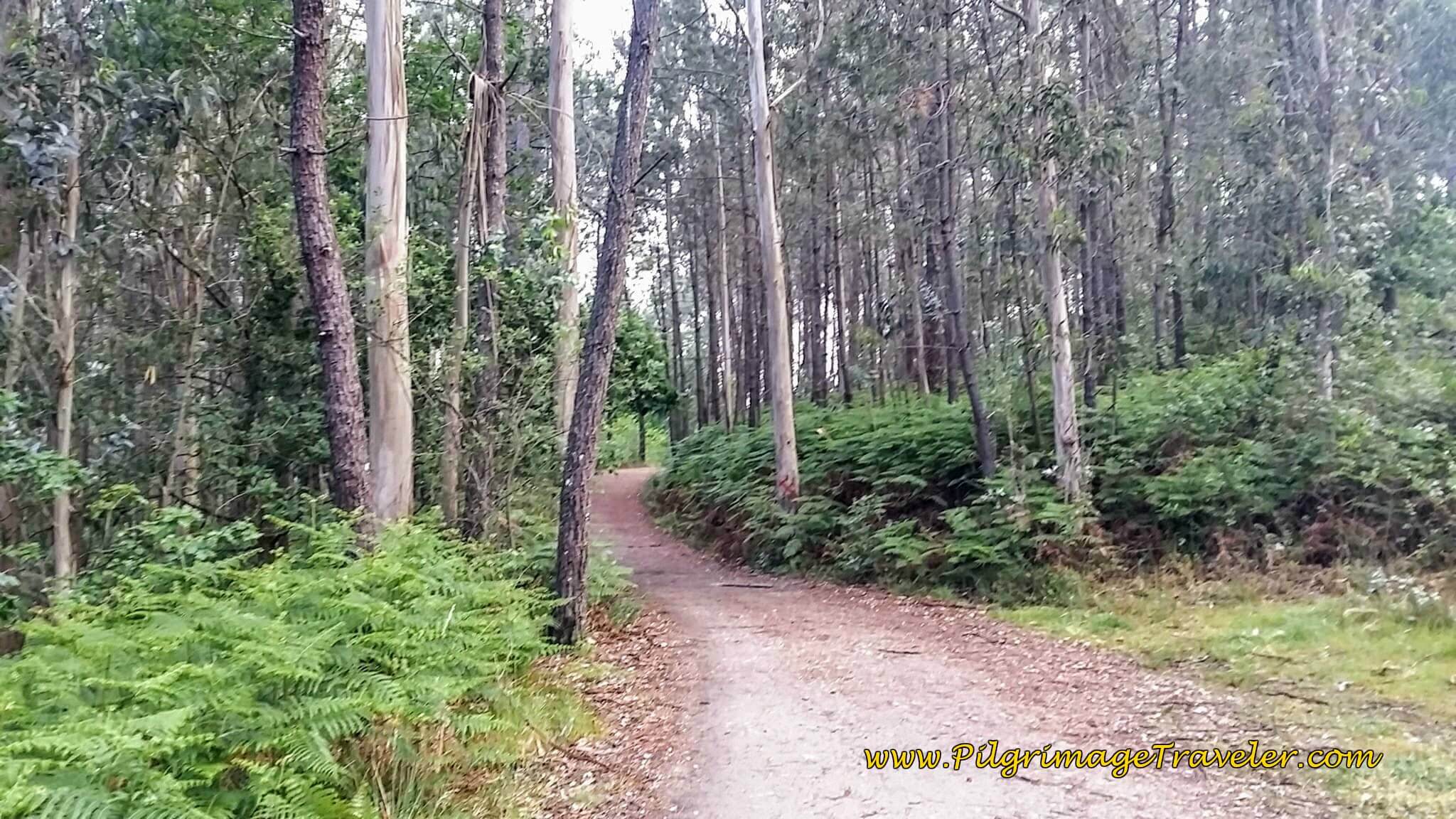 Onward on Forest Path
Onward on Forest PathWalk the enjoyable forest road for just over 1/2 kilometer, and come to a paved road, T-intersection. You are now at the top of the first climb of the day and about 4.3 kilometers total!
Turn down the hill to the left. Along the road, the Subida O Cruceiro do Viso, is a concrete wall, with a Tribute to Pilgrims (Homenaxe ao Peregrino), display for pilgrims. Pause and admire the accomplishments of others, if you wish.
Jump to Camino Portugués Stages
Right by the Tribute is the Casa D'Mina, a lovely rural home accommodation that gets high recommendations. There is a good restaurante nearby, the Bar Trasnos, if you turn to the left immediately after the Casa.
Immediately beyond the Walk only a few meters before turning right onto another lovely dirt road, called the Camiño dos Peregrinos, to continue on through the forest.
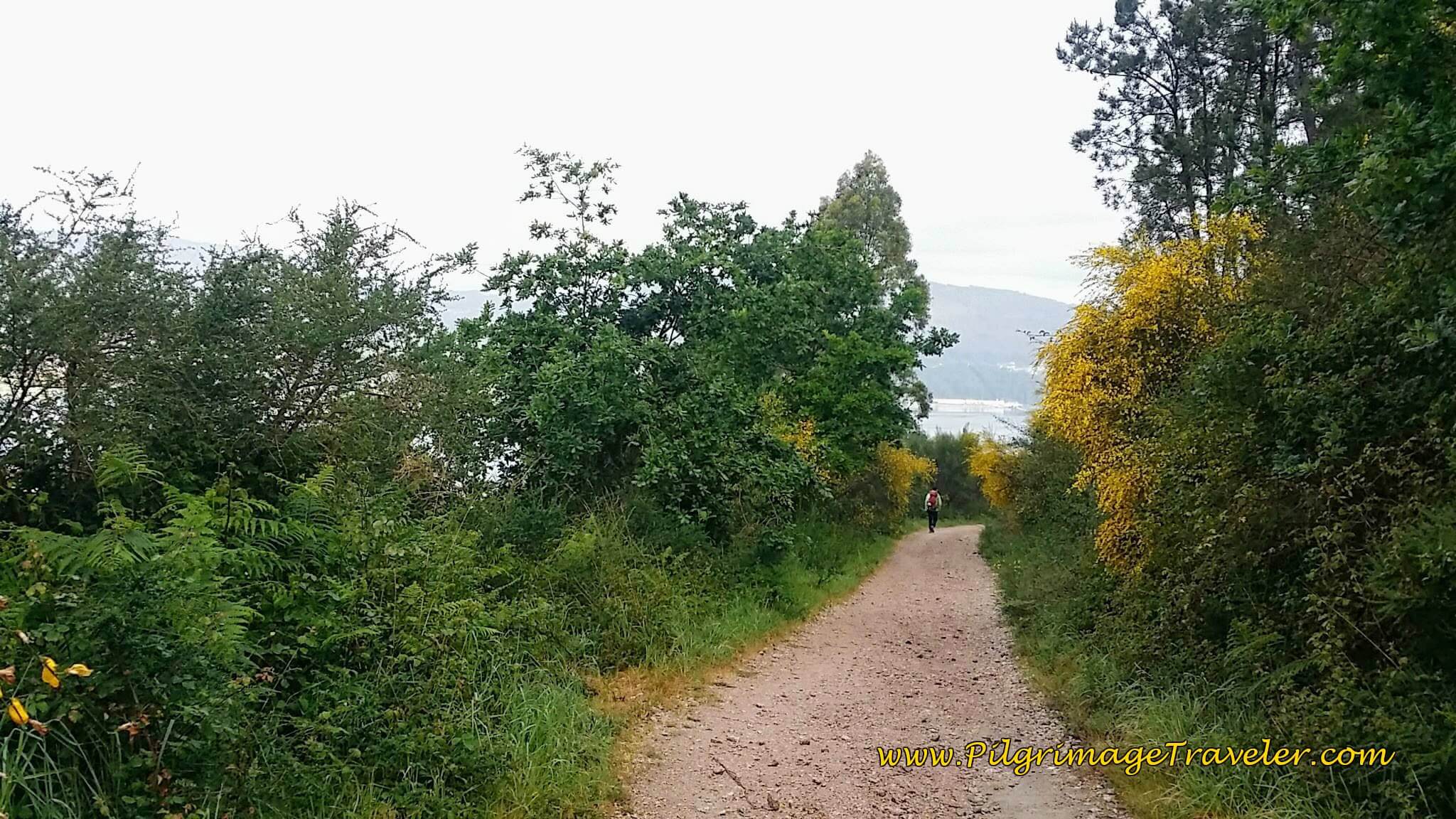 Another Quiet, Dirt Road, the Camiño dos Peregrinos
Another Quiet, Dirt Road, the Camiño dos PeregrinosWhen the forest opens, you can see a grand view of the Ría de Vigo for the last time. On the Coastal route, this river was our companion, on and off for two days.
Continue steeply down the dirt road and in a total of 0.8 kilometer or so, join a paved road the Camiño das Sete Fontes toward the next town of Arcade. There is a fountain at this juncture, on your right, of course named the Fonte das Sete Fontes with a pilgrim family sculpture in front of it.
 Fonte das Sete Fontes and Pilgrim Sculpture
Fonte das Sete Fontes and Pilgrim SculptureContinue on the forested paved road for another 1/2 kilometer and join the busy N-550. Carefully cross it to the shoulder on the other side.
The Camino continues to the right on the N-550.
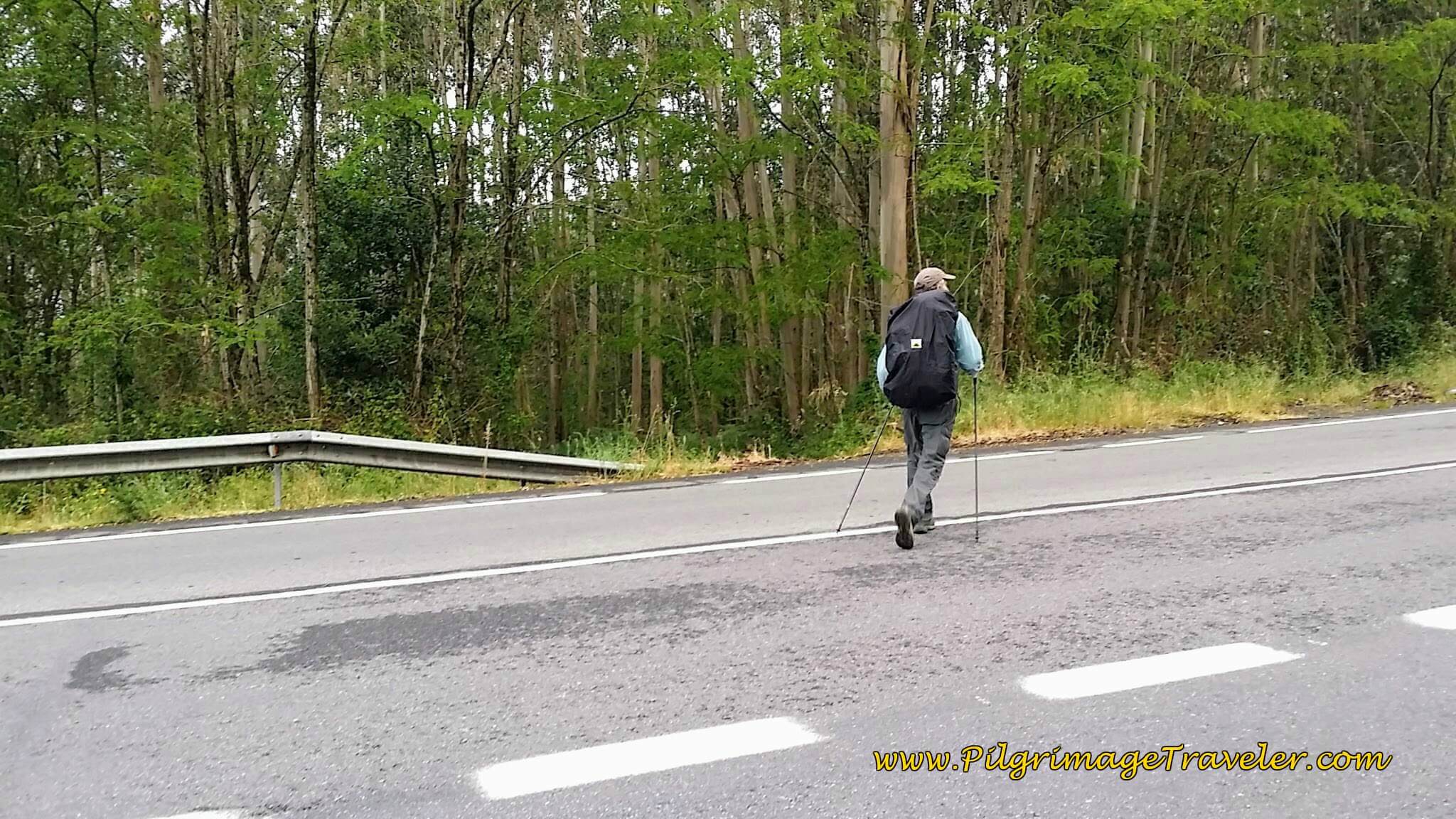 Right Turn onto the N-550 on Day Twenty-Two, Camino Portugués
Right Turn onto the N-550 on Day Twenty-Two, Camino PortuguésThe shoulder is rather narrow here on the N-550 so take caution and walk facing traffic! It widens a bit briefly by the car dealership then narrows again.
In about 300 meters, the narrow shoulder turns into a sidewalk as you walk into Arcade, in the photo below.
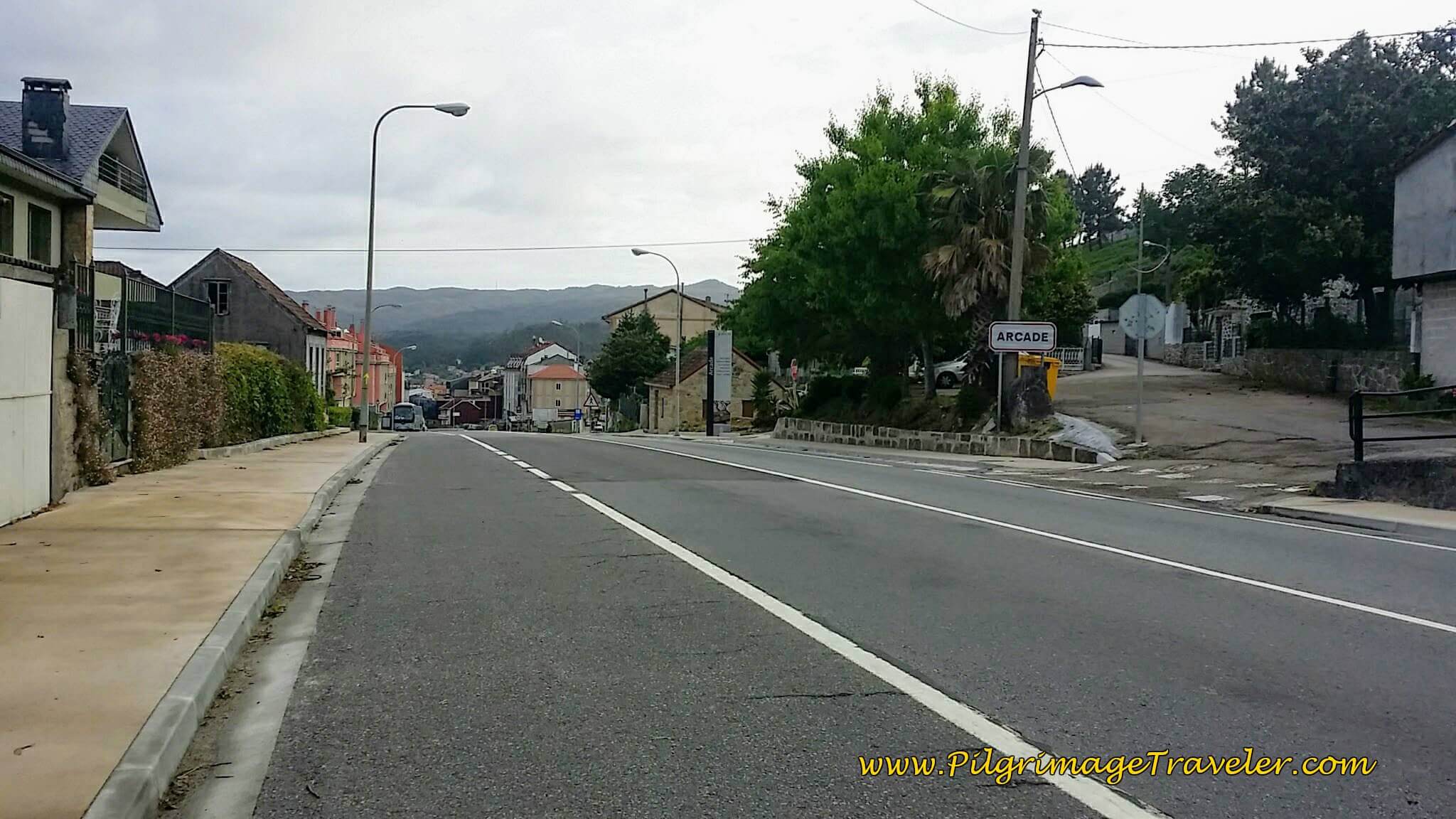 Walking Into Arcade on the N-550
Walking Into Arcade on the N-550In another 200 meters (total of about 1/2 kilometer on the N-550), look for a waymark to turn left, soon after the very attractive-looking Albergue A Filla do Mar. Walk a mere 30 meters then turn right at the Albergue Casa Calvar and onto a nice little side road through town.
Pass a funky little pilgrim's niche along the way.
When the side road ends, below, turn to the right and pass the historic washing well, the Fonte da Lavandeira Arcade.
Round a bend and cross the N-550 to the other side and onto the Rúa das Lameiriñas. As soon as we crossed the highway we spied the Restaurant and Hotel Duarte, +34 986 67 00 57. A perfect place for our first break and café con leche, after about 6.7 kilometers and being not quite halfway for this short day.
A lesson that always served us well, was to seize an opportunity when it became available, because you never know how far it will be until the next café!
This cafe was full of pilgrims, I suspect who were only starting out their day here.
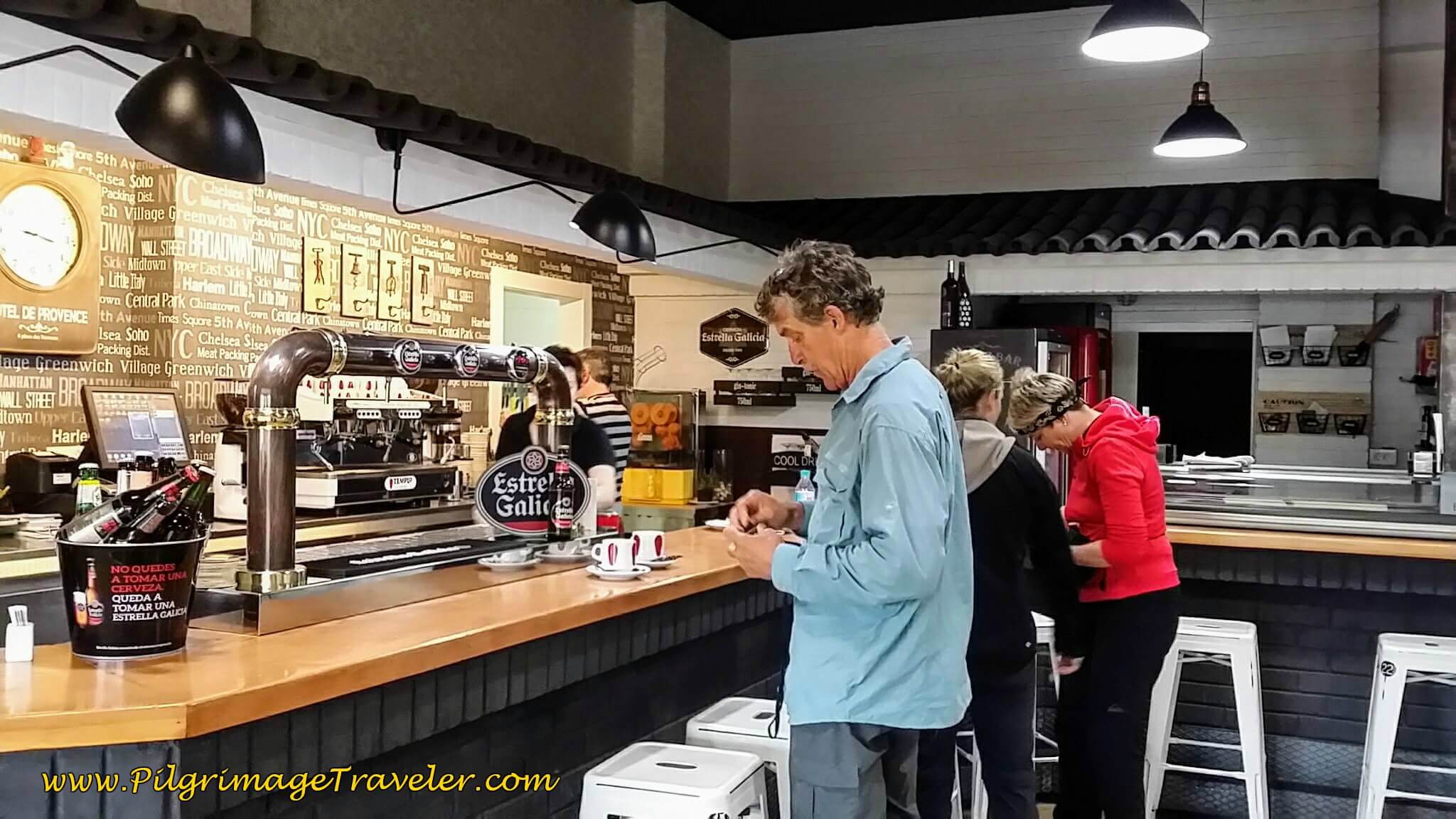 Restaurante Duarte in Arcade
Restaurante Duarte in ArcadeThere are plenty of cafés, accommodations and services in Arcade. There are a few hotels you can book ahead if you like. Click here for more information. The private Albergue Lameiriñas is adjacent to the Hotel Duarte.
After our break, walking out on the Rúa das Lameiriñas it parallels the busy N-550 once again, this time to the east of it. This is a very nice diversion through town. Walk by the private Albergue O Lar de Pepa.
Walk to the next intersection where there is a large hórreo on the right after 300 meters. Go straight on to follow the Rúa do Velero.
Walk 130 meters and turn left onto the Rúa Barroncas.
After 1/3 kilometer, go straight on the Rúa Coutada for 150 meters until it bends to the right by another lovely hórreo and becomes the Rúa Fonte do Conde. Continue on this road, shown below.
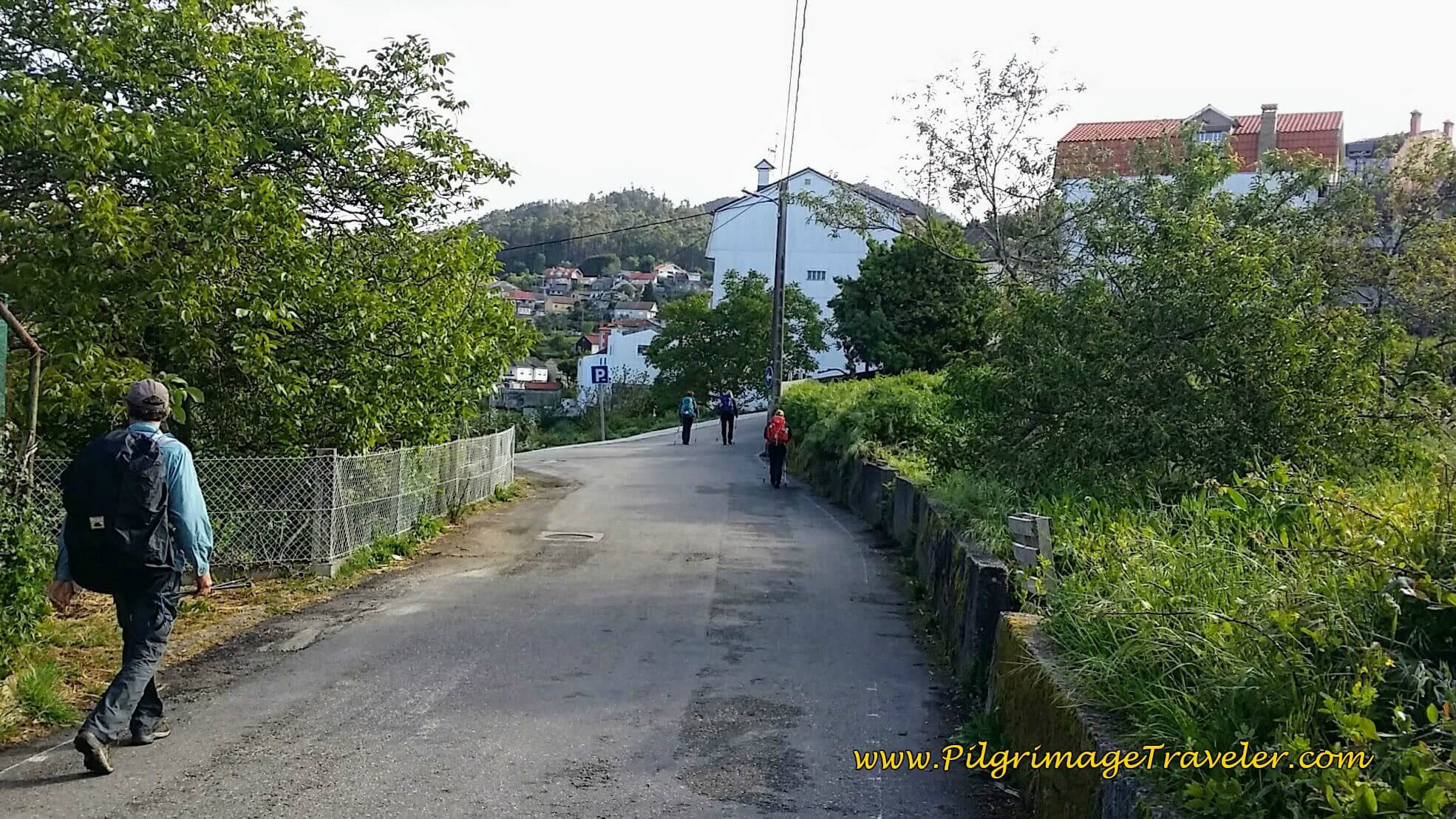 Walking on the Rúa Fonte do Conde
Walking on the Rúa Fonte do CondeThe next body of water you see is the view of the river, the Rio Verdugo now appearing.
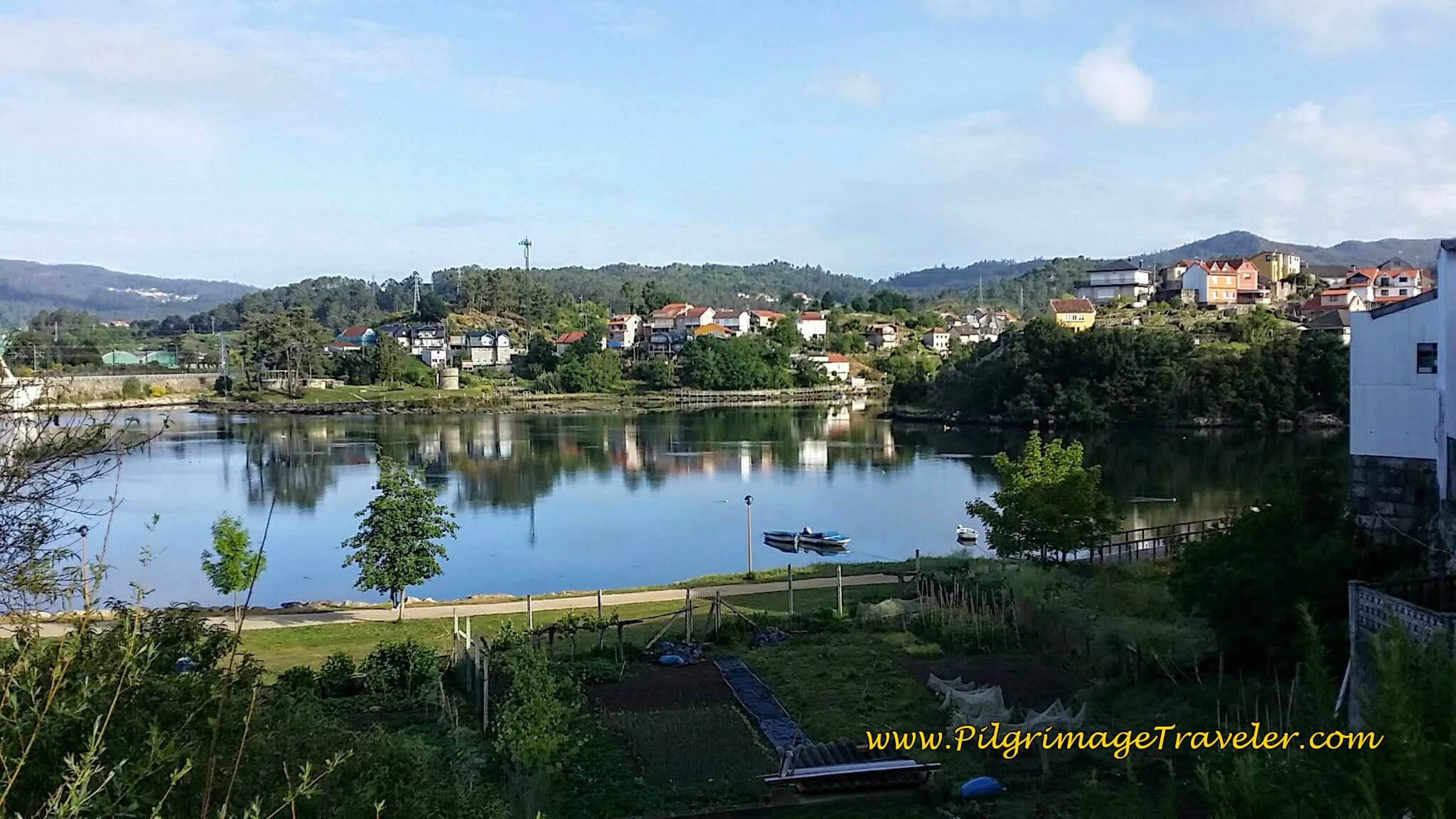 Approaching the Rio Verdugo
Approaching the Rio VerdugoAfter walking another 150 meters come to the Rúa Roxelio Landeiro at a T-intersection and turn left. You are approaching the wonderful old medieval bridge called Ponte Sampaio.
There was a very famous battle here in June of 1809 during the Spanish war of independence. The combined Galician and Spanish troops managed to fend off the French for three days, keeping them from crossing the river, forcing them to retreat and bringing the end to their five month presence in Galicia!
Jump to Camino Portugués Stages
After crossing the bridge, in only a few meters up the hill on the street also called Sampaio, look left to see a large Camino sign indicating that the pilgrimage traveler should turn left, onto the narrow walking street shown below.
If you were to carry straight on, the private and lovely Hostel Albergue O Mesón is straight ahead, as the sign also indicates.
The pedestrian path climbs up and to the right on a series of steps and continues to wind up the hill on Concello street, for about 250 meters.
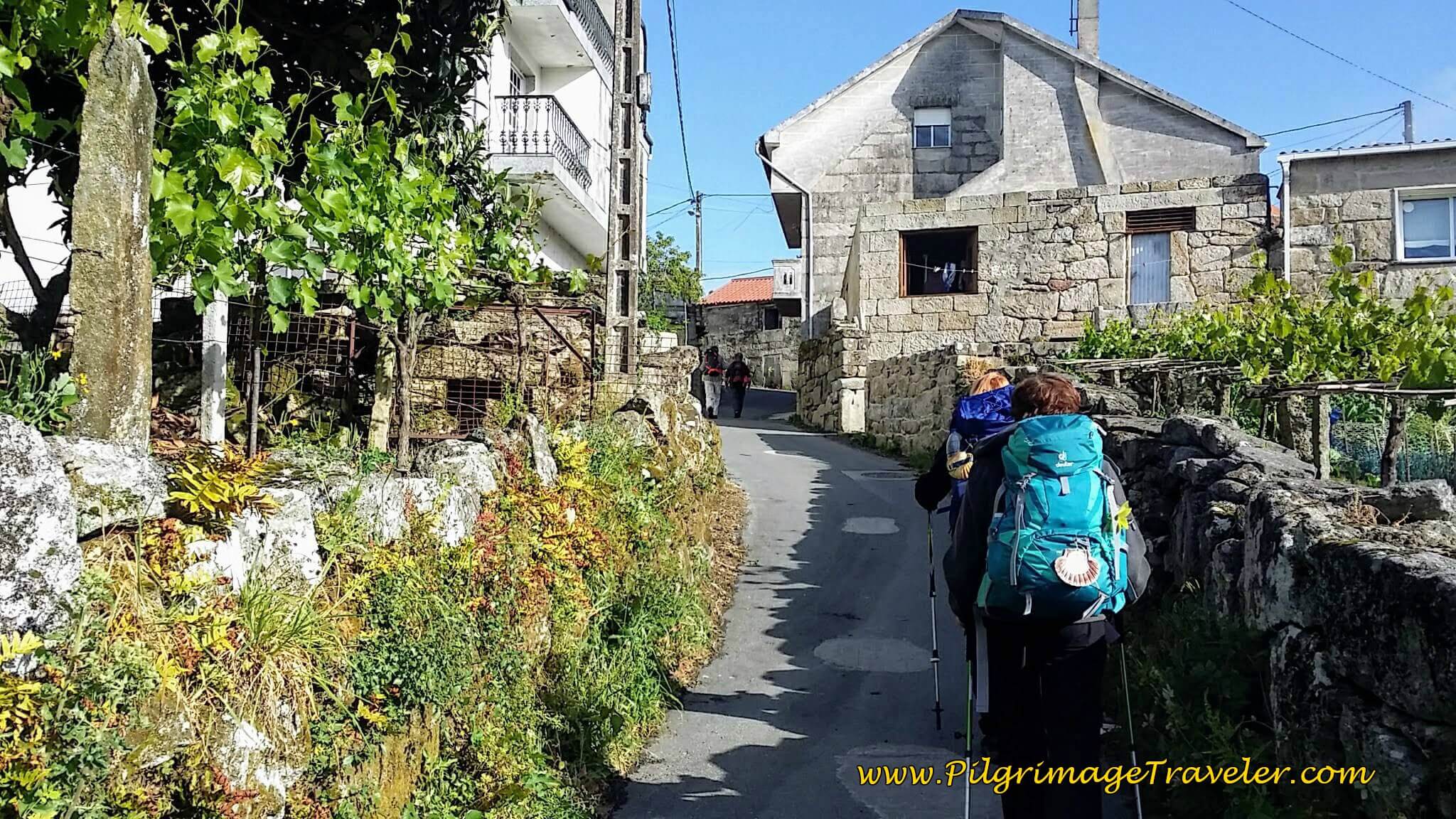 Pilgrims Climbing Up Concello Street
Pilgrims Climbing Up Concello StreetThe Portuguese Way then turns left and walks for 50 meters on Ballota, then right on the Barrio Pontillón which becomes the Aldea Souto. Walk about 1/3 kilometer on the Aldea Souto, then descend the hill on the other side.
When the street ends, cross over to a lovely forest path, very well way-marked and begin the long hiking trail through forest and countryside, along the cool and shady Rio Ulló.
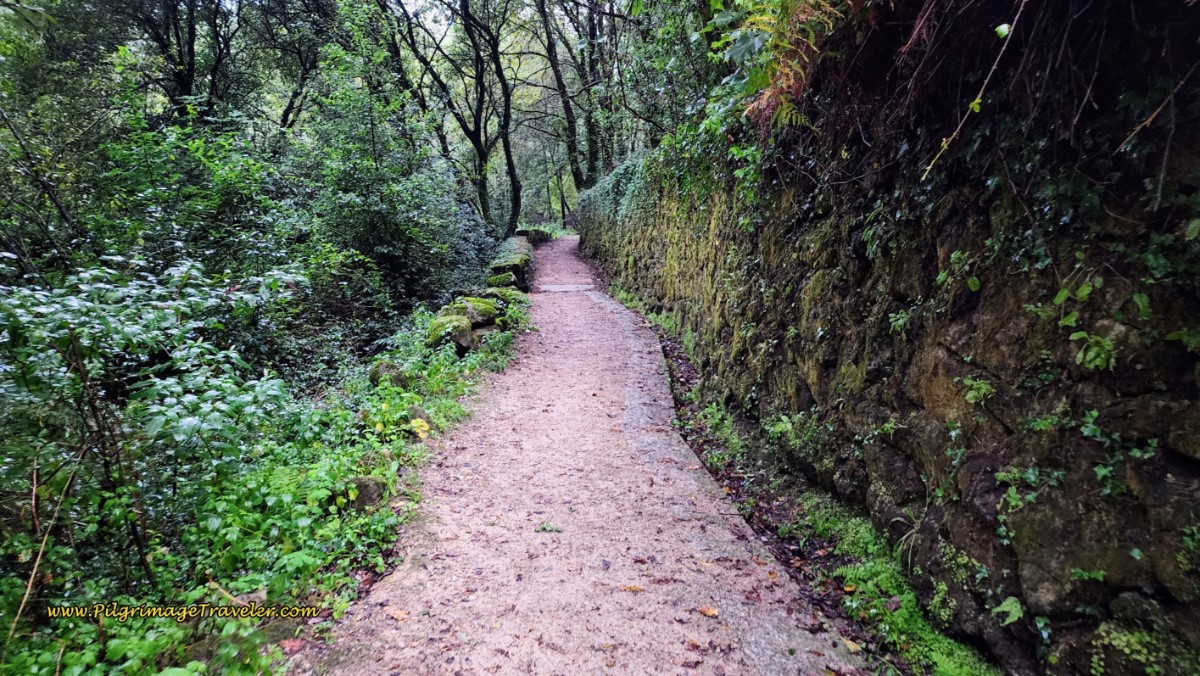 Entering Forest Trail System Along the Rio Ulló
Entering Forest Trail System Along the Rio UllóDescend to the river, and cross the Rio Ulló on a long metal bridge and come to a very nice picnic rest area by the river.
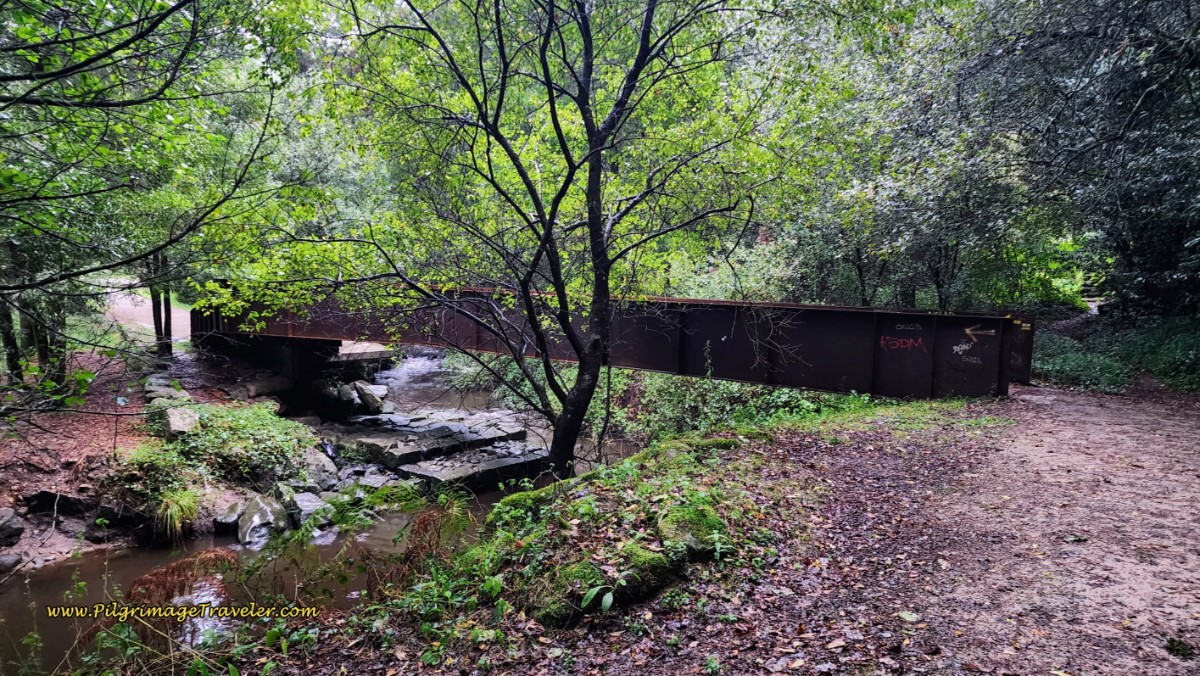 Cross the Rio Ulló on Metal Bridge
Cross the Rio Ulló on Metal BridgeThere are more pilgrim remembrances here.
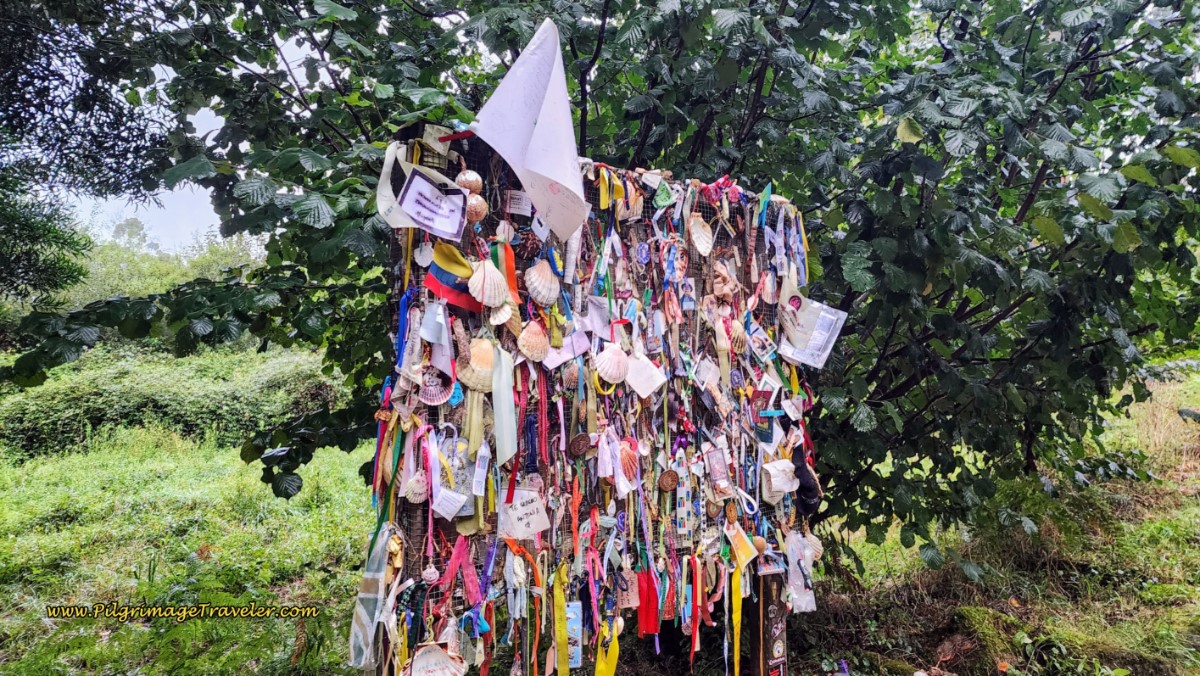 Pilgrim Tributes and Remembrances
Pilgrim Tributes and RemembrancesIt seems that more and more of these pilgrim tribute and remembrance walls are popping up along the Camino. I am not sure how I feel about it, quite frankly. On the one hand, I honor the pilgrim's need to express their deepest emotions in a physical manner, and on the other hand it feels like litter. Who stops and reads them anyway? Regardless, the need to leave one’s mark along the Camino is quite strong, and perhaps a archetypal human trait.
It is a steady ascent up from the river from here, over the next two kilometers.
Within a few hundred meters, the trail clearly becomes an ancient road. There are wagon wheel ruts in the stone pavers. I'm guessing that the paving is from medieval times, but the road goes back to the Romans and the Via Romana XIX. If any historian can confirm this for me and my readers, please let us know! (Contact Us)
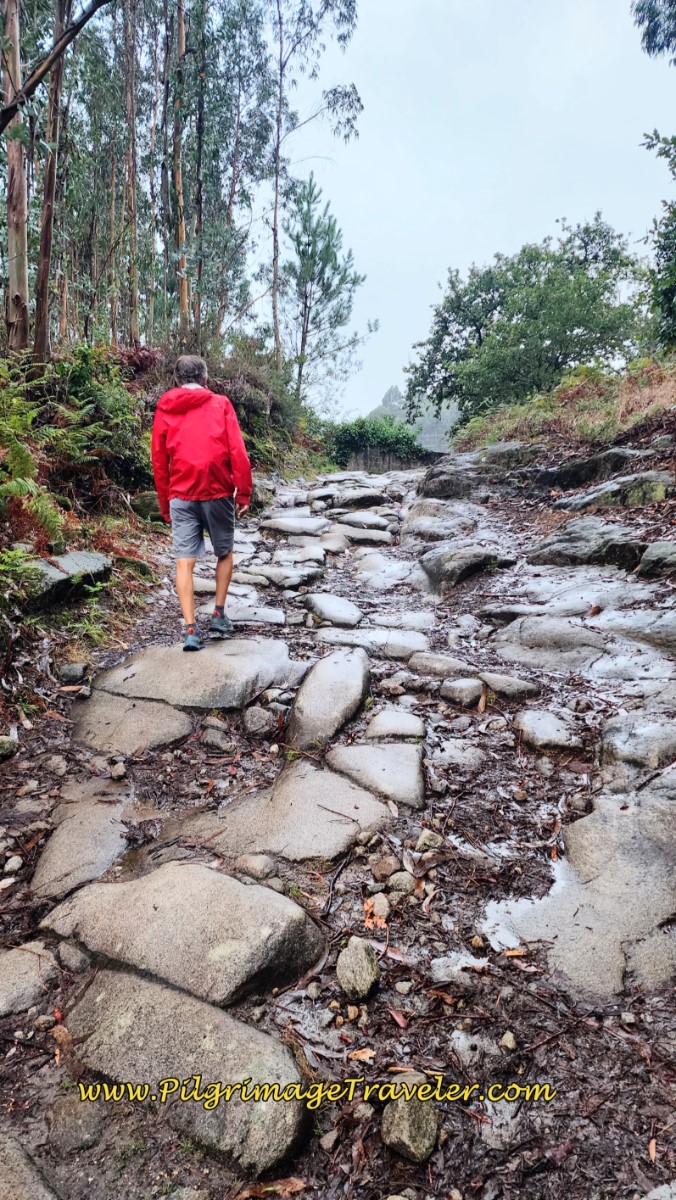 Rich on the Ancient Road
Rich on the Ancient Road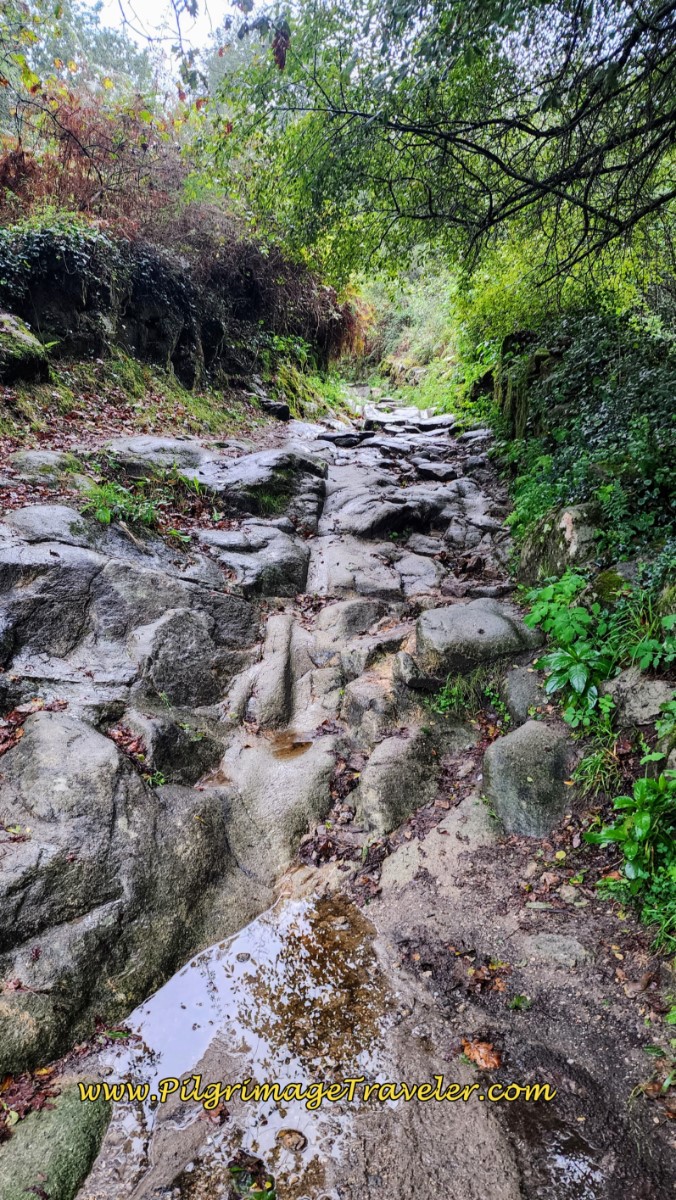 Ancient Road Wagon Ruts
Ancient Road Wagon RutsWe walked onward, imagining ourselves once again, as medieval pilgrims on a journey more arduous than the present along ancient road sections that last for not quite a kilometer!
At the forest path's intersection with a paved road near Cacheiro, an industrious vendor had set up a cafe. There are always similar casual places along this section that come and go.
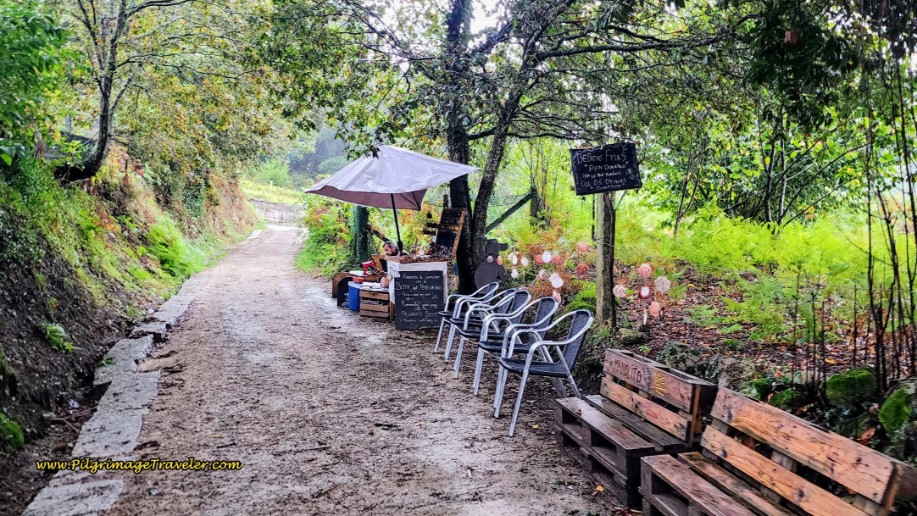 Vendor at Intersection Near Cacheiro
Vendor at Intersection Near CacheiroWe crossed the intersection and continued on the quiet forest road.
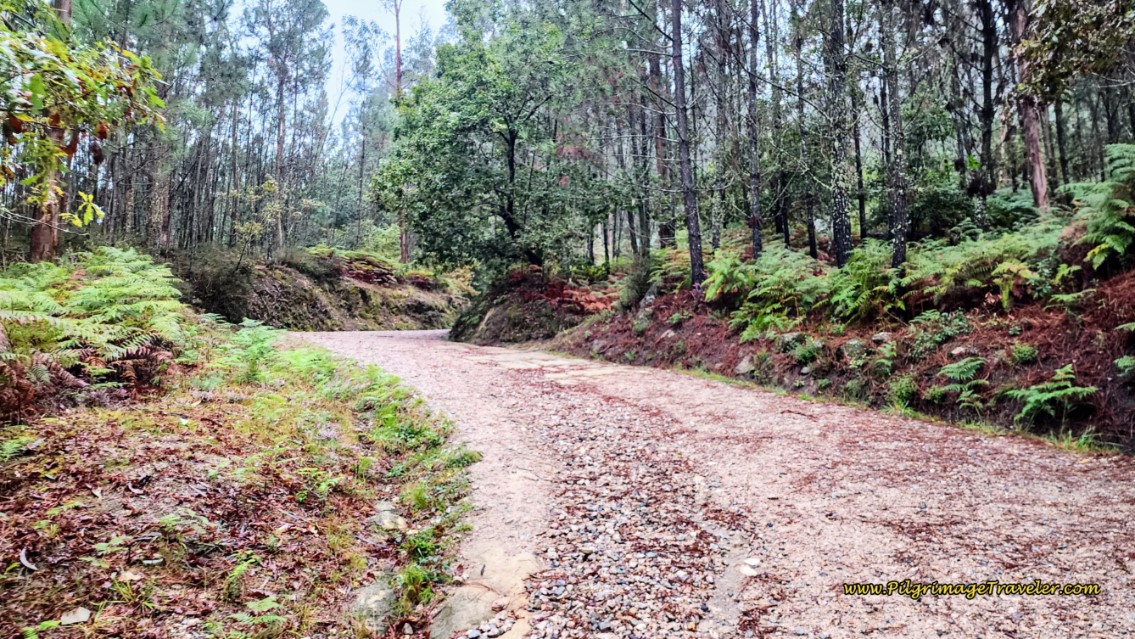 Forest Road Continues Uphill
Forest Road Continues UphillThe walk through this trail system is about 2.0 kilometers total, walking around the town of Cacheiro.
Then you come out onto the highway, the EP-0001 and turn right.
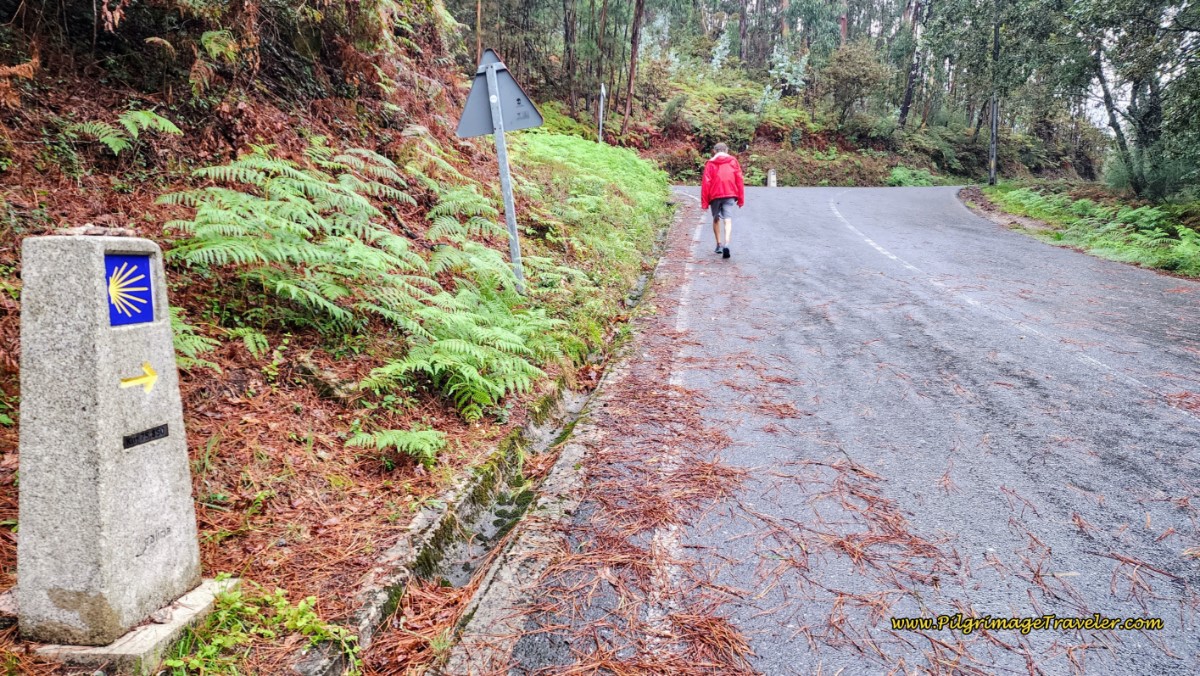 The Camino Briefly Joins the EP-0001
The Camino Briefly Joins the EP-0001You only walk on this highway for 300 meters, then turn left onto a quiet and narrow paved road towards the next town of Bergunde. At this turn, you are at about 11.2 kilometers into the day, and at the top of the second climb. It is all downhill from here.
The forest roads are lined with moss-covered rocks, below. We were certainly in Galicia, with this type of terrain!
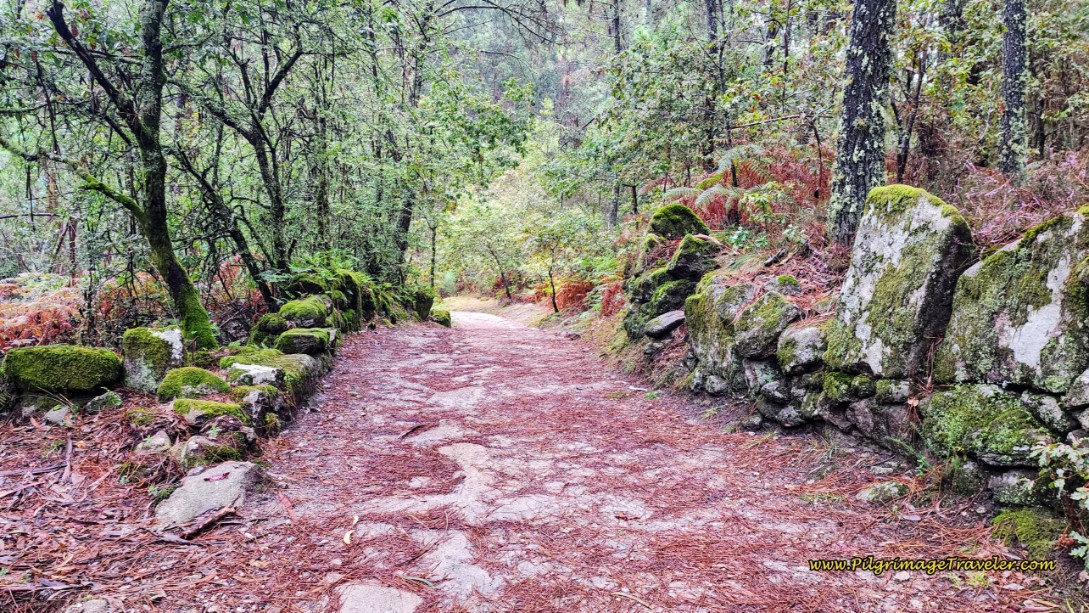 Forest Road Lined with Moss-Covered Rocks
Forest Road Lined with Moss-Covered RocksJump to Camino Portugués Stages
The Changing Face of the Camino Portugués on Day Twenty-Two
After 600 kilometers, the tips on our hiking poles had worn down to the metal. We were clacking right along on the paved road, energetically pushing ourselves up a hill and passed by a German couple, sitting at the side of the road having lunch. They put their fingers in their ears as we approached. I shrugged my shoulders and said, "We came from Lisbon and our shoes are worn out. "Sorry!"
Then, as we passed another German woman going slower up the hill, she added insult to injury as she confirmed - "But it is loud!"
Well, I needed my poles. Too bad. I was not going to sacrifice my comfort at this late stage of the game and most likely the nearest sports store was in Santiago!
Of course it bothers us when we bother other people. We did not do this intentionally, so Rich and I vented a while to each other. The venting was mixed with our embarrassment at having displeased someone and annoyance that they didn't understand.
However, we promised ourselves that we would carry extra rubber tips in our packs on future Caminos. (Which I can vouch that I did actually purchase these upon returning home, several months later).
I have to confess that we were also turning into Camino snobs. Around every bend and up every hill, all we saw were more peregrinos. Some we met back at the café in Arcade, who started 2 days ago, in Tui, cranking out the last 100 kilometers.
By this point, we were just tired, and just wanted to get there now and all these people were changing our Camino. Even though we knew there would be many more pilgrims after Tui, there were just more than we had truly expected to experience, I guess. For me, it seemed worse than the final kilometers on the Camino Francés!
In another incident, as we were walking along, three Spanish women jumped out as we walked by, and intentionally blocked our way. What? We fell behind them, but we were walking much faster than them, and I had to sort of nudge and push my way by them and say with the best smile I could muster, "Buen Camino," "Disculpe" and "Gracias." As is often the case, they tried to stay with us, for a short while, and then we lost them rather quickly.
Jump to Camino Portugués Stages
Onward on Day Twenty-Two of the Camino Portugués
Shortly onward, you walk by the town of Canaval, and a fountain that you can see ahead that is not potable water.
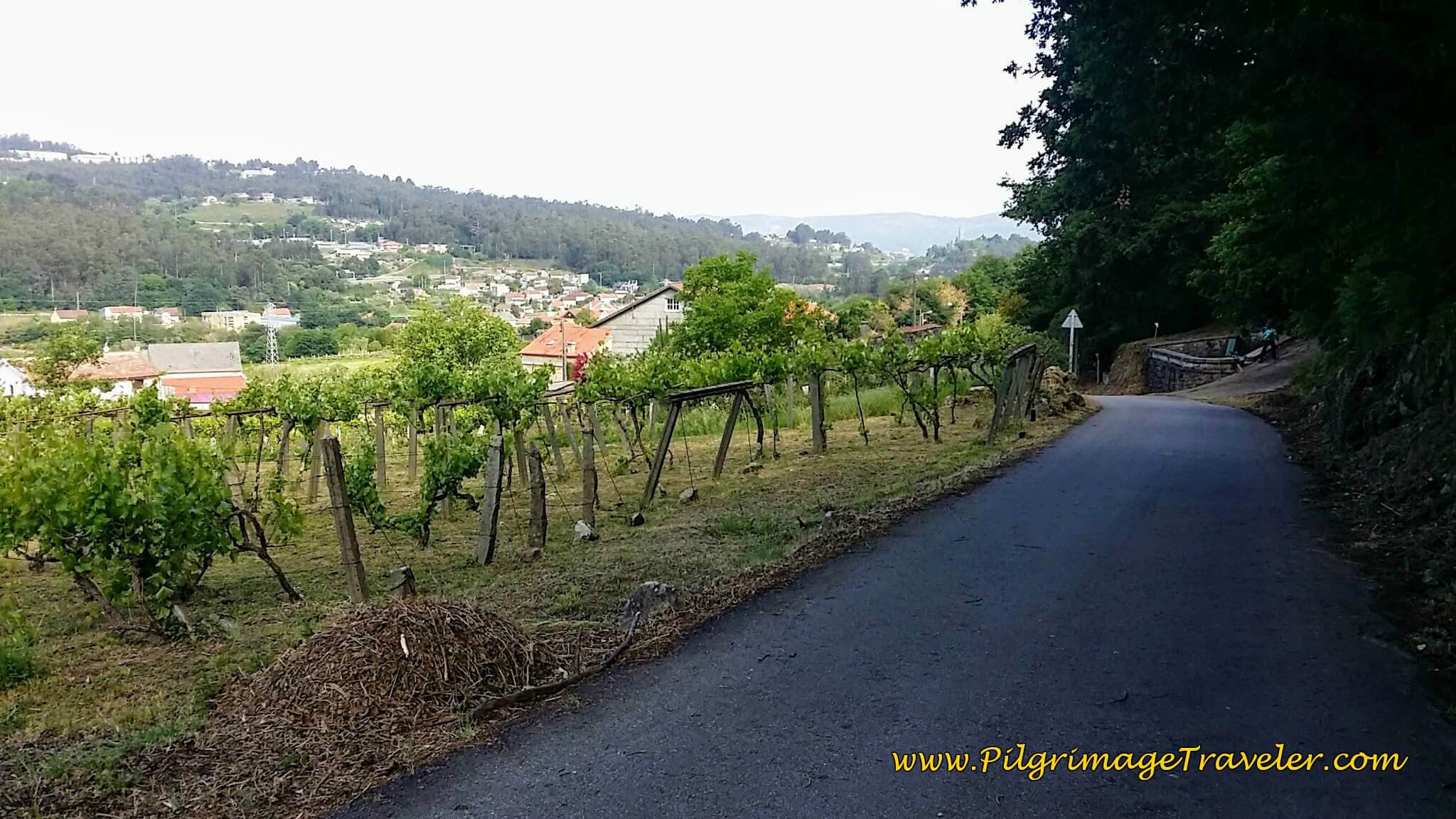 Walking By Canaval
Walking By CanavalWalk straight on this same road for a total of 1.8 kilometers, after logging in 13 kilometers total for the day, then come to a T-intersection, where you turn left to join the EP-0001 once again at a nice picnic area with a fountain that is potable, where you can fill up if needed.
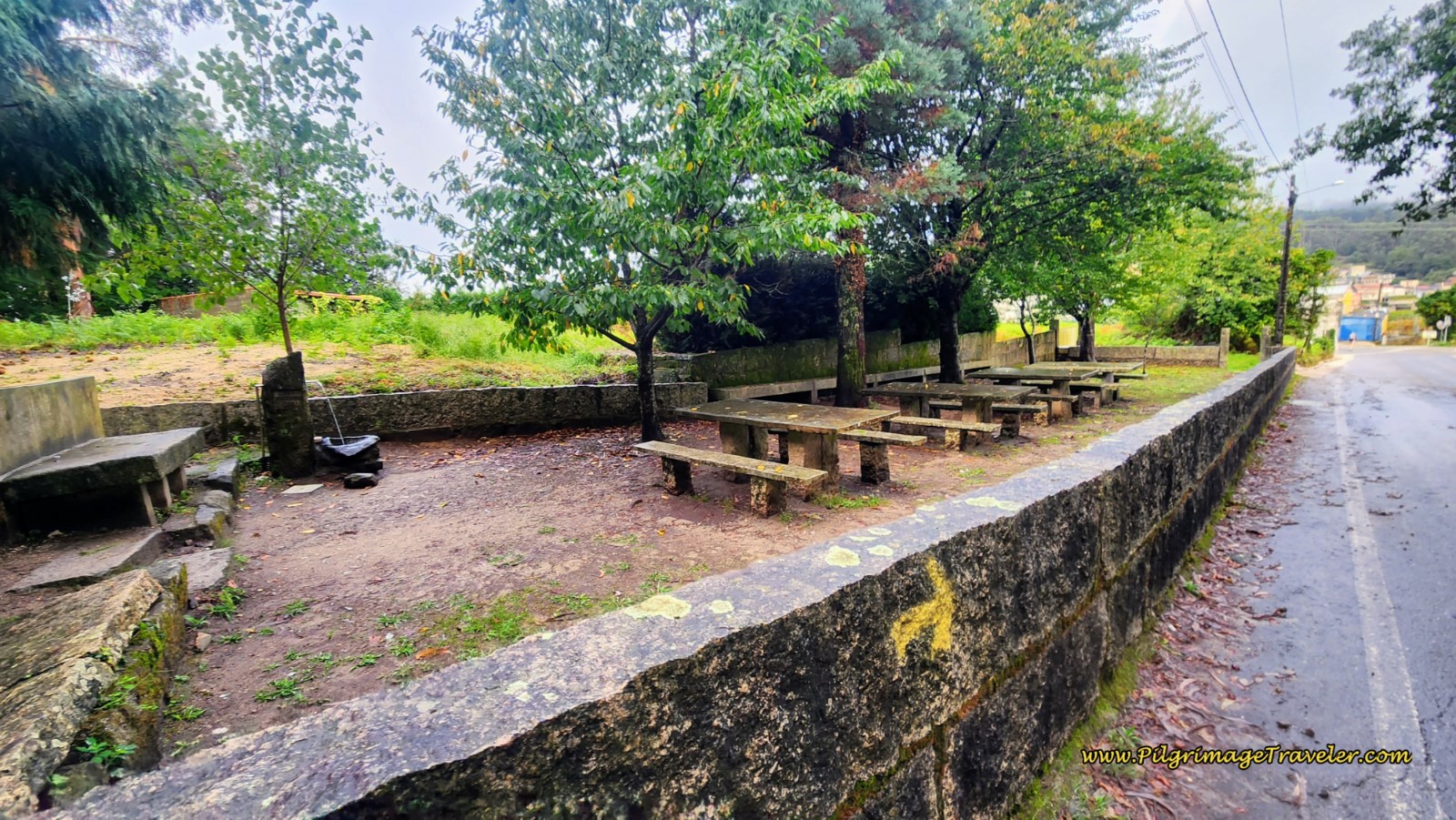 Picnic Area and Fountain at Intersection with the EP-0001
Picnic Area and Fountain at Intersection with the EP-0001Continue to walk onward, toward O Alcouce. A few meters later, cross an intersection and walk straight on through O Alcouce. It is a small town.
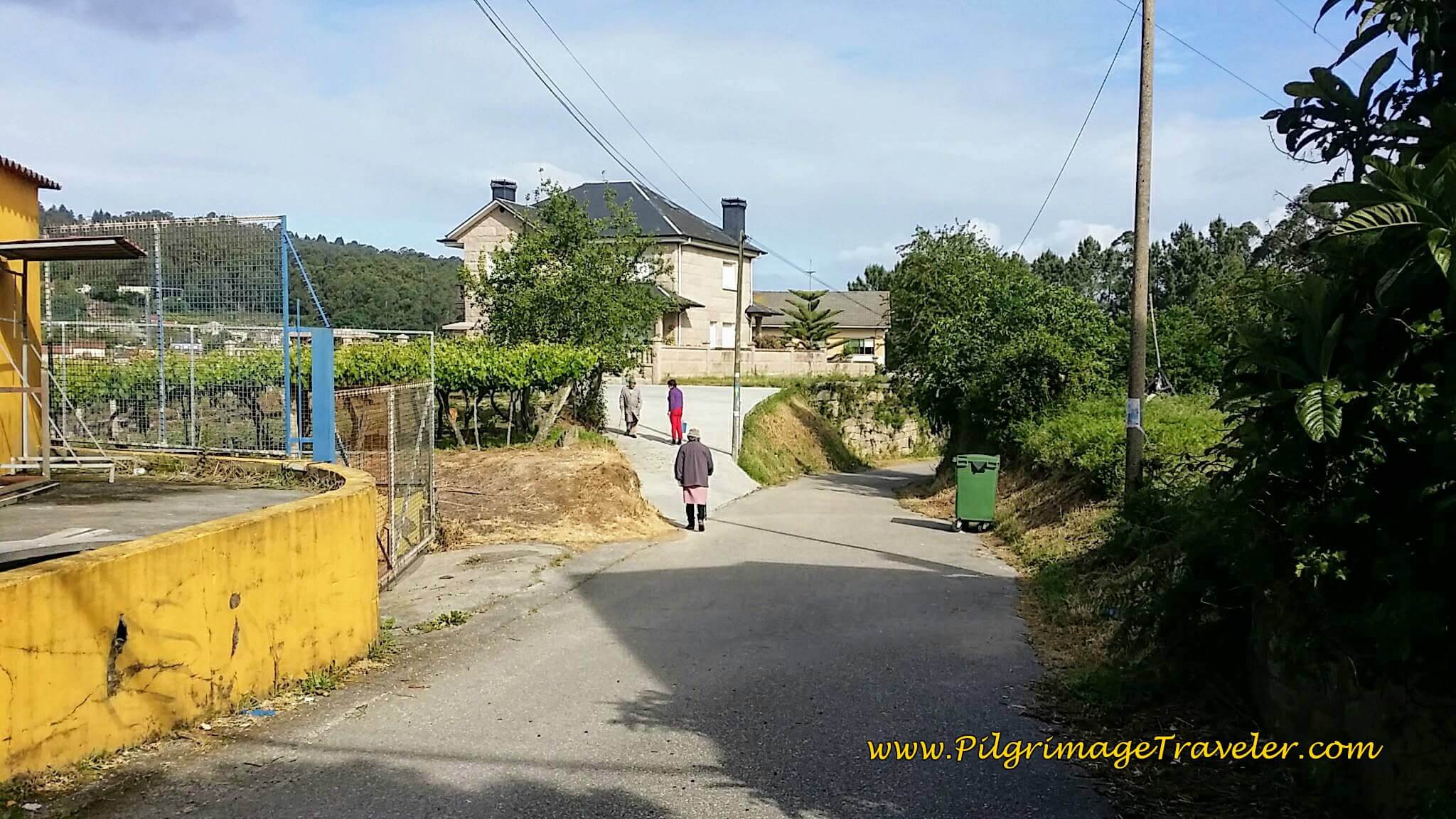 Walking Through O Alcouce
Walking Through O AlcouceContinue walking about another 3/4 kilometer on the EP-0001. It is a narrow paved road that turns to dirt shortly after town. Turn right onto yet another rural paved road.
Walk along this road for about 1.2 kilometers, entering the town of O Pobo, shown below, passing the eye-catching sign for the Bar Casa Fermín.
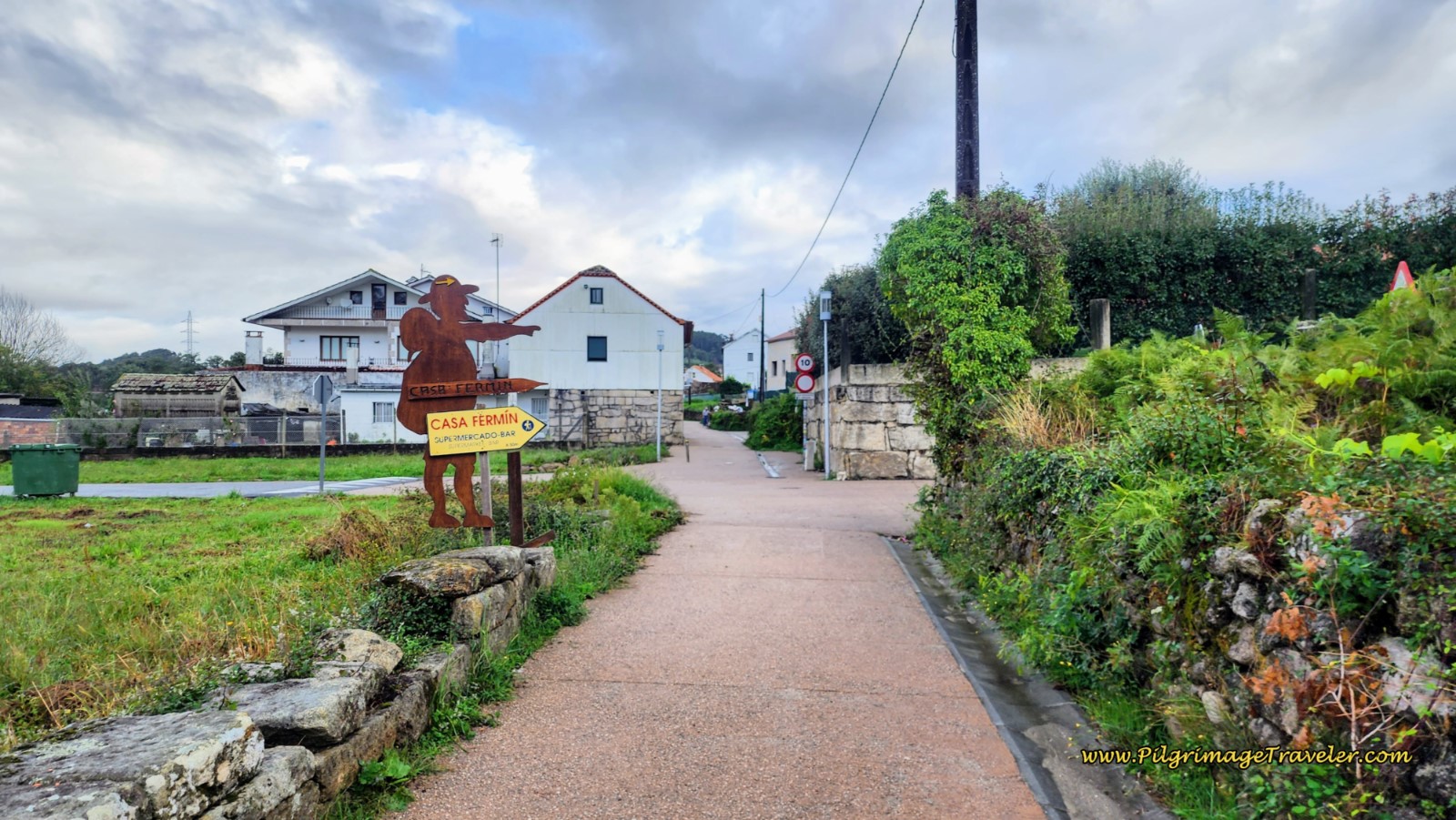 Entering O Pobo
Entering O PoboYou will pass by the 72 kilometer waymark in this area and come to this 1617 CE country church, the Capela de Santa Marta, shown next. You have reached approximately 14.8 kilometers at this church landmark. You can get a stamp here if the church is open, which it was for us.
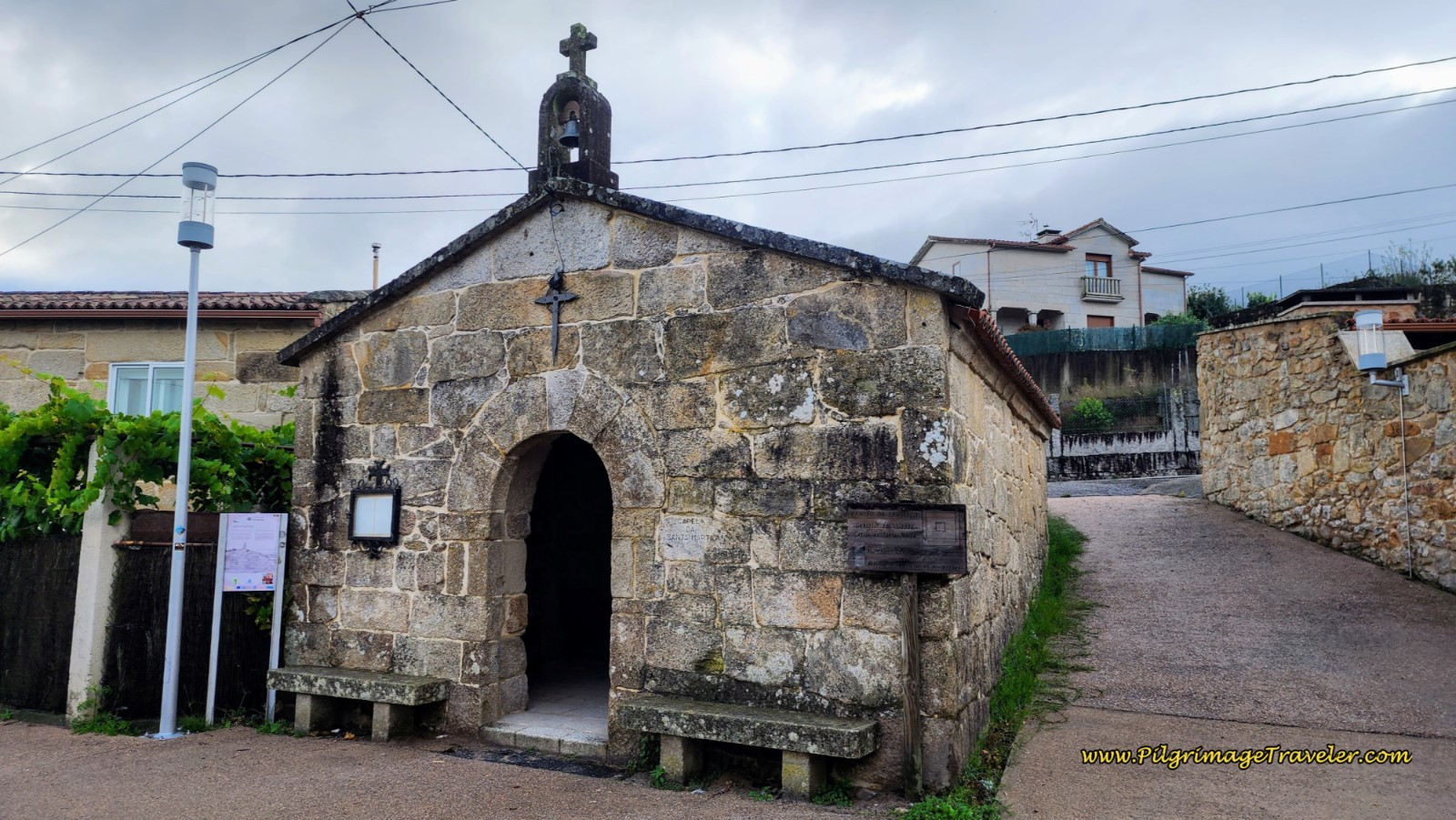 Capela de Santa Marta
Capela de Santa MartaRight beyond the Capela the road intersects with the EP-0002 and the pilgrimage traveler turns left onto it for only 250 meters in O Pobo.
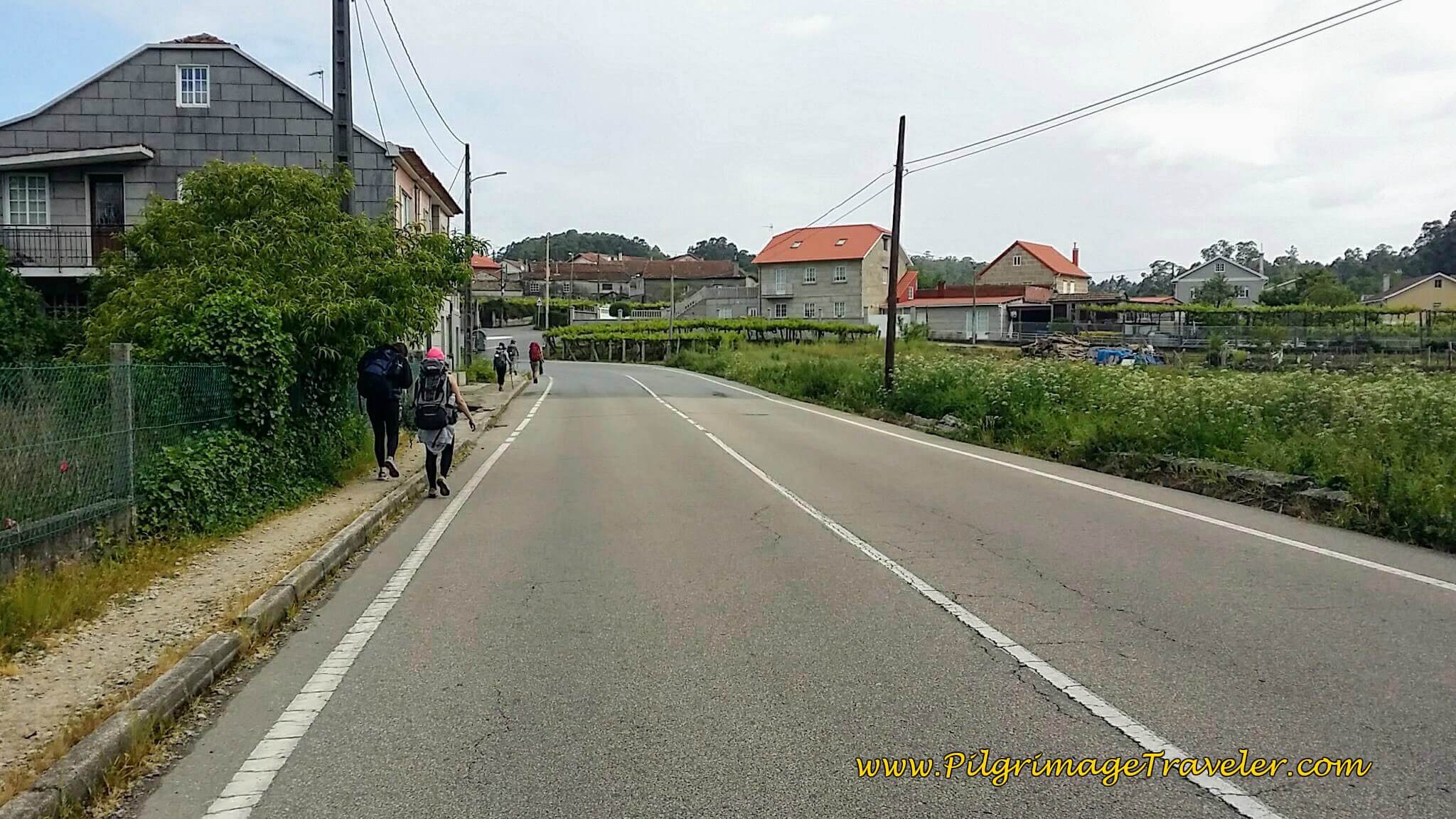 Walking Through O Pobo on Day Twenty-Two, Camino Portugués
Walking Through O Pobo on Day Twenty-Two, Camino PortuguésAfter walking the 250 meters, you will come to an intersection, after 15 kilometers total, where you will have to make a choice. The official way is to the right, and the Camino Complementario is to the left.
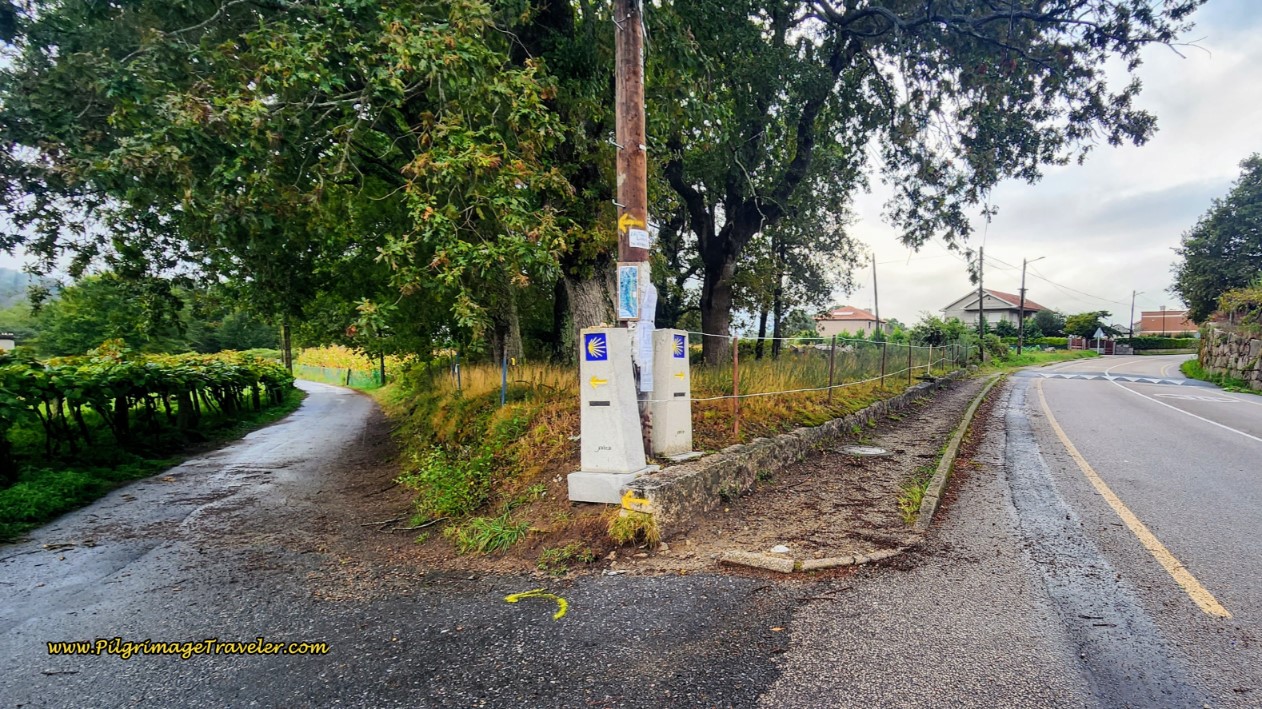 Decision Point in O Pobo
Decision Point in O PoboJump to Camino Portugués Stages
The Camino Complementario Along the Río Tomeza
If you go to the left on the Camino Complementario, beginning on a side road, in another 150 meters you will pick up an amazing trail system, by turning to the left after 15.2 kilometers total, shown below. This is a lovely, but slightly longer by 1/2 kilometer, optional diversion that follows the Río Tomeza through the south suburbs of Pontevedra for about 3.2 kilometers.
If it's been raining you would want to think twice about walking on this diversion, unless you like mud baths. In the case of heavy rain, stay to the right at the intersection and continue to walk north on the highway, the EP-0002, for about 2 kilometers, to the south end of Pontevedra, described farther below.
This trail system walks you on a long, comfortably flat stretch. You barely know that you are approaching a major metropolitan area. We met and chatted with many peregrinos along this trail. There were equally many local Spaniards out and about here as well.
After about 2.8 kilometers on the trail you come to an overpass, below, where you cross under the roadway. This bridge is full of wonderful painted murals.
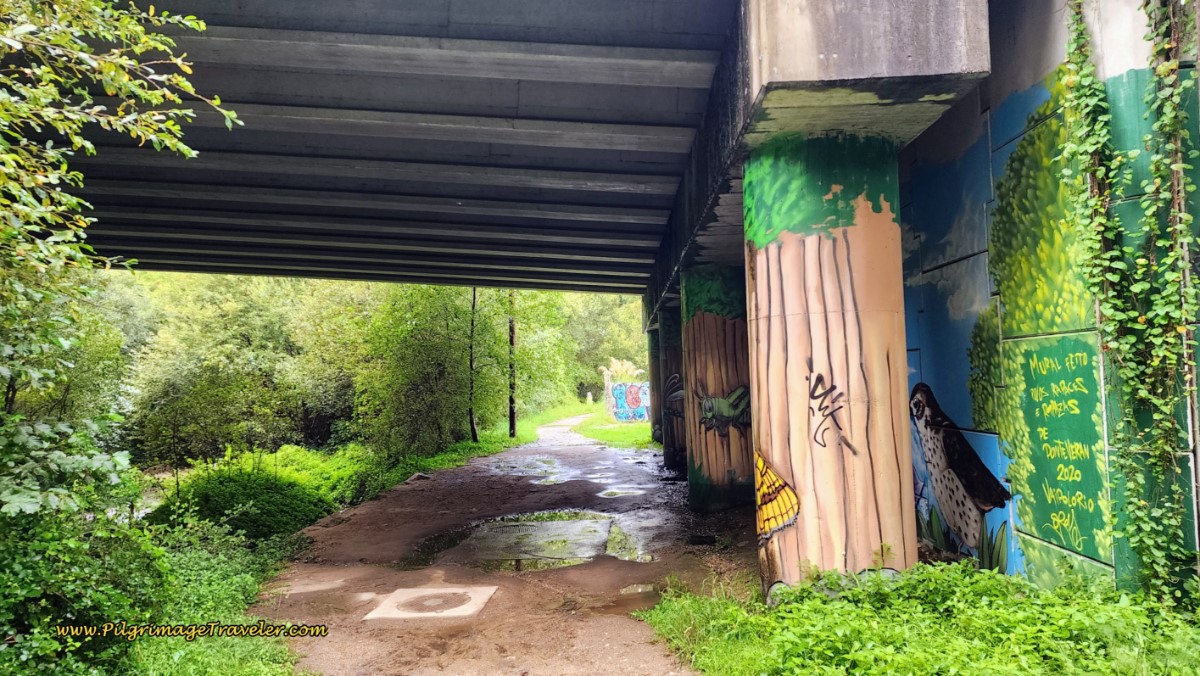 Walk Under PO-542 Overpass
Walk Under PO-542 OverpassYou have only about 300 meters of trail system left! But first, cross this lovely little footbridge, by another street art exhibit called the “Peregrino y Catedral.”
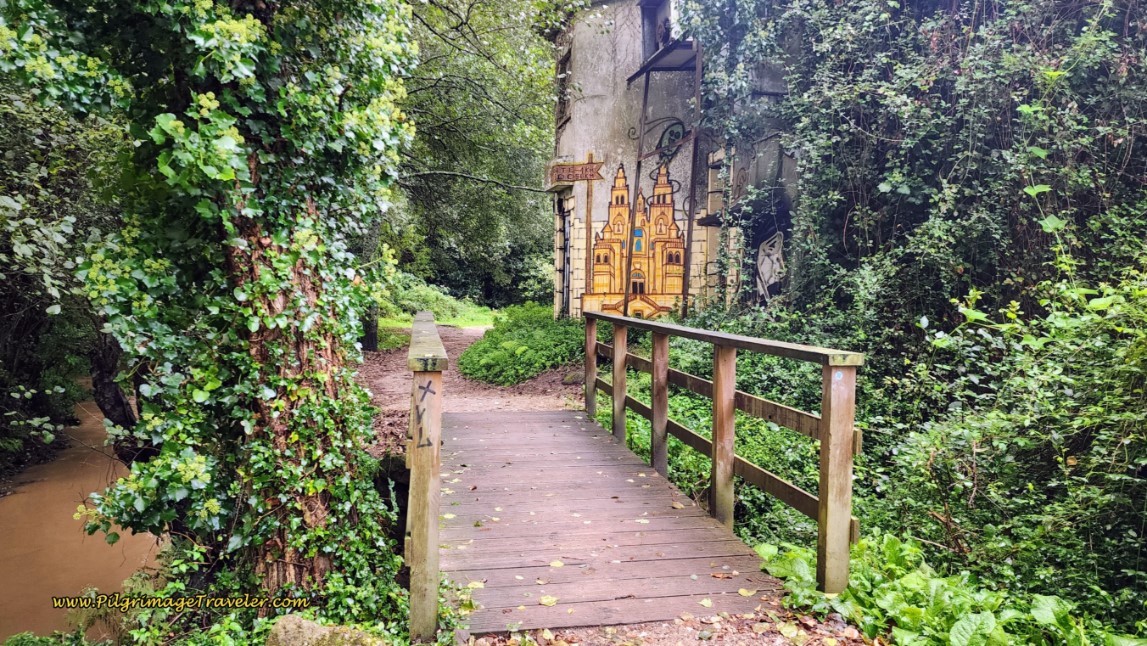 Footbridge and the “Peregrino y Catedral”
Footbridge and the “Peregrino y Catedral”A few meters later, pass under the railroad overpass, on an extremely narrow concrete ledge. Yikes! Don’t look left!
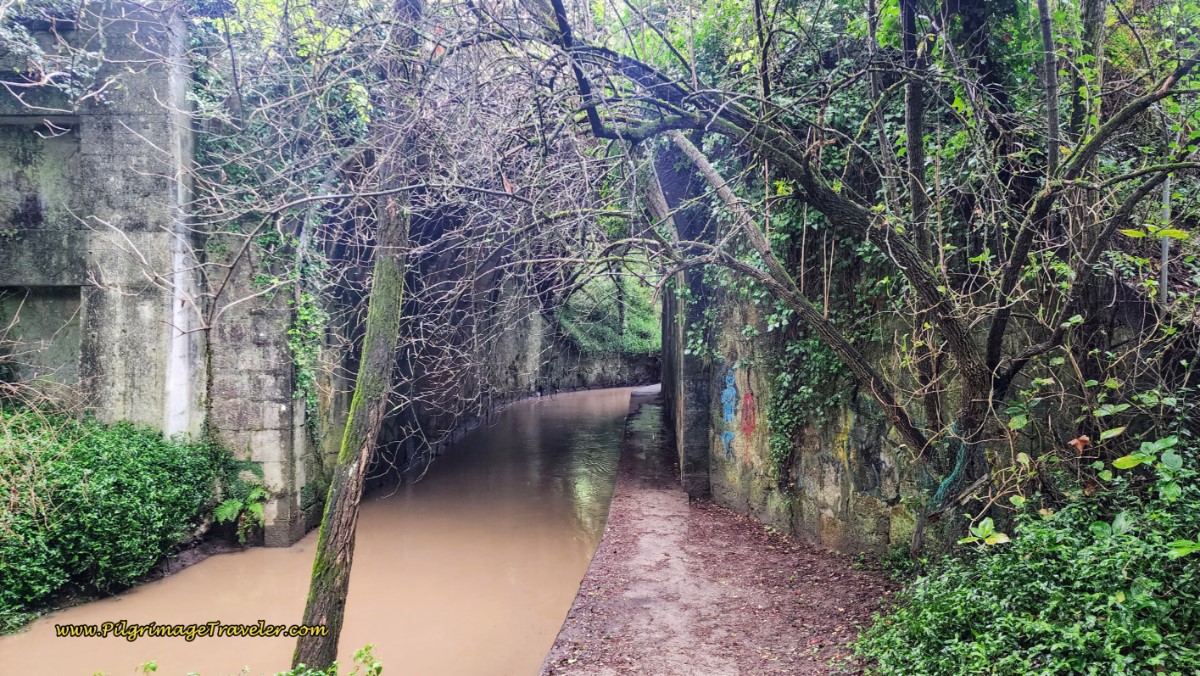 Walk Under Railroad Overpass on Ledge
Walk Under Railroad Overpass on LedgeAnd then, the trail suddenly ends and comes out onto the Rúa de Ramón Otero Pedraio. This is where the Camino Complementario ends and joins the highway route
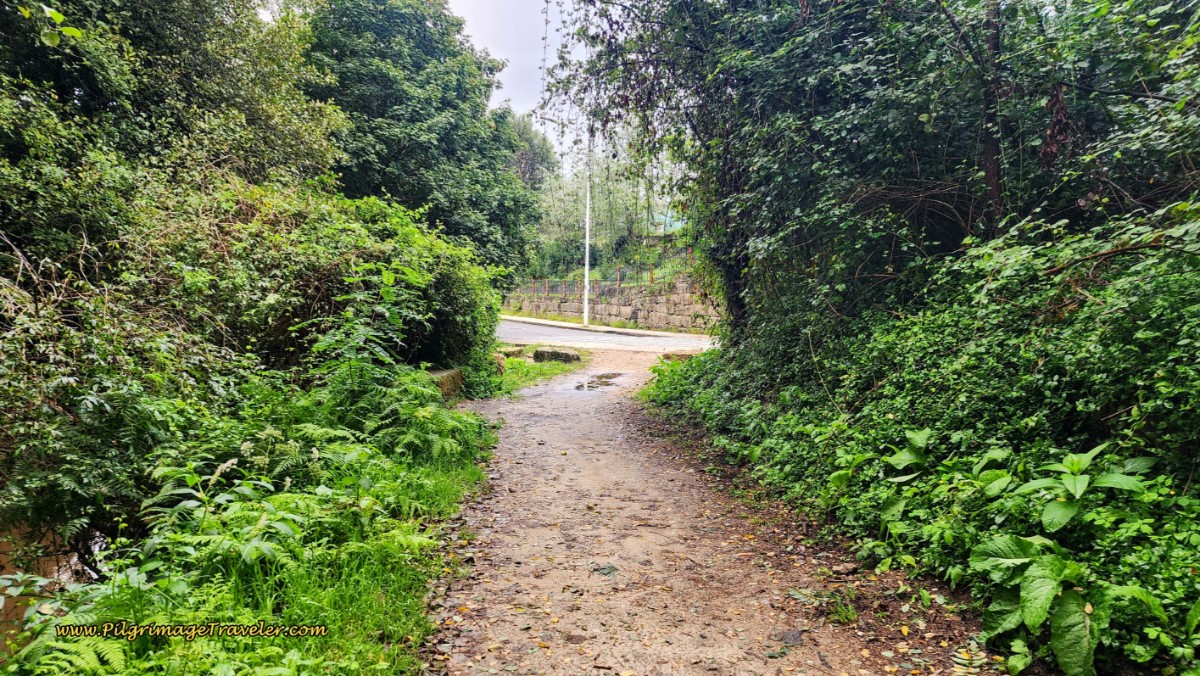 Camino Complementario Ends
Camino Complementario EndsJump to Camino Portugués Stages
The Official Camino Along the EP-0002
While I clearly recommend the Camino Complementario, you will have a shorter walk on the official way if that is more important to you, due to weather conditions or time constraints. In addition, there is the most unique of all the hórreos I have ever seen! Scroll down to see it! Otherwise, it is a slog on the highway, and in my opinion, less enjoyable.
Continue straight at the decision point, walking north along the EP-0002, below. You can see there is a small shoulder area to walk upon, and I never felt unsafe.
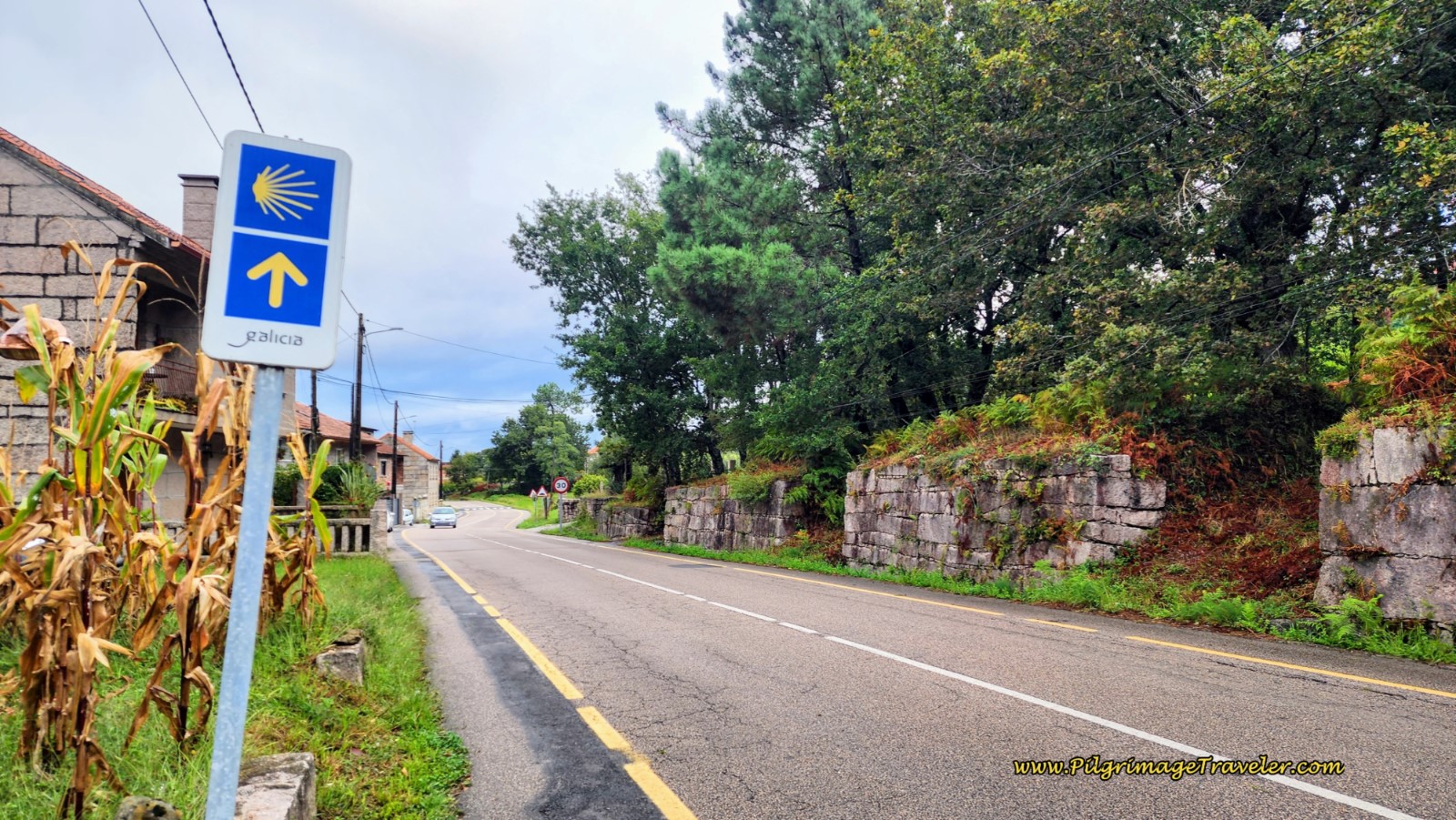 Along the EP-0002 Towards Pontevedra
Along the EP-0002 Towards PontevedraAfter a bit more than one kilometer along the road, come to this chapel-shaped hórreo. It was a gorgeous one and definitely unique!
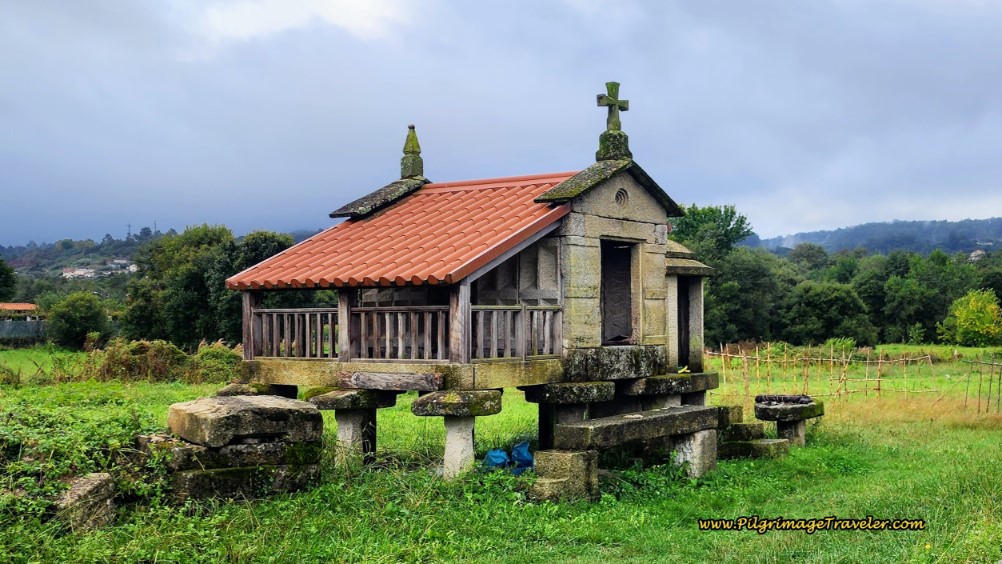 Unique Chapel Shaped Hórreo
Unique Chapel Shaped HórreoAbout another 1/2 kilometer onward, you will pass the Bar Chincho II on your left, if you need a pitstop. But the outskirts of Pontevedra are only about another 1/2 kilometer away.
After the additional 1/2 kilometer, you pass the Bar Taperia Casa Pepe just before a large roundabout, below and after 2.22 kilometers from the decision point.
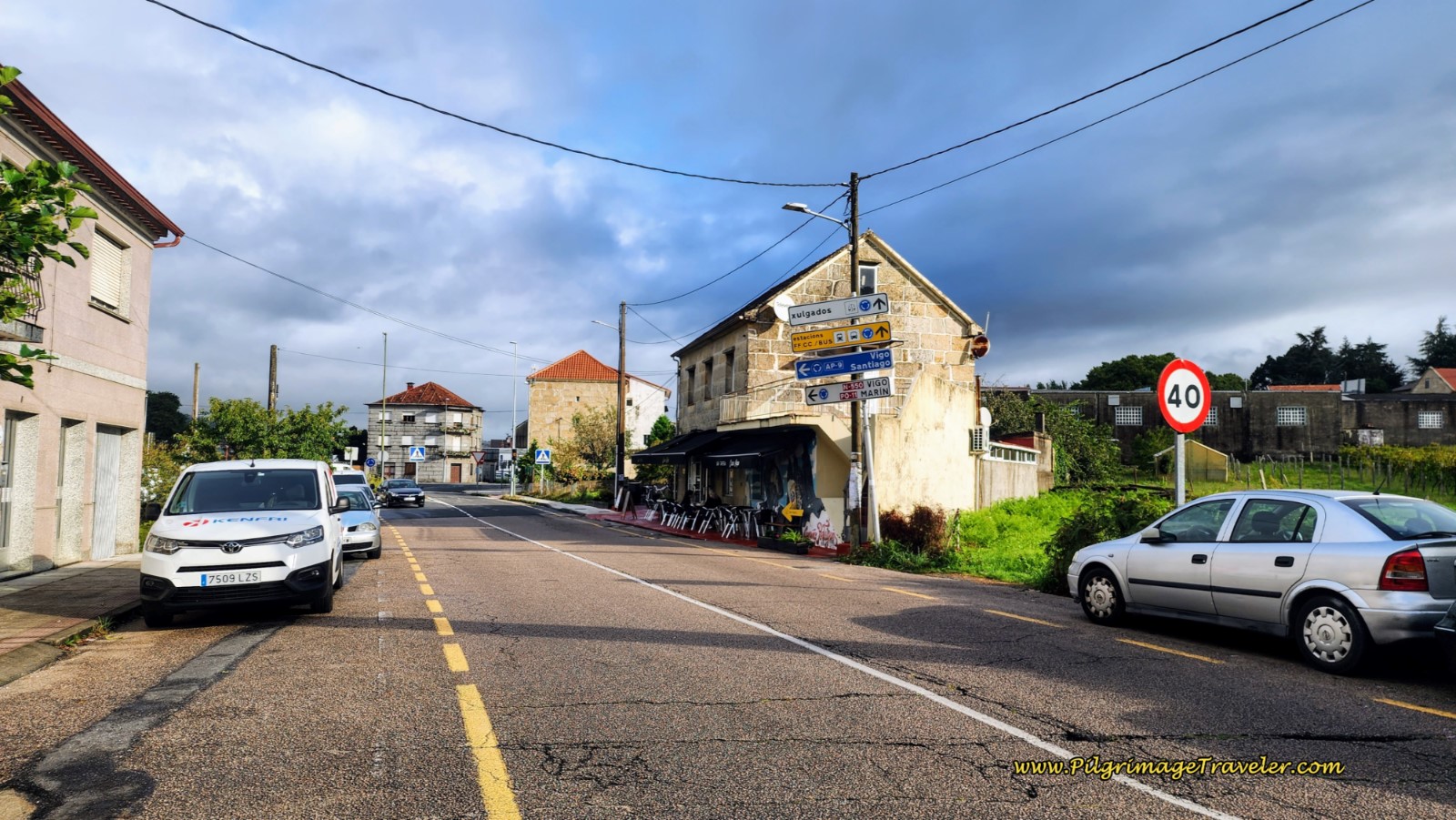 Entering Pontevedra at the Bar Taperia Casa Pepe
Entering Pontevedra at the Bar Taperia Casa PepeNext to the bar is the first private Albergue O Marco (+34 658 50 79 72). In addition to the unique hórreo, these facilities are the reason to take this way. Walking on the Avenida northward, after 200 meters, turn left onto the Rúa de Ramón Otero Pedraio.
Walk under the train tracks and the street bends to the north to walk into Pontevedra proper. At this bend is where the Camino Complementario trail system joins the official route.
Continuing on the Avenida northward, after 200 meters, turn left onto the Rúa de Ramón Otero Pedraio.
As you walk up the hill, watch out for the sign for the Albergue Virxe Peregrina, if you plan to stay here. You do not actually walk by the albergue, because of a high wall that is separating you from the albergue on your right. It may be easy to miss the sign, where the wall has a break and you double back to find it on a side road.
Across from the municipal albergue is the private Hostal Peregrino yet another option.
We chose to stay closer to town since we wanted a nicer place! We walked on past the albergue, and for a total of about 400 meters until we came to a roundabout at the train station in Pontevedra.
We turned left at the large pointed bronze statue and onto the Rúa do Gorgullón.
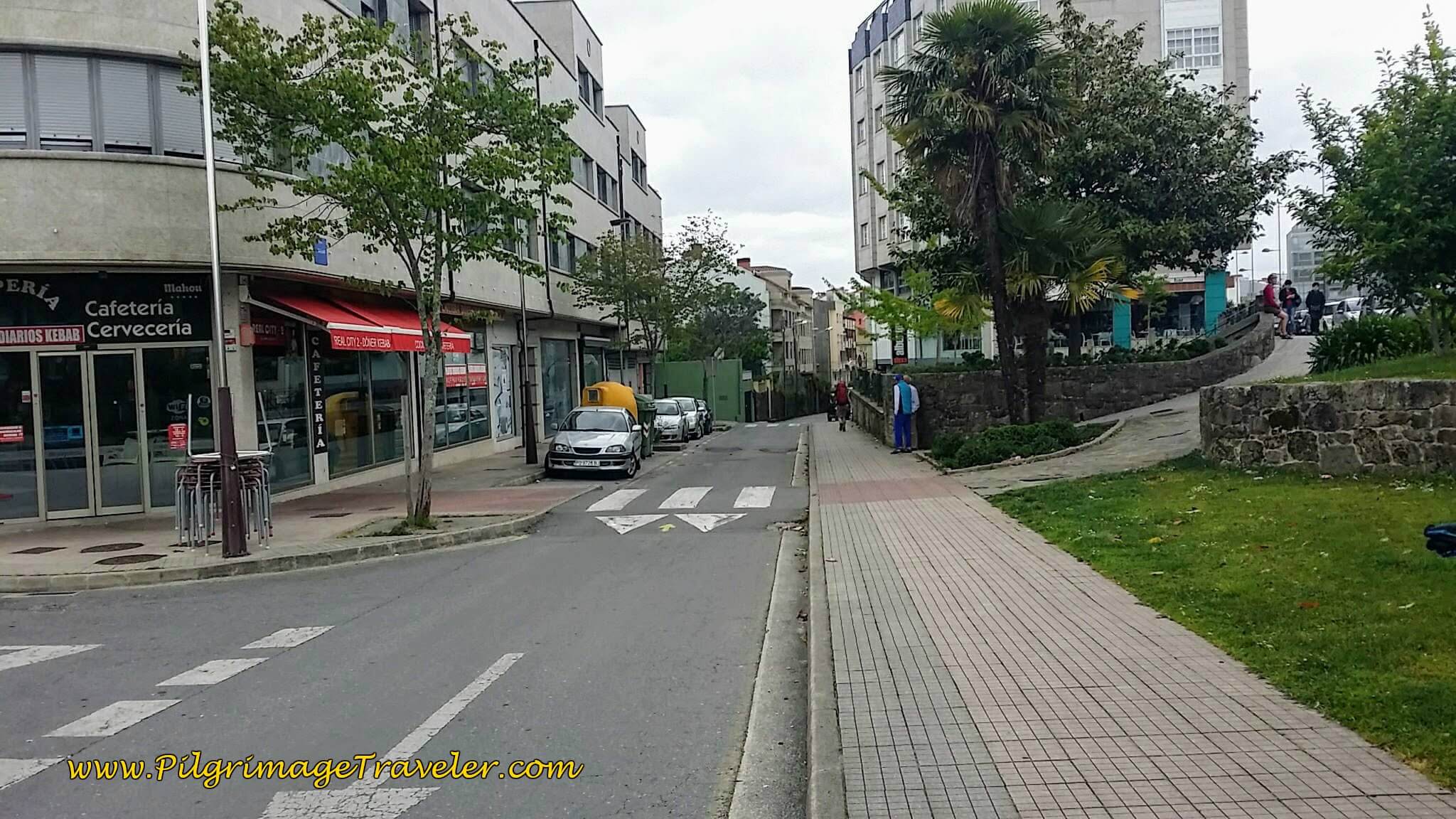 Walking Into Pontevedra on the Rúa do Gorgullón, Just West of Train Station
Walking Into Pontevedra on the Rúa do Gorgullón, Just West of Train StationWe walked by two more albergues, the Albergue Aloxa and the Albergue GBD Hostel on the way to the center of town. In about another 500 meters, come to the dpaso Urban Hostel and the Nacama Hostel.
Continue on the Rúa do Gorgullón for a total of 0.66 km. You will see many hotels along this street. You are not yet in the center of town.
Come to another roundabout and turn left and walk a few meters, turning right almost immediately onto a quiet side street, the Rúa da Virxe do Camiño. Walk about another 300 meters.
Come to a T-intersection with the Rúa Sagasta, jog a few meters to the left, then take an immediate right onto the Rúa Peregrina. In less than 100 meters, when the road bends around and you come to a nice walking plaza by the fountain, A Fonte Dos Nenos, walk straight onto this lovely walking street, shown below.
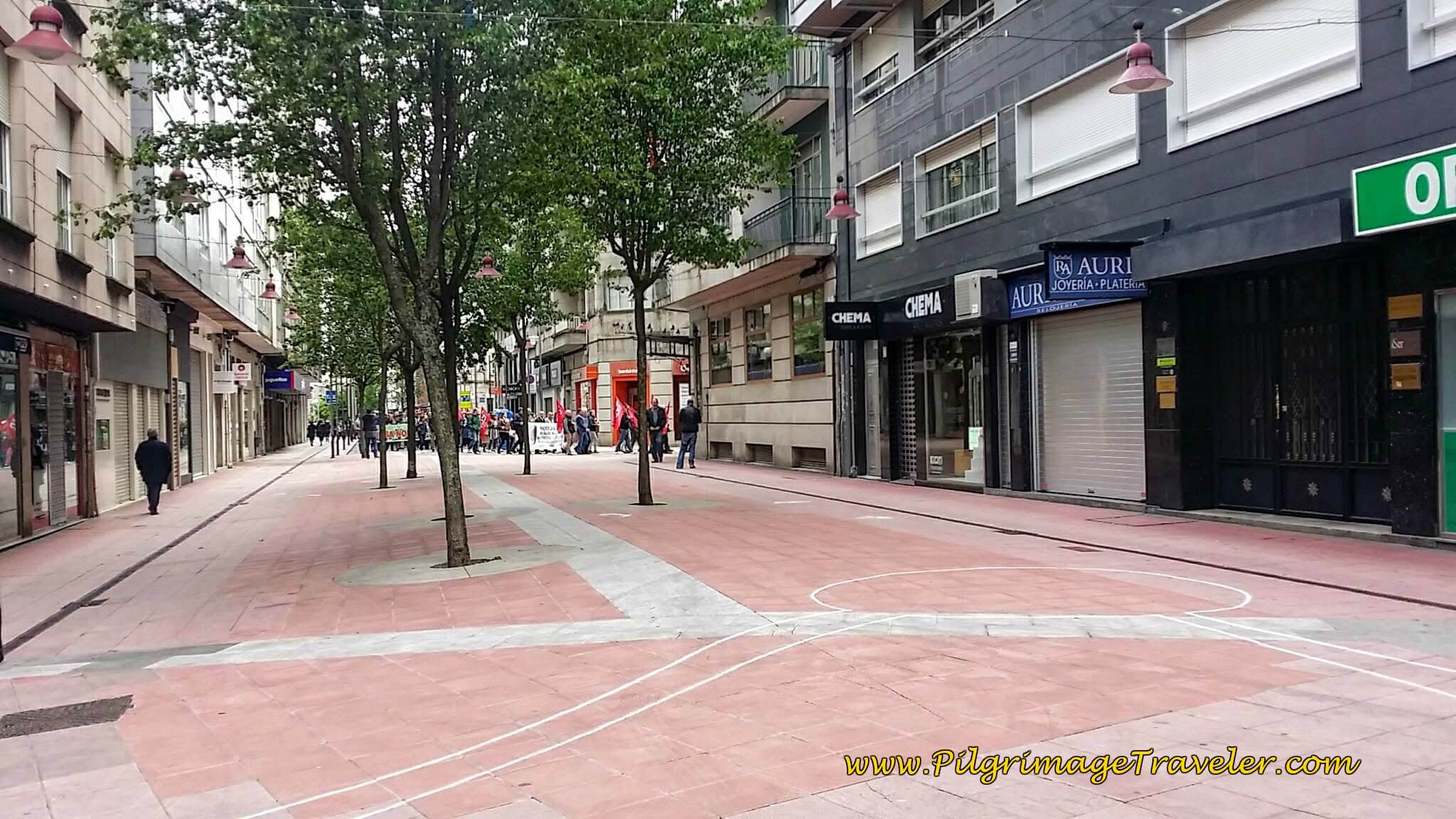 Rúa Peregrina Walking Street Into Pontevedra
Rúa Peregrina Walking Street Into PontevedraThere are many yellow arrows and blue shell waymarks and signs along the streets to guide you through Pontevedra, so it is difficult to get lost. This is the Rúa Peregrina or the Pilgrim Street - how great a name is that?
Following the red Peregrina Street, at the first roundabout, after about one hundred meters, if you turn left, you will encounter the Bulezen Urban Hostal in a few more steps. We have stayed in this dormitory and it is quite nice with individual cubbies with curtains.
Back at the roundabout, continue straight on the now gray paved walking Peregrina Street for another 100 meters until you come to the lovely Praza da Peregrina, and the most amazing pilgrim's chapel, the Capela da Virxe Peregrina de Pontevedra. This chapel is a must see. It was built in 1778 CE in the Baroque Style.
Even if you are not staying in Pontevedra, plan on taking a break for at least an hour or so to see this place built just for peregrinos!
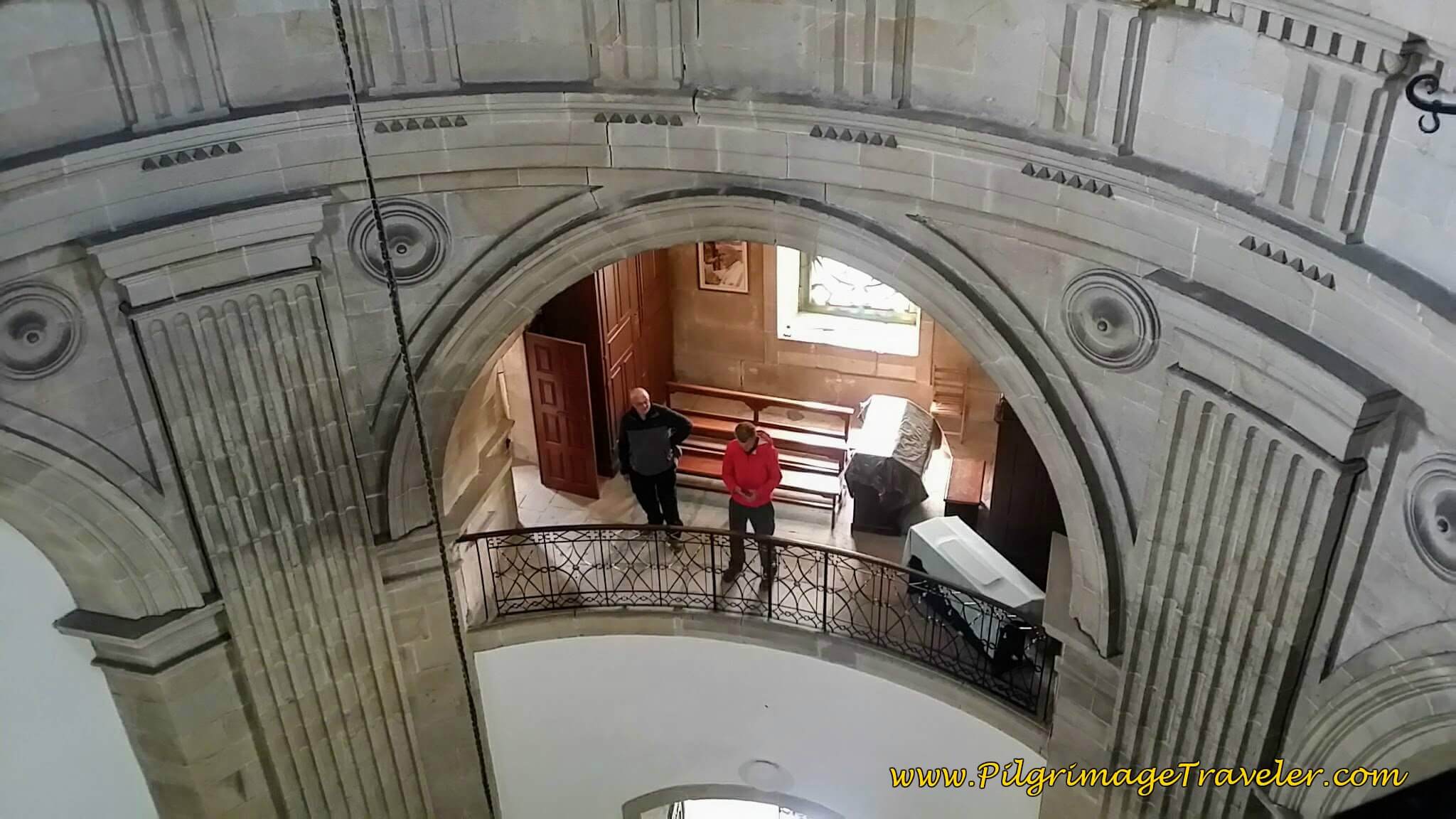 Steve and Rich in the Upper Level of the Chapel
Steve and Rich in the Upper Level of the ChapelThe streets were becoming increasingly crowded as we neared the central plaza and it was clear there was a big event happening here on the Praza da Ferrería. The festivities were about May 1st, the Spanish Labor Day holiday and a tree-judging contest. Interesting.
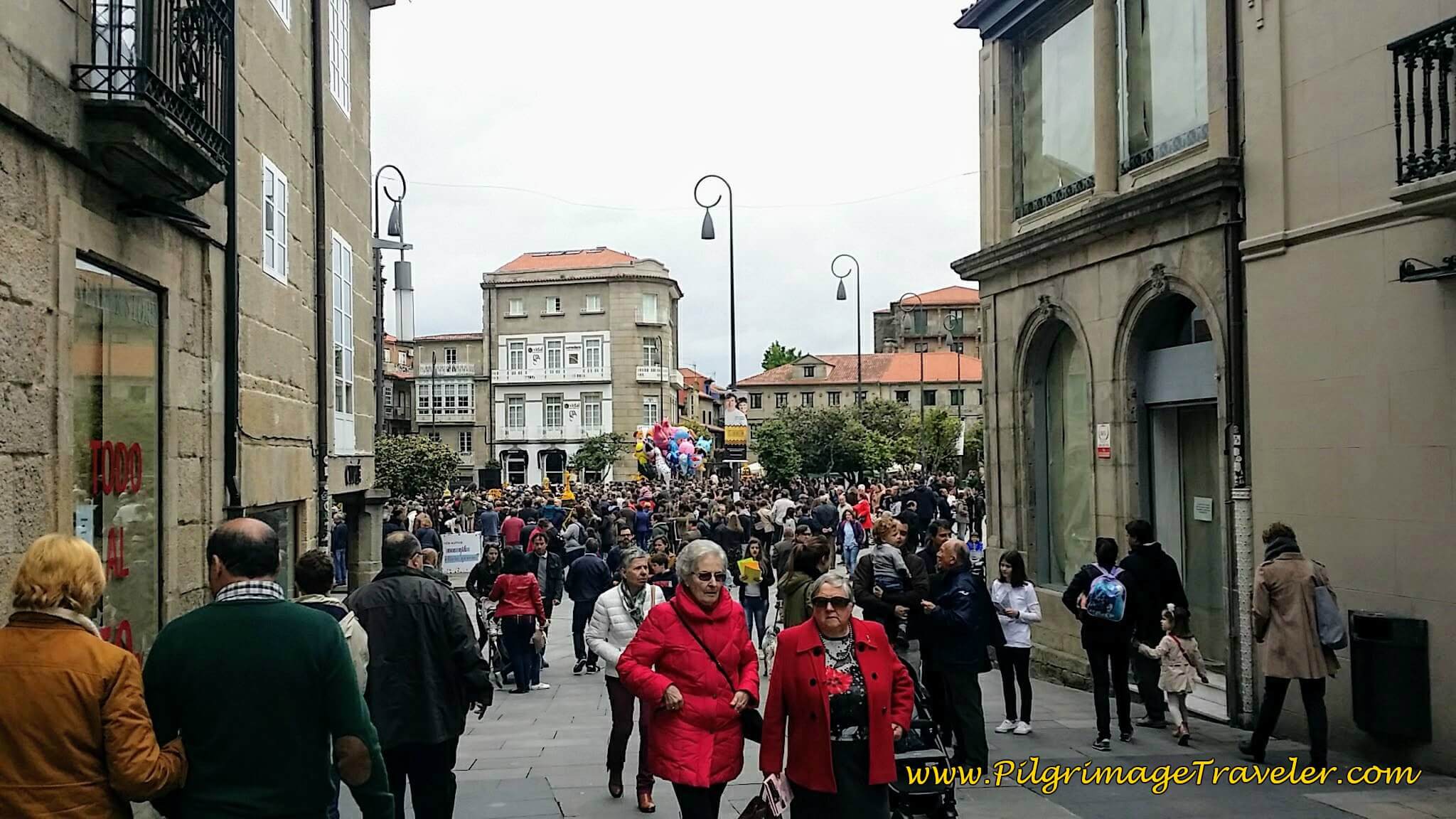 Big Event in the Praza da Ferrería on our Day Twenty-Two of the Camino Portugués
Big Event in the Praza da Ferrería on our Day Twenty-Two of the Camino PortuguésIn order to continue onward to the main square that you can see ahead, find the small paseo for a few meters more, shown in the photo above. At the end of the paseo is a bronze shell waymark on the pavement, letting you know to turn left and into the square.
We arrived here at the square just after noon, and missed the tree judging. We ran into Steve, our British friend on the square, hanging around, watching the festivities and looking out for other pilgrims.
We found a café, just beyond the main square, along the Camino, on the Rúa dos Soportais where we had a nice lunch together.
After lunch, our next goal was to find a place to stay, since we were worried about the Labor Day holiday and finding no room at any inns.
There are many accommodations in the old section of Pontevedra. Click on the link if you want to see them on booking.com.
We walked away from the square quite far and found the Casa Maruxa open (+34 986 85 49 01), just before the start of siesta. We booked a nice room on the second floor, with a private bath for only 30 Euro. We cleaned up and yes, that is our laundry hanging out to dry in the photo below!
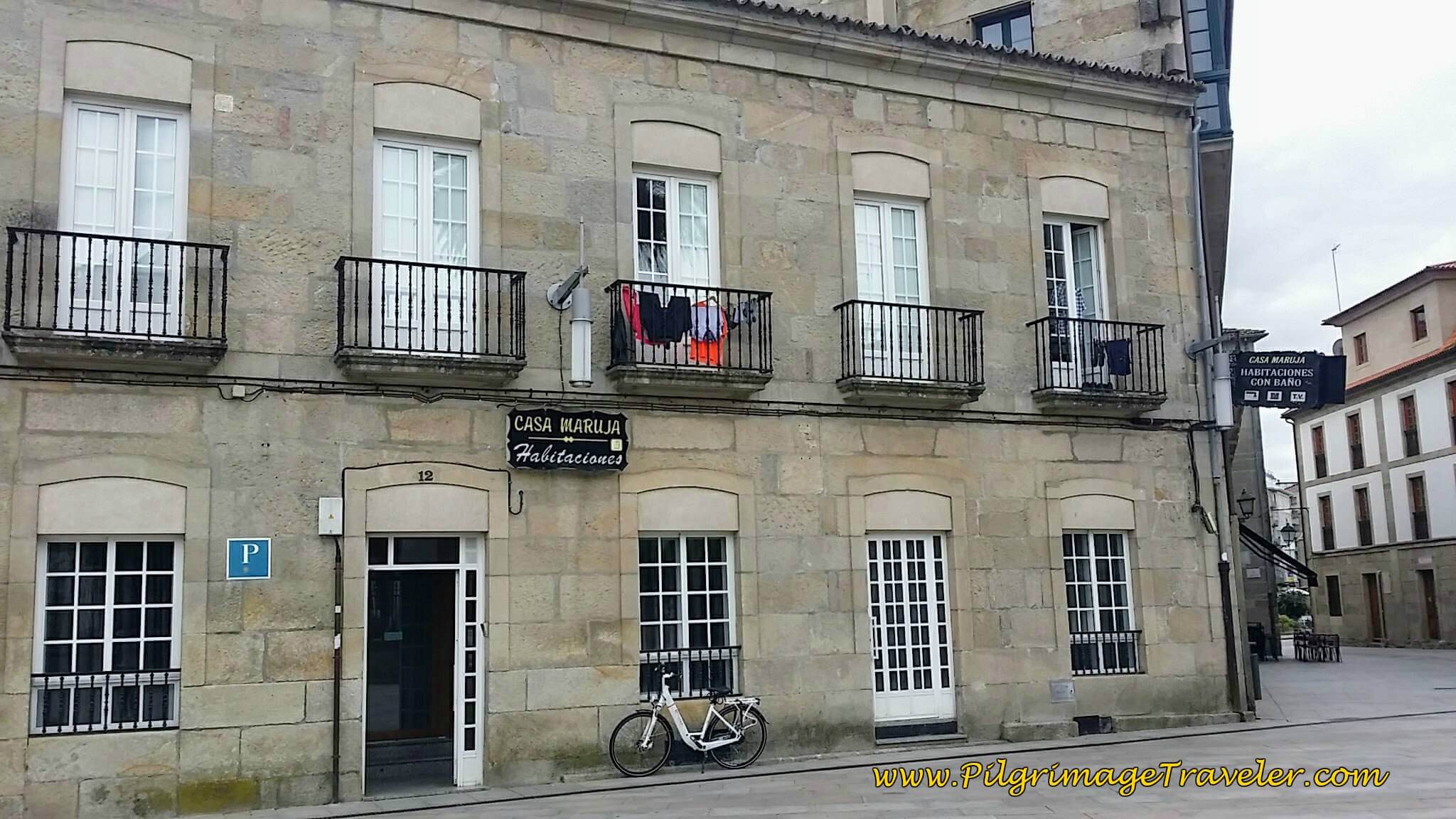 Hospedaje Casa Maruxa
Hospedaje Casa MaruxaAs we learned later from some more British pilgrims, they got the last tiny room at the Hospedaje Casa Maruxa on the 3rd floor, so the place did indeed fill up entirely, as I am sure most hotels did in the old medieval town.
We found the Casa Maruxa to be in a perfect location, close enough to the center of town, and yet far enough away to be unbothered by the party animals.
There are more inexpensive places nearby, clustered around the Basilica de Santa Maria, (see below), the Slow City Hostel, the Turoqua Hostel and the Acolá Hostel.
We explored Pontevedra and the old medieval town, with wonderful fountains, buildings and architectural features. Here is the Praza da Ferrería after all the festivities were over. Nothing is left but the stage.
We only admired the San Francisco Convent from the café across the plaza, watching all the pilgrims go by, with our friend, Steve. One by one, more pilgrims joined us for libations.
Our hotel room on the second floor was very near this Basilica de Santa Maria, built in the 15th Century in the Plateresco style. The day was as gray as the building! We were unable to go inside, since it was closed.
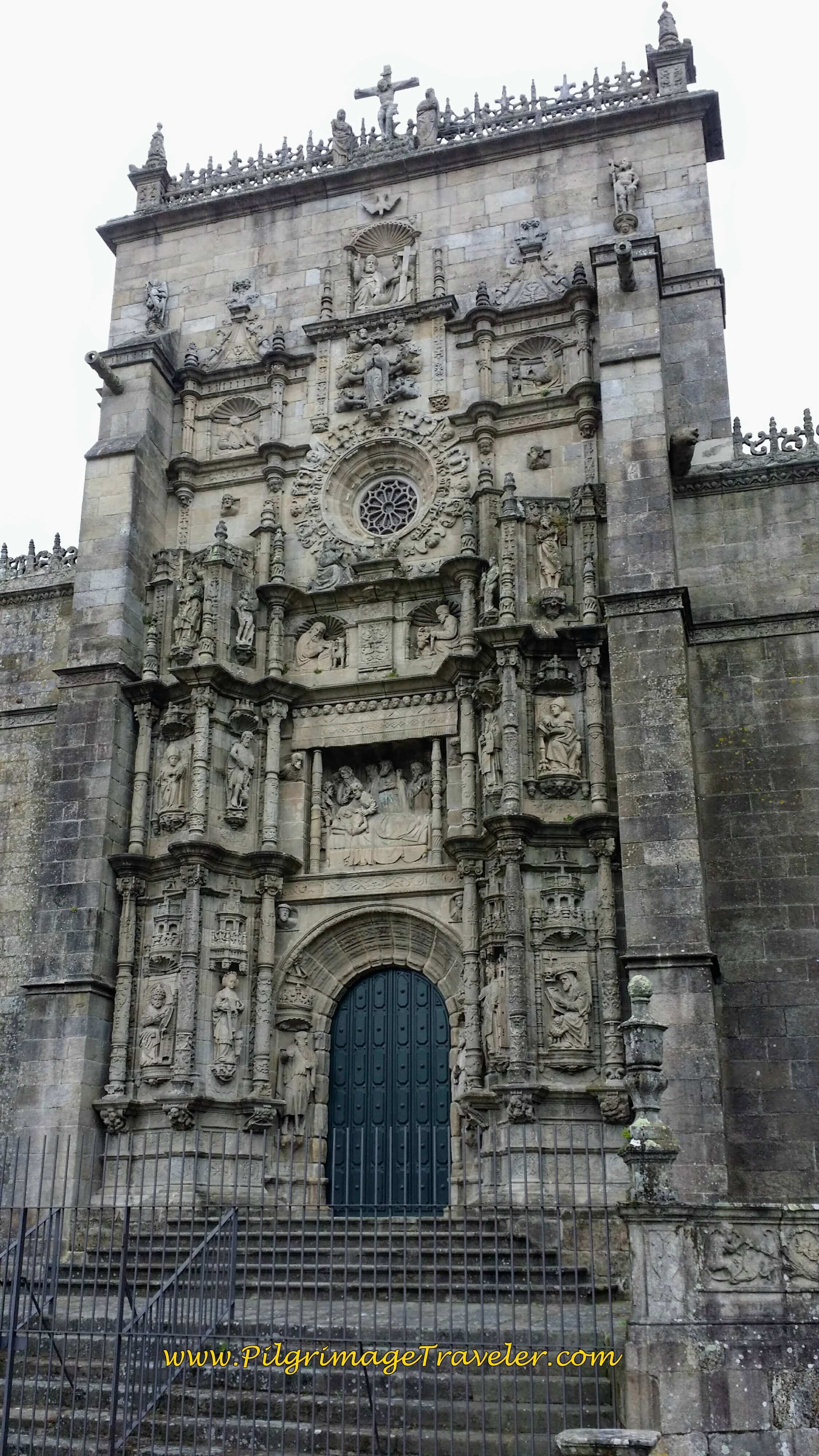 Basilica de Santa Maria
Basilica de Santa MariaWe admired the town hall, shown below, built in the 19th century in an eclectic style, on the evening of our day twenty-two of the Portuguese Camino in Pontevedra.
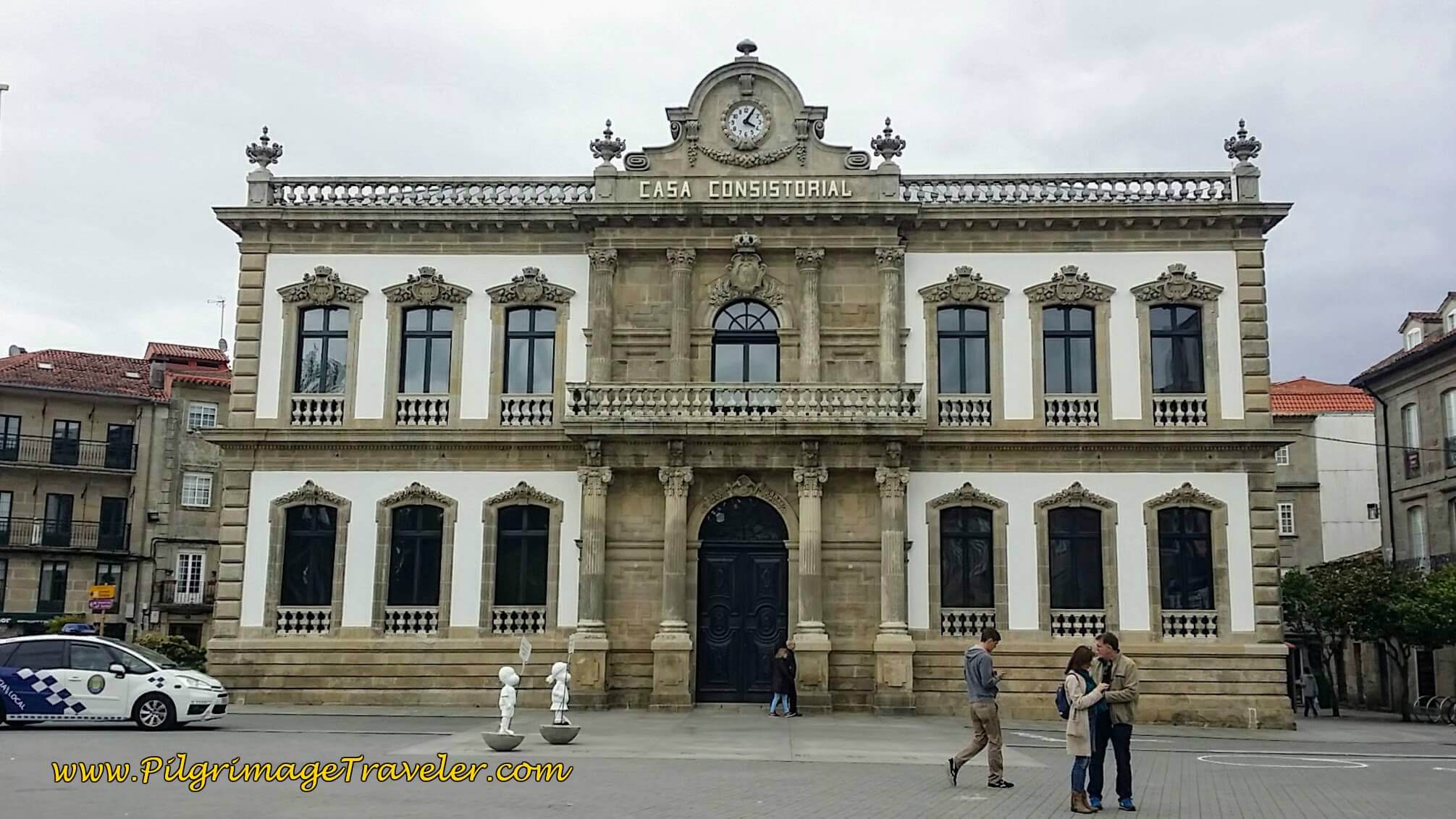 Casa Consistorial ~ Town Hall
Casa Consistorial ~ Town HallOne of the many architectural features we ran across in the medieval old town was this archway connecting the two buildings on the east side of the Praza da Leña.
Along the Rúa Don Gonzalo, is a wonderful purple house built on an archway over the street, in the old town, just north of the main square. There is a small plaza here, the Plaza de Mendez Nuñez with a bronze statue of Casto Méndez Núñez, a Spanish naval officer in the 19th century. I did not include a photo of the statue, but he is just off to the right of the photo below.
After our walkabout of the old town, we rejoined all our pilgrim friends for tapas and beer at a local taverna, the Taberna Zentola for a celebratory evening.
The frosting on our cake for day twenty-two on the Camino Portugués, was our view from our 2nd floor hotel room, of the fountain on the Praza Alonso de Fonseca with the Basilica de Santa Maria towering in the background. Ahh, the many splendors on the Portuguese Way!
Reflections on Day Twenty-Two, Camino Portugués
Our day was short and sweet, a nice break for us, surprisingly rural and off-pavement for a walk toward a major city. While we considered walking farther, Pontevedra was definitely worth the half-day we spent here. The medieval old town is charming and full of delightful surprises.
We saw and connected with so many pilgrims! Some were in it for the diversion, some for the party, some for splendor, some for increased spirituality and some for better understanding of the concept of pilgrimage itself. We were about all of them!
Our incident with our hiking poles stuck with us for most of the day as we reflected and questioned the balance between taking responsibility for one's actions versus going overboard with the desire to please others.
Indeed, a balance is necessary. We reflected on both sides of the coin, agreeing that one must indeed take responsibility for what one does. We had learned that we needed to ensure we had spare rubber tips for our poles at all times to minimize our impact on another's Camino.
However, one can go overboard trying to please others, and many an undesirable memory flooded into our consciousness when we discussed this aspect of our past lives. Yet there were many times when giving into the desires of others was not beneficial to us, and when we stood firm, we suffered the consequences as serious as losing jobs.
As the quote from Paulo Coelho, above states, we can only come to the point where we must try to understand ourselves as best we can, however difficult this may be. After all, the journey is always personal and what may be best at one point in our lives may no longer serve us at the next.
While on my pilgrimage I tried not to internalize the pole incident, which is always my tendency, and Rich's too, yet I found my mind wandering back to the incident, over and over again. In fact, my annoyance and self-justification was a feeble attempt to avoid the inevitable internalization that I was a "bad" person.
Fortunately, this internalization lasted less than a day and did not cause a loss of sleep! I came to peace that it was my behavior that was less than ideal, not me, myself. I could certainly improve my behavior. All I could do in the moment was honor my pilgrimage, learn from it and improve myself going forward.
I even chuckled to myself thinking that most likely we would be the subject of some forum or blog post, illustrating how some pilgrims can be so clueless and annoying!
Salutation
May your own day twenty-two on the Camino Portugués be a place where you can honor your own journey, your pilgrimage through life, symbolized by the journey to Santiago de Compostela.
May you continually question the great mystery, "Who am I?" and "Why do I behave as I do?" May the cloud of unknowing enrich your self-discovery process!
Camino Portugués Stages
Lisbon to Porto
Senda Litoral or the Coastal Routes: Porto to Santiago
Skip to Central Route Below, for Final Days 22-25 to Santiago
Central Route: Porto to Santiago
Variante Espiritual
Please Consider Showing Your Support
Many readers contact me, Elle, to thank me for all the time and care that I have spent creating this informative website. If you have been truly blessed by my efforts, have not purchased an eBook, yet wish to contribute, I am very grateful. Thank-you!
Search This Website:
🙋♀️ Why Trust Us at the Pilgrimage Traveler?

We’re not a travel agency ~ we’re pilgrims, just like you.
We've walked Pilgrimage Routes Across Europe!
💬 We’ve:
- Gotten lost so you don’t have to. 😉
- Followed yellow arrows in the glowing sunlight, the pouring rain and by moonlight. ☀️🌧️🌙
- Slept in albergues, hostals & casa rurals. Ate and drank in cafés along the way. 🛌 😴
- Created detailed and downloadable GPS maps and eBook Guides, full of must-have information based on real pilgrimage travels. 🧭 🗺️
- Shared our complete journeys, step by step to help YOU plan your own ultimate pilgrimage and walk with your own Heart and Soul. 💙✨
Every detail is from our own experiences ~ no fluff, no AI rewrite. Just fellow pilgrims sharing the way. We add a touch of spirituality, a big dose of ❤️ and lots of wisdom from the road.
Ultreia and Safe Pilgrimage Travels, Caminante! 💫 💚 🤍
Follow Me on Pinterest:
Find the Pilgrimage Traveler on Facebook:
Like / Share this page on Facebook:
Follow Me on Instagram:
***All Banners, Amazon, Roamless and Booking.com links on this website are affiliate links. As an Amazon associate and a Booking.com associate, the Pilgrimage Traveler website will earn from qualifying purchases when you click on these links, at no cost to you. We sincerely thank-you as this is a pilgrim-supported website***
PS: Our eBook Guide books are of our own creation and we appreciate your purchase of those too!!
Shroud Yourself in Mystery, along the Via de Francesco!
Walk in the Footsteps of St. Francis, and Connect Deeply to the Saint and to Nature in the Marvelous Italian Countryside!
Need suggestions on what to pack for your next pilgrimage? Click Here or on the photo below!
Carbon fiber construction (not aluminum) in a trekking pole makes them ultra lightweight. We like the Z-Pole style from Black Diamond so we can hide our poles in our pack from potential thieves before getting to our albergue! There are many to choose from! (See more of our gear recommendations! )
Gregory BackPack - My Favorite Brand
Do not forget your quick-dry microfiber towel!
Booking.com
My absolute favorite book on how to be a pilgrim:

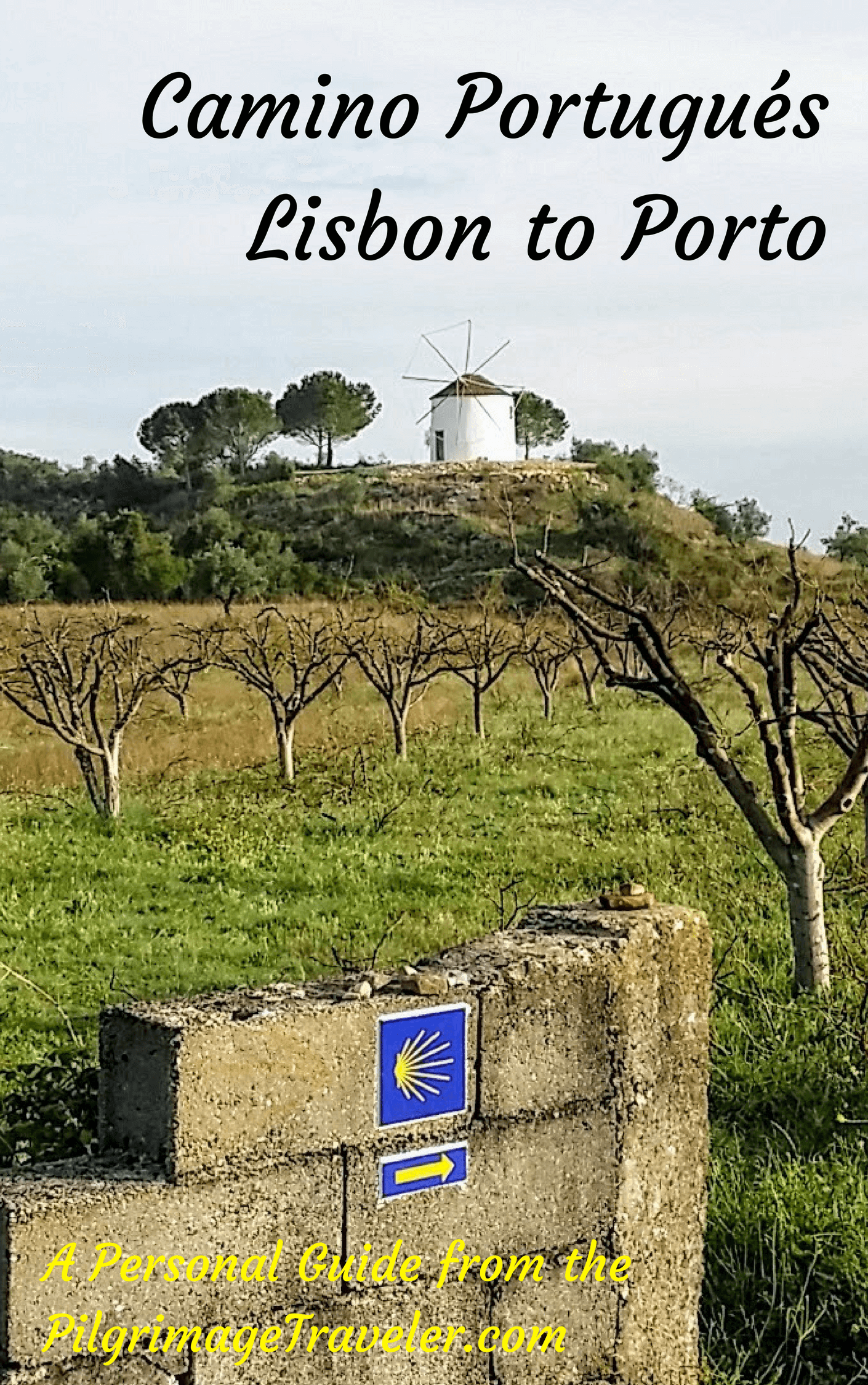
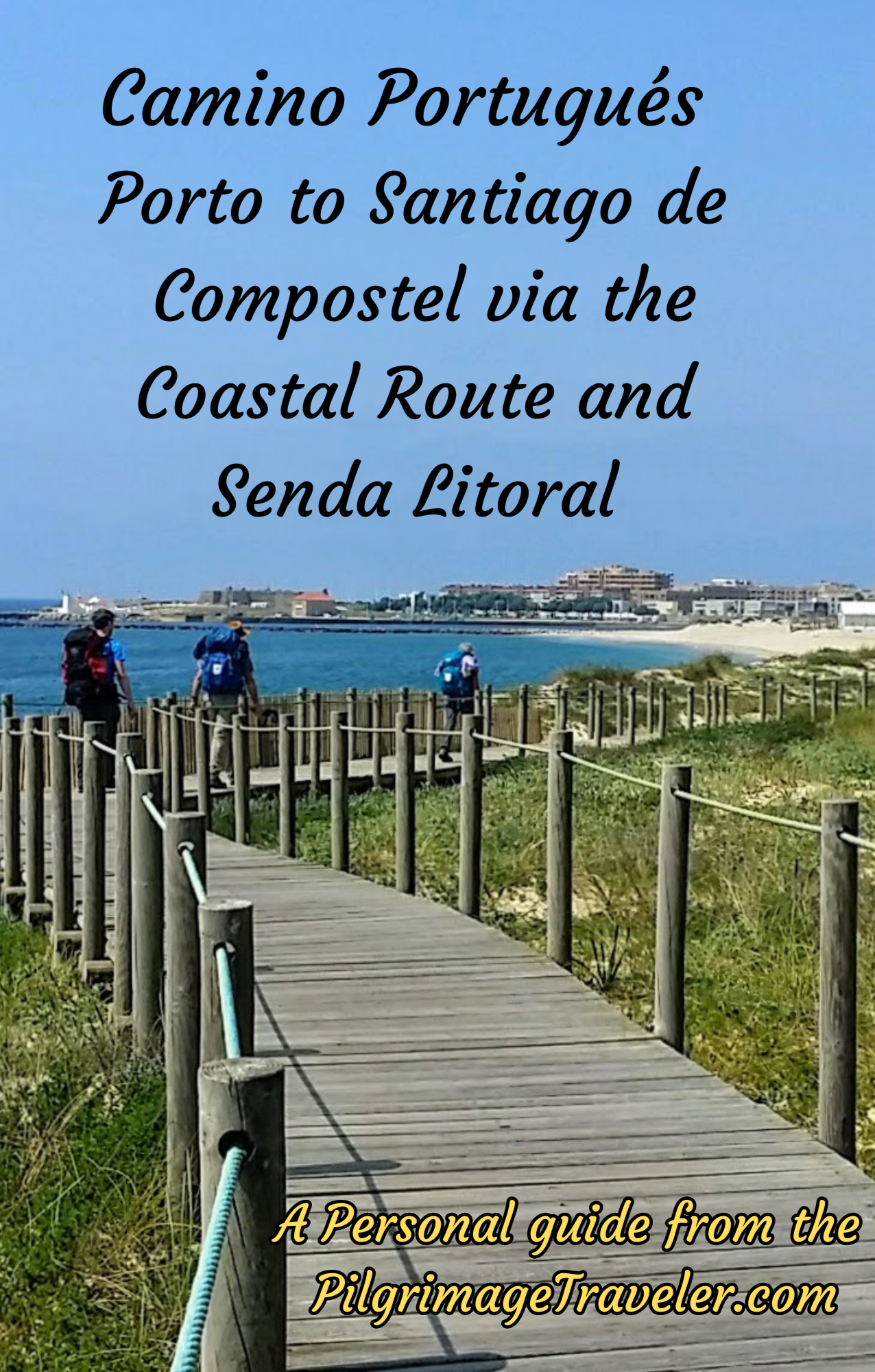
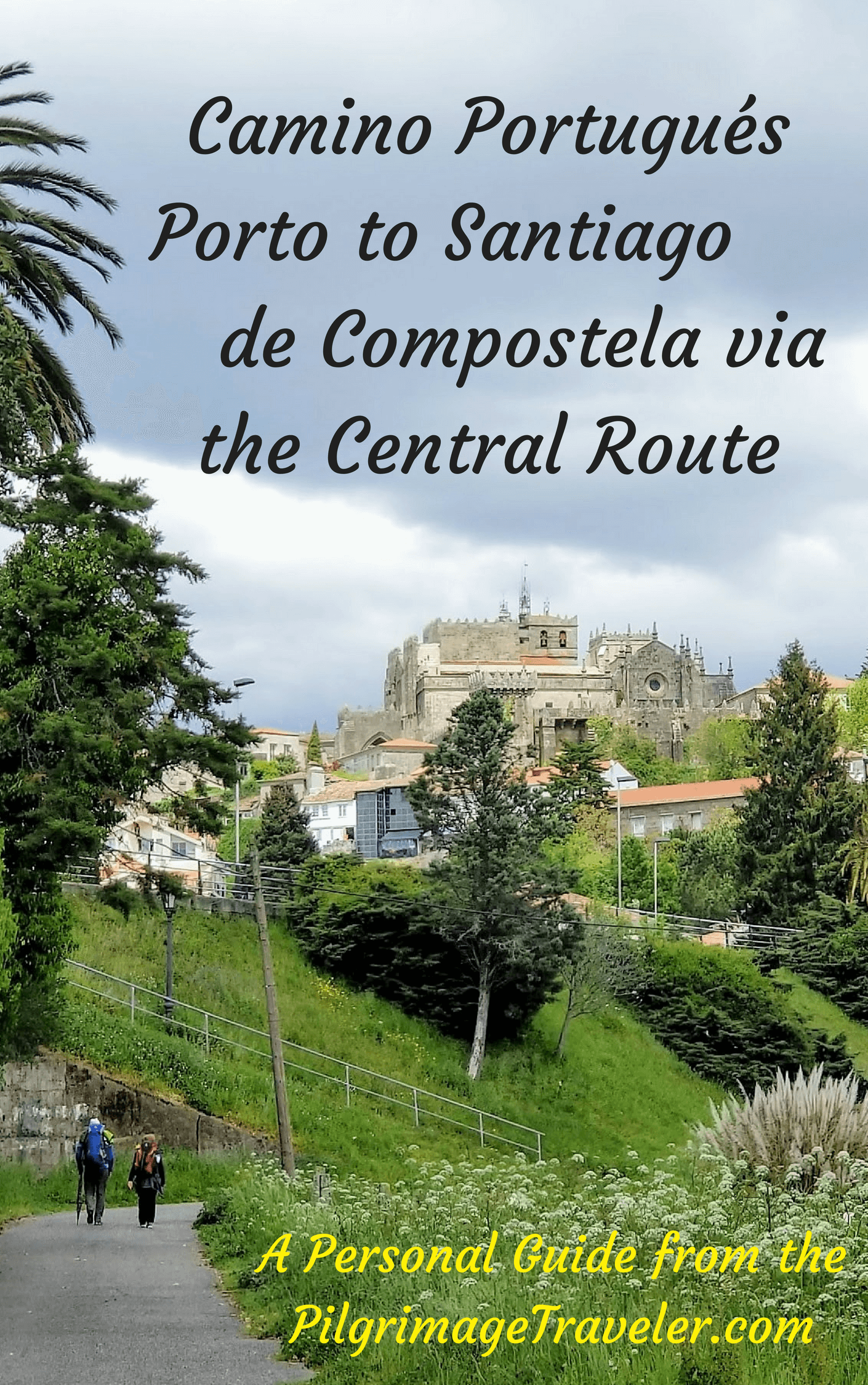
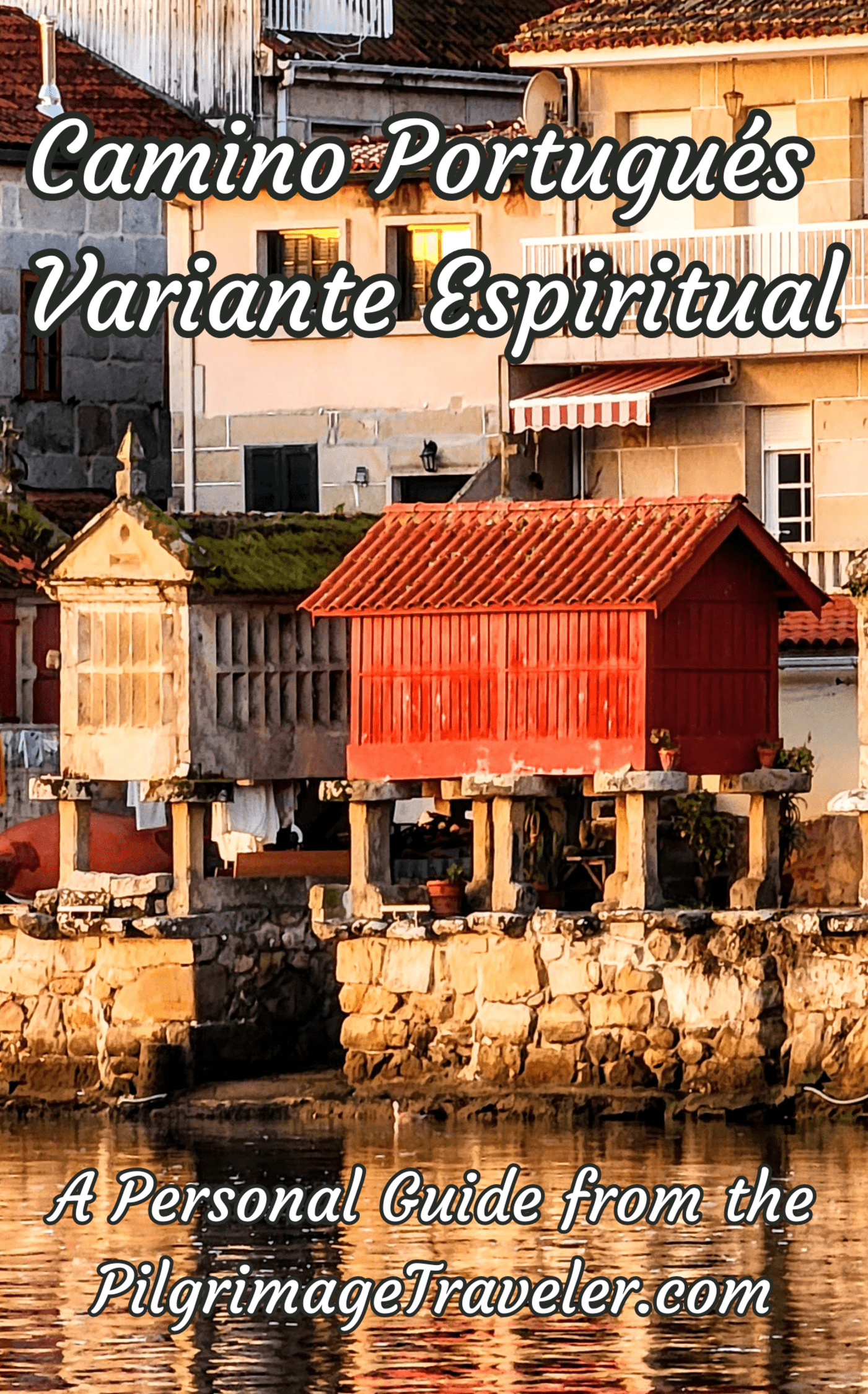
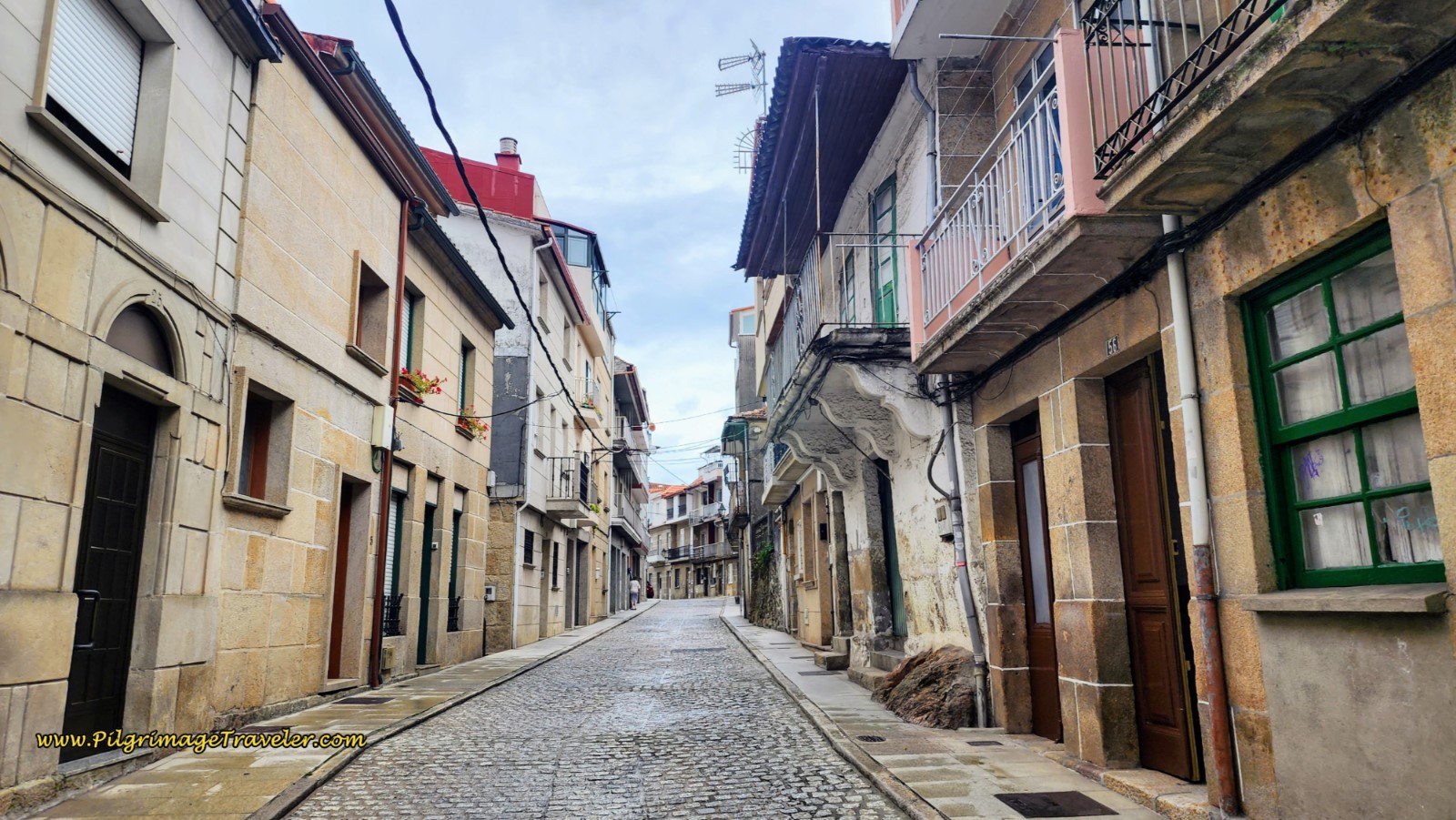
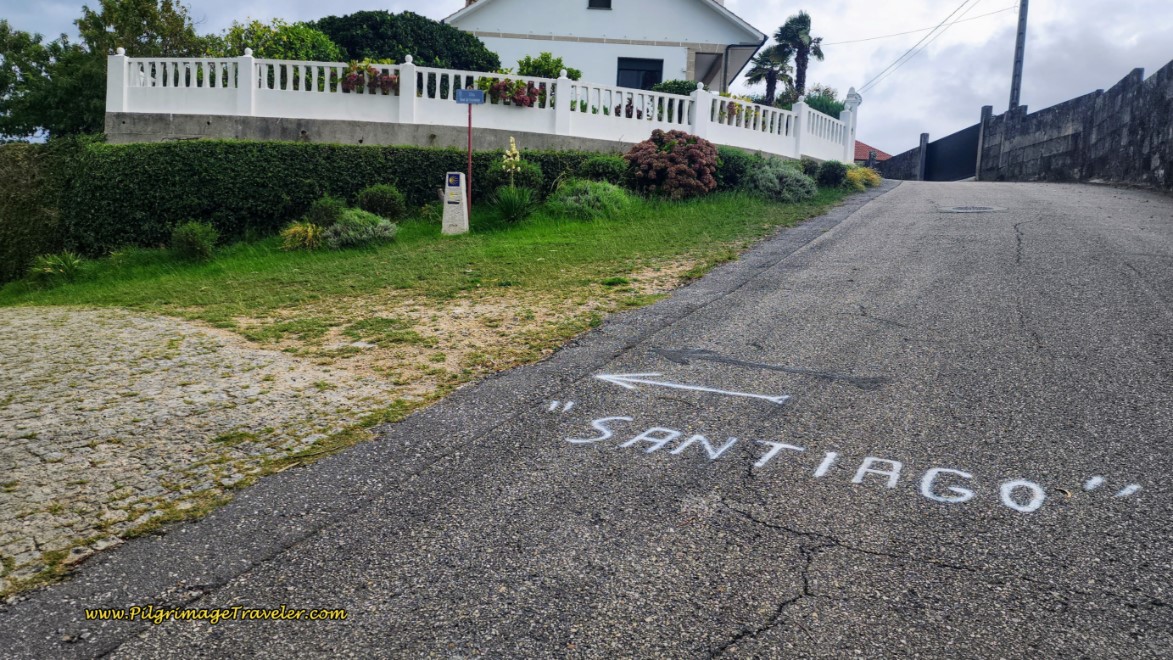
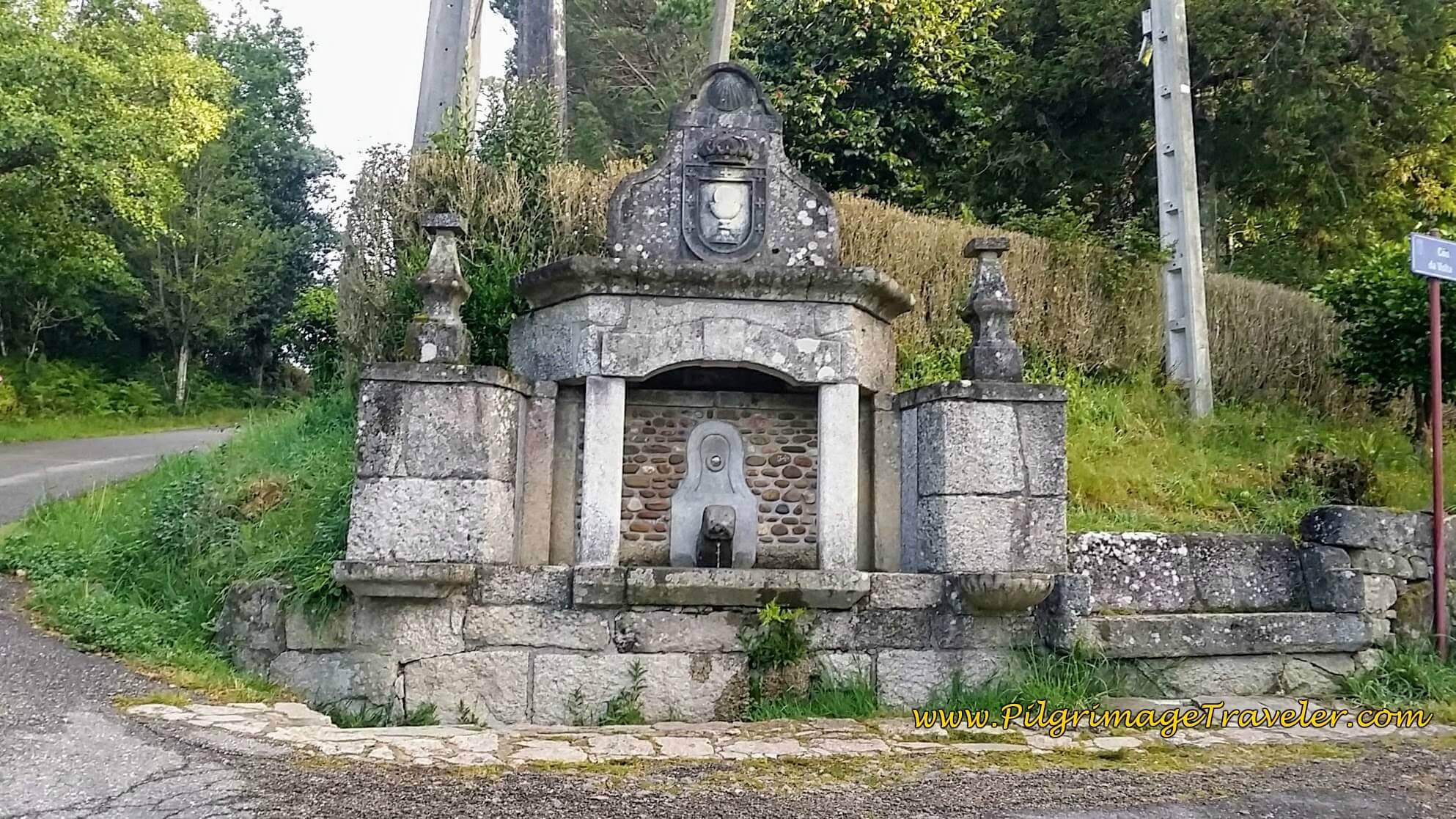
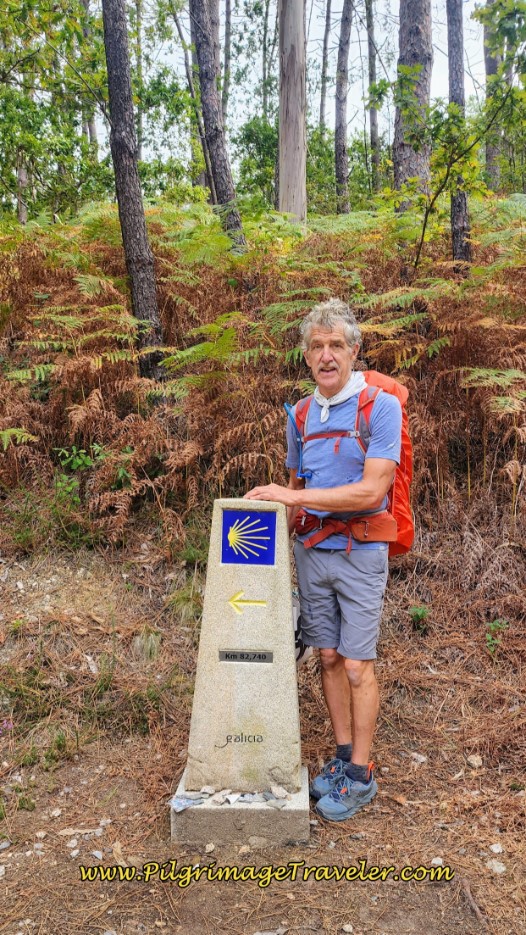
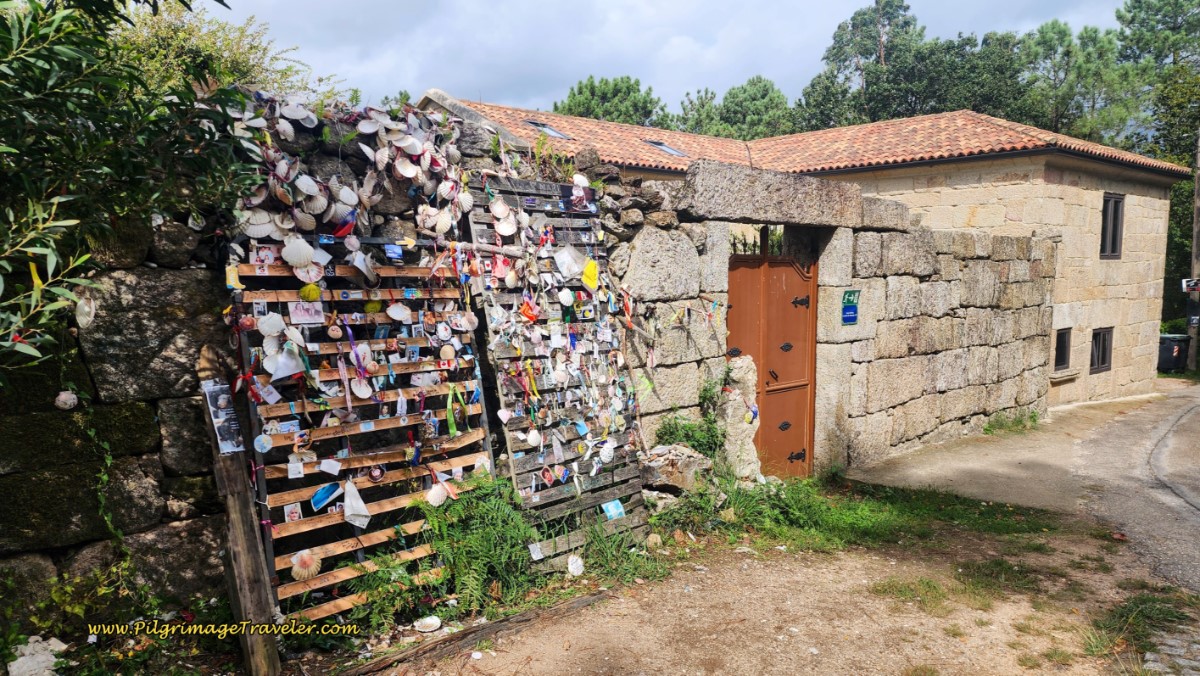
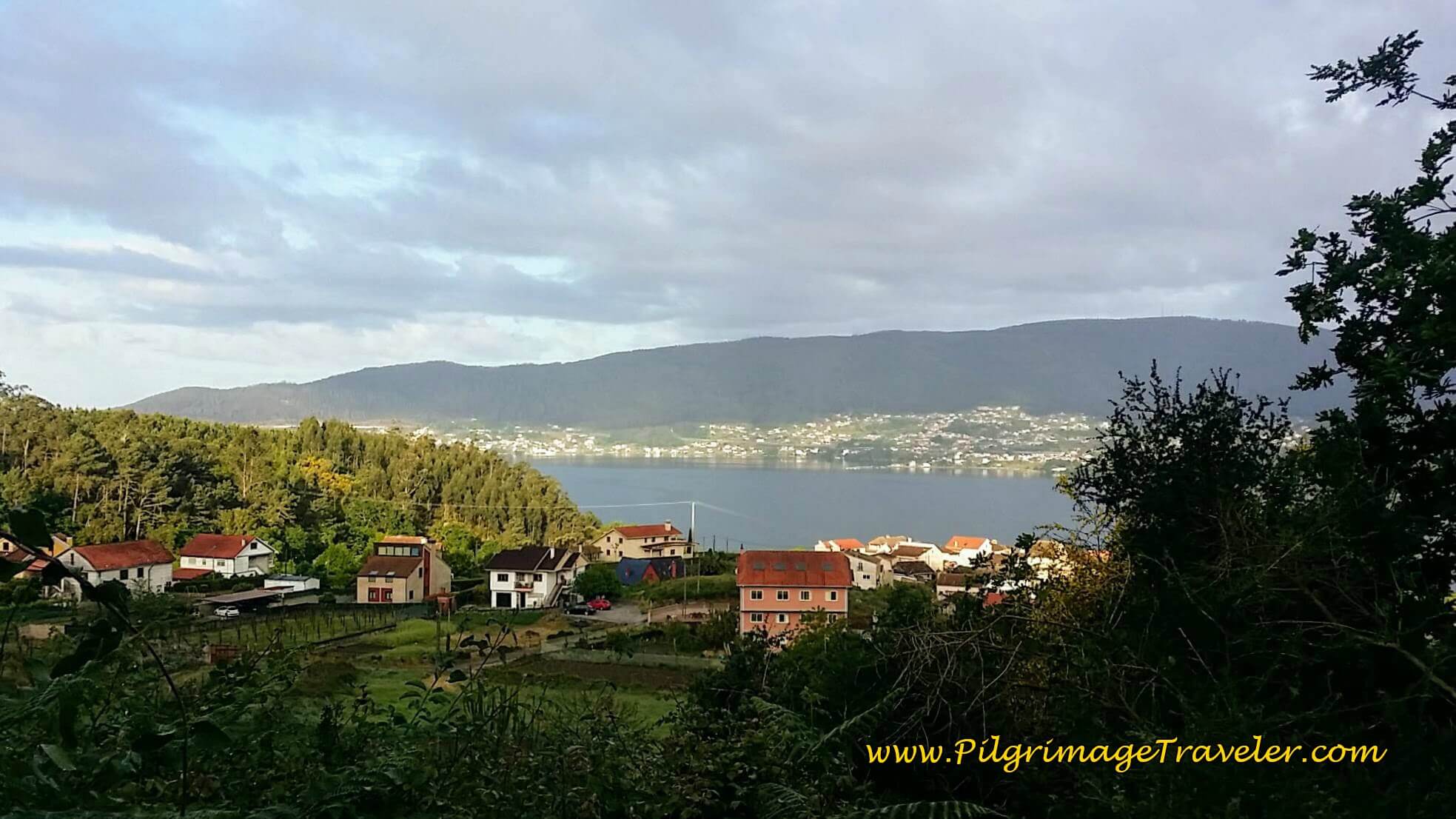
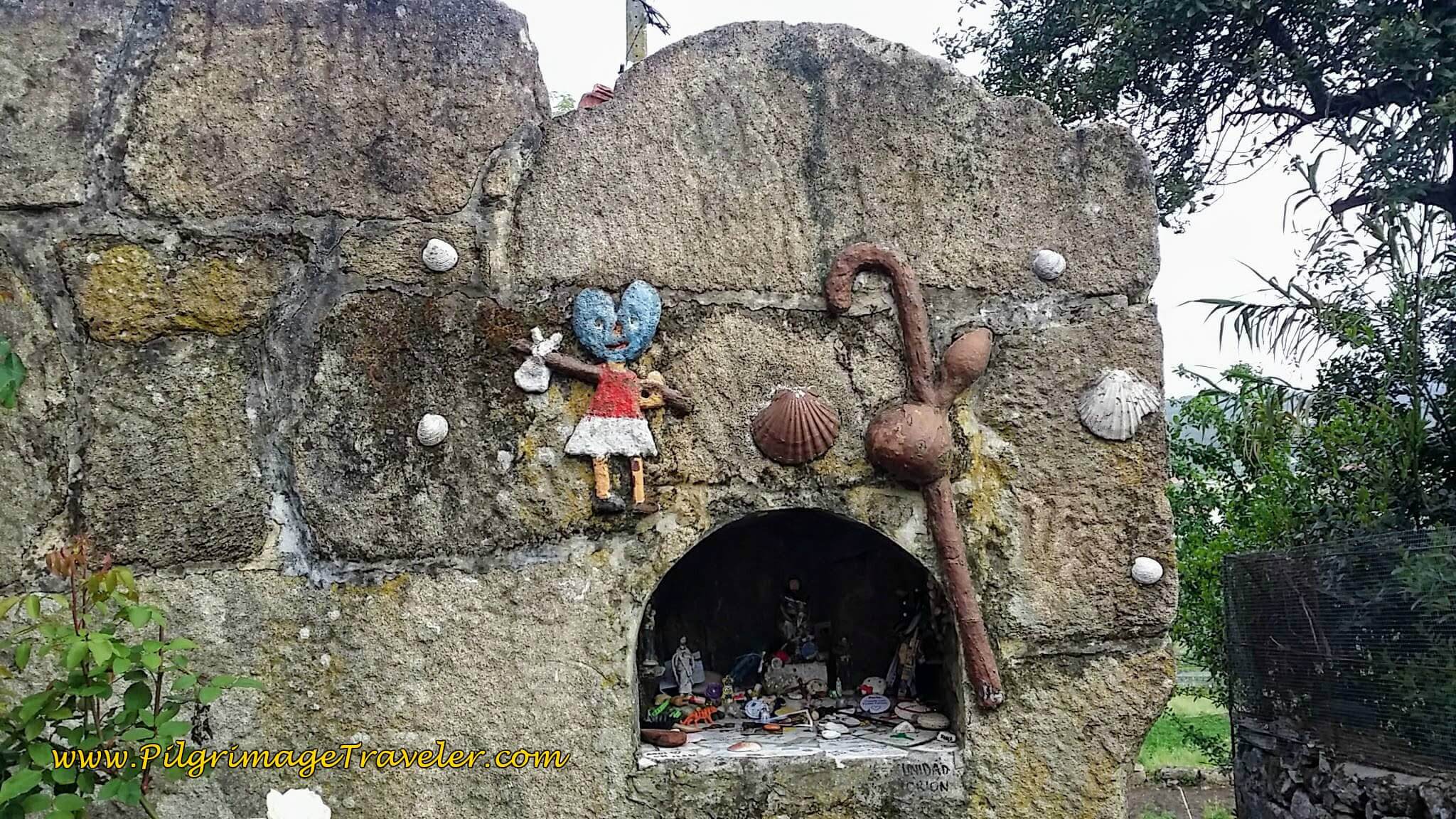
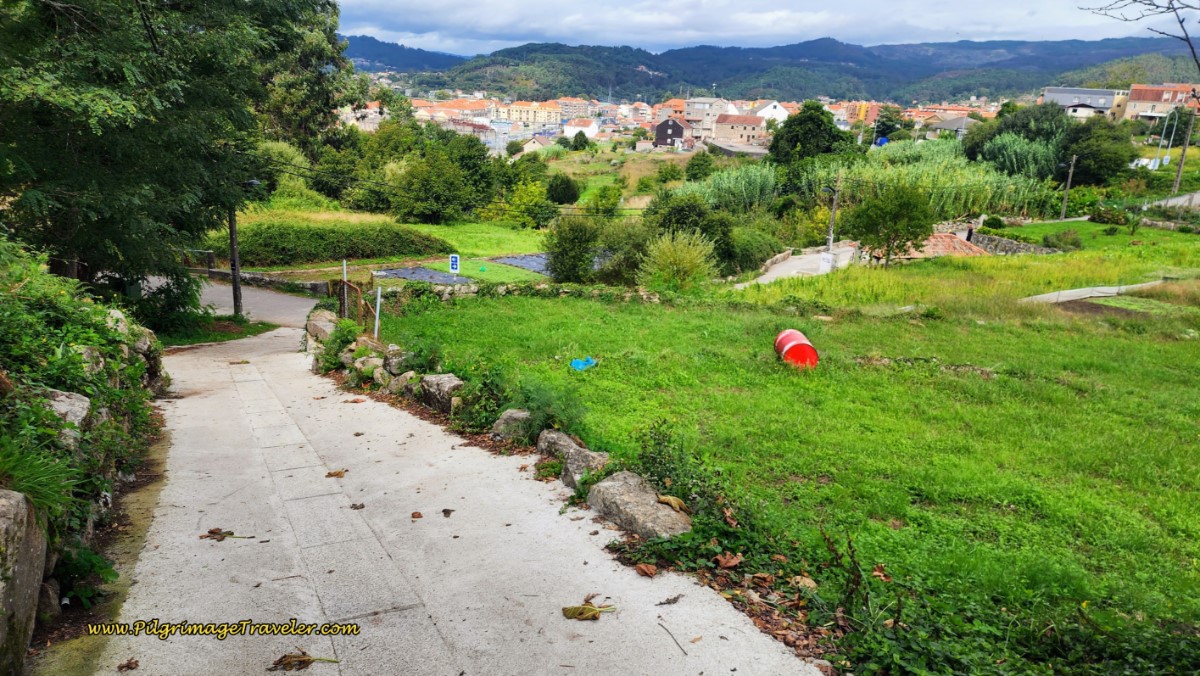
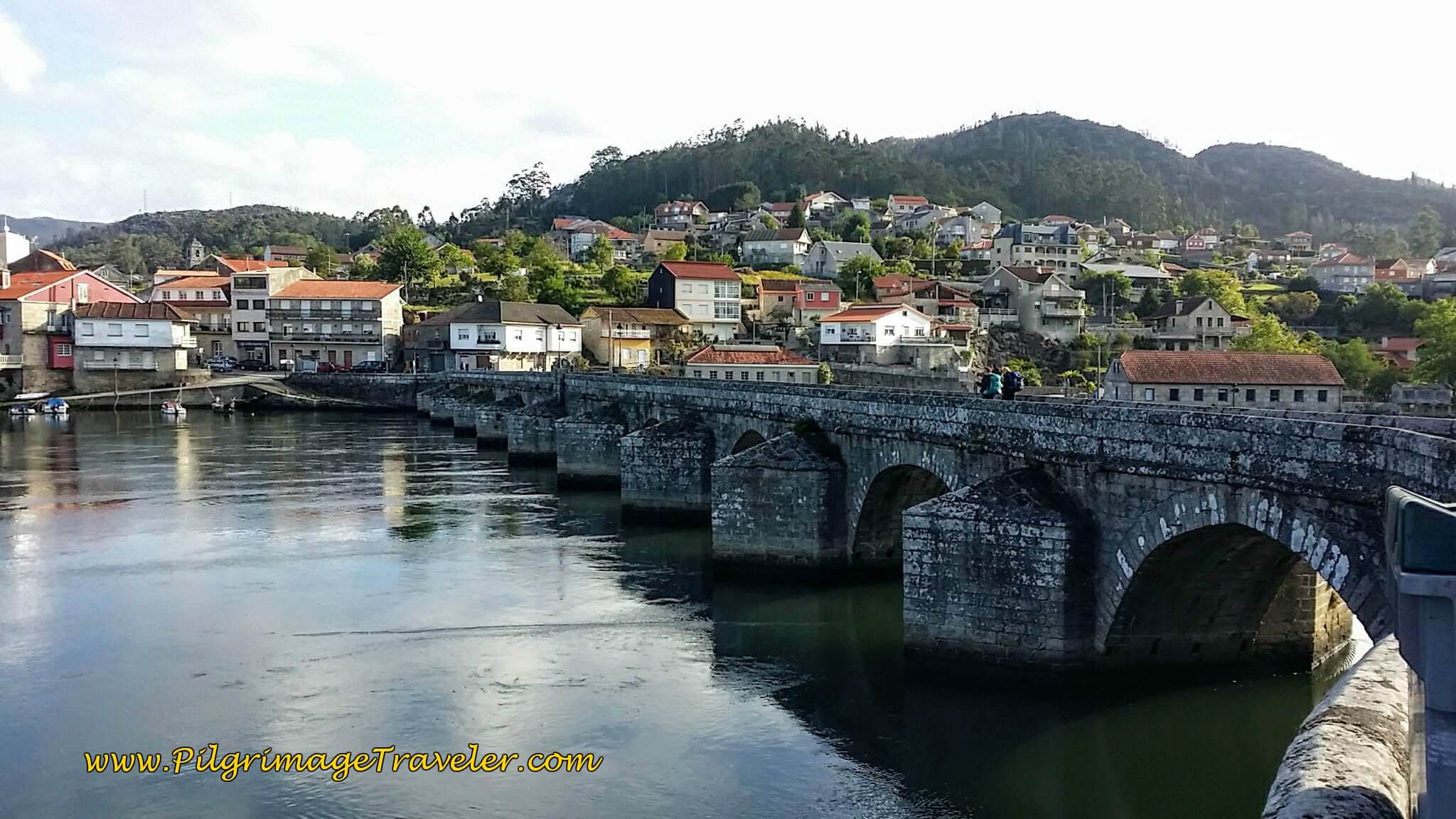
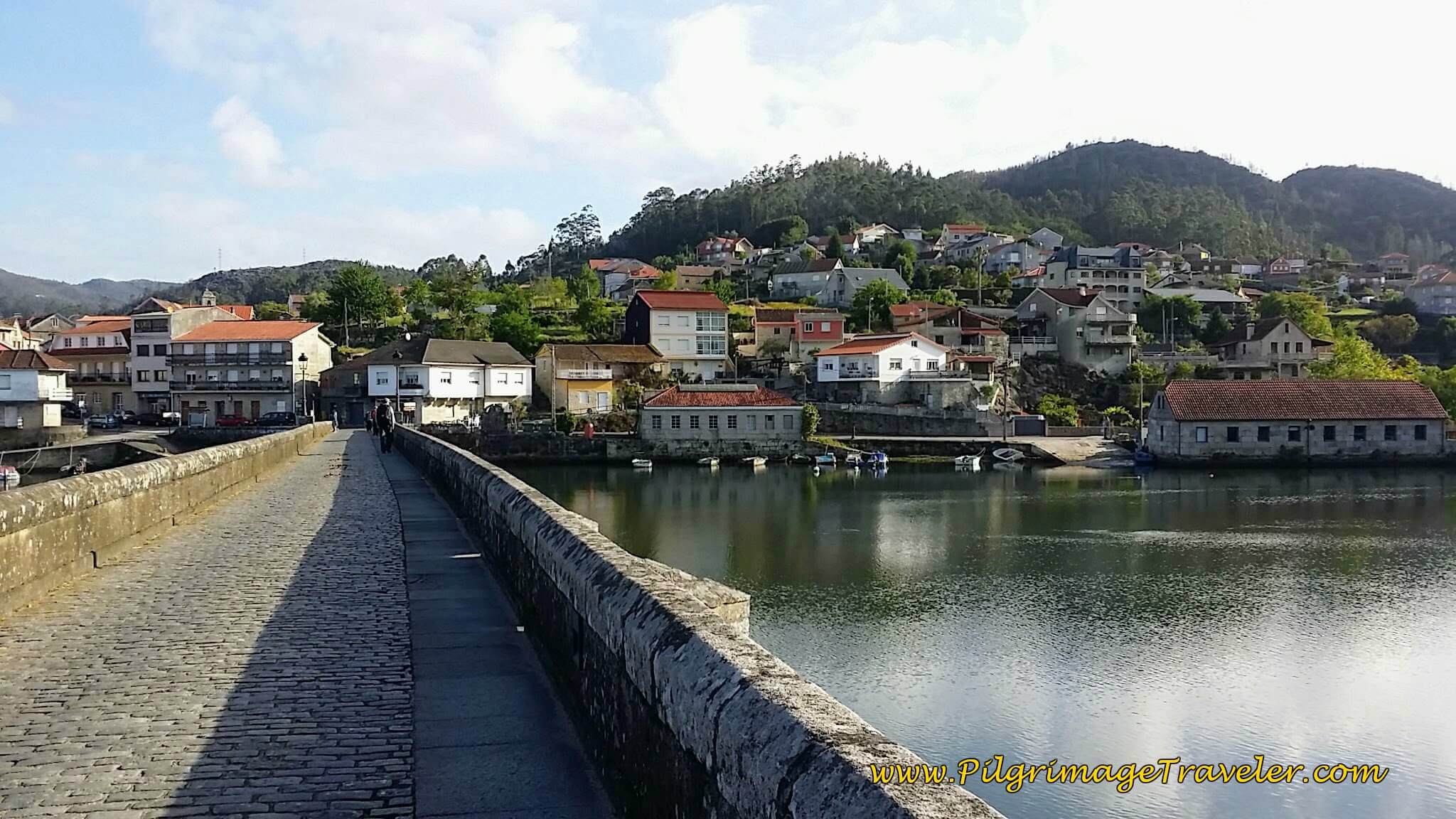
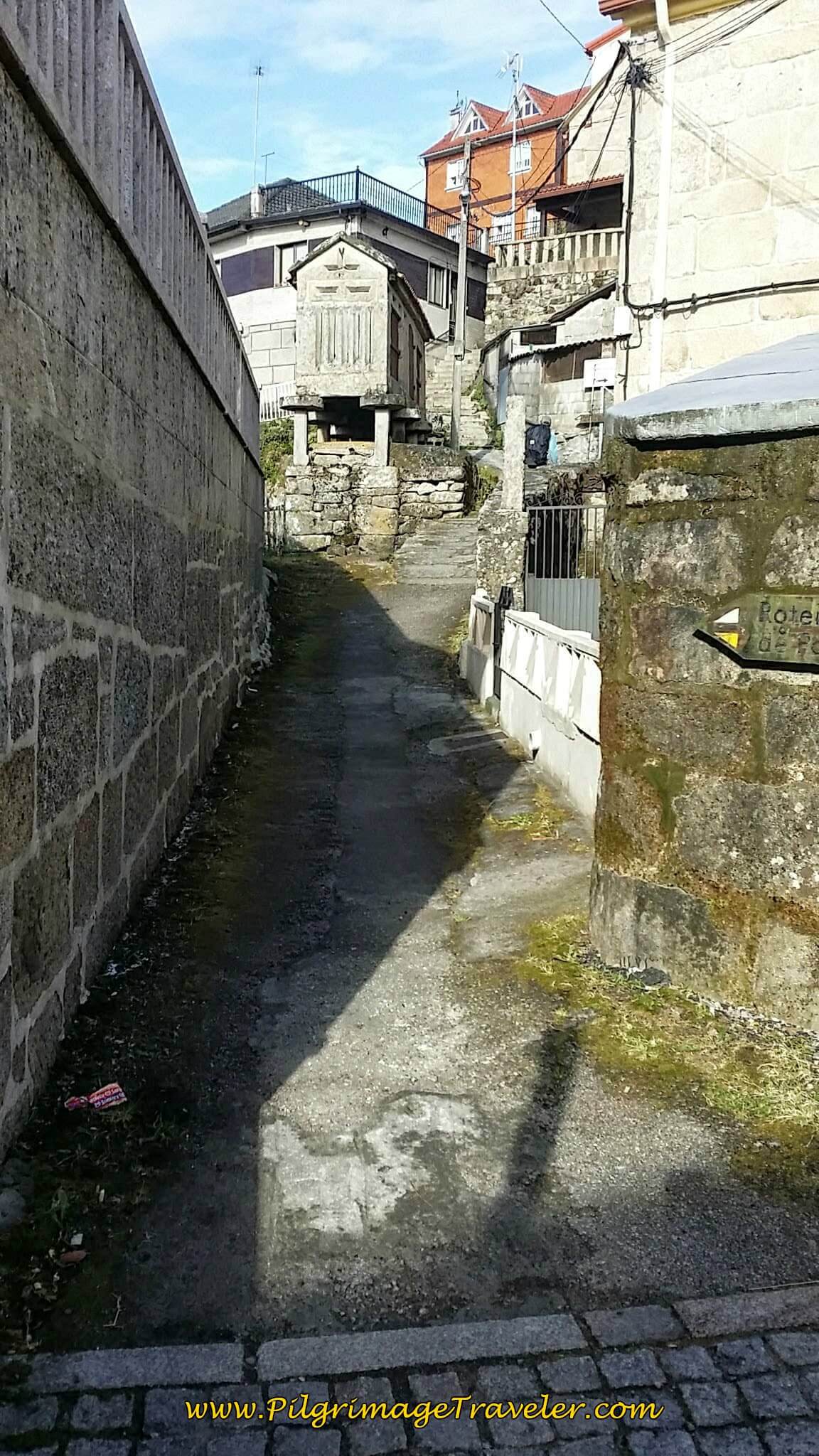
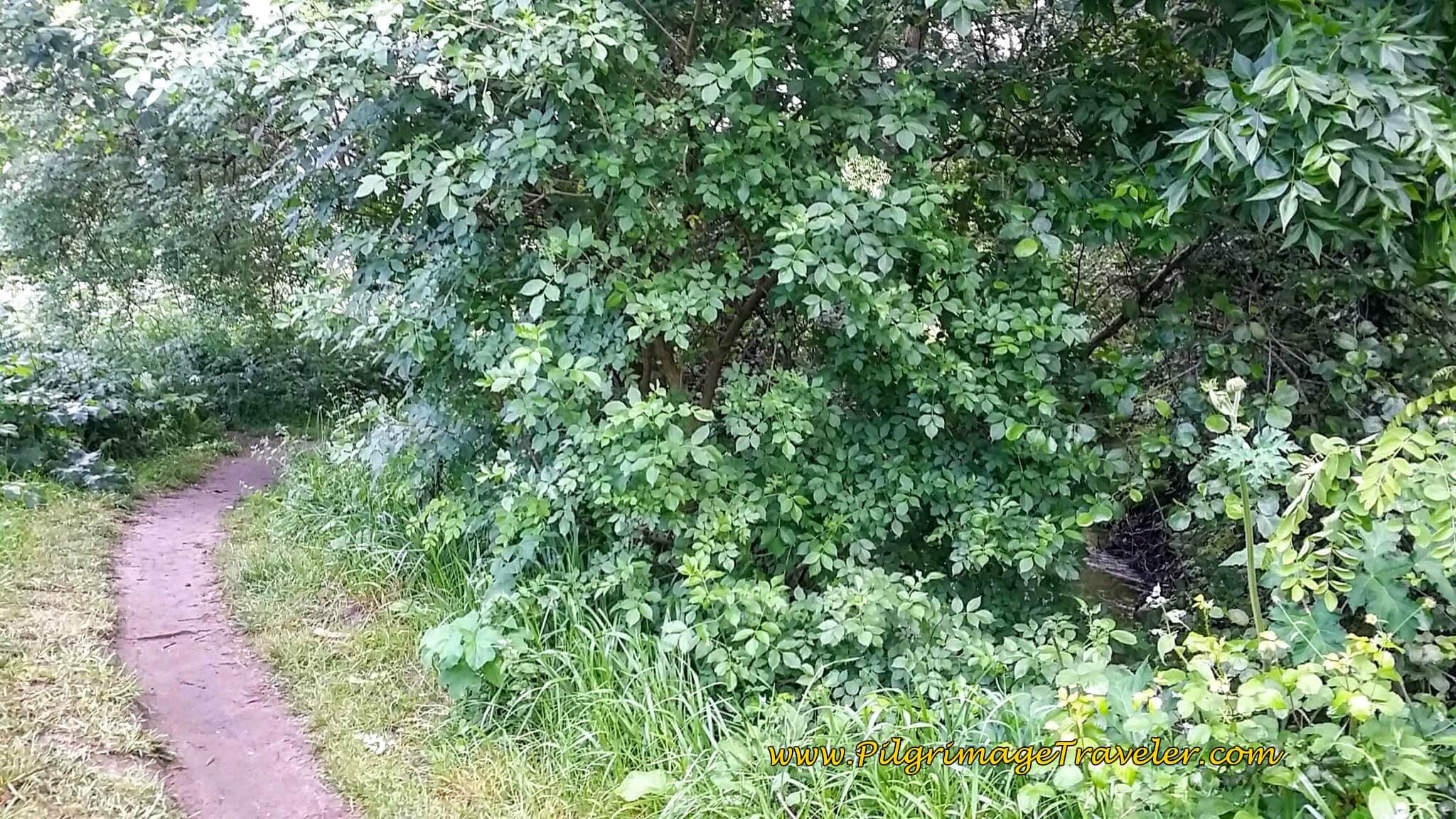
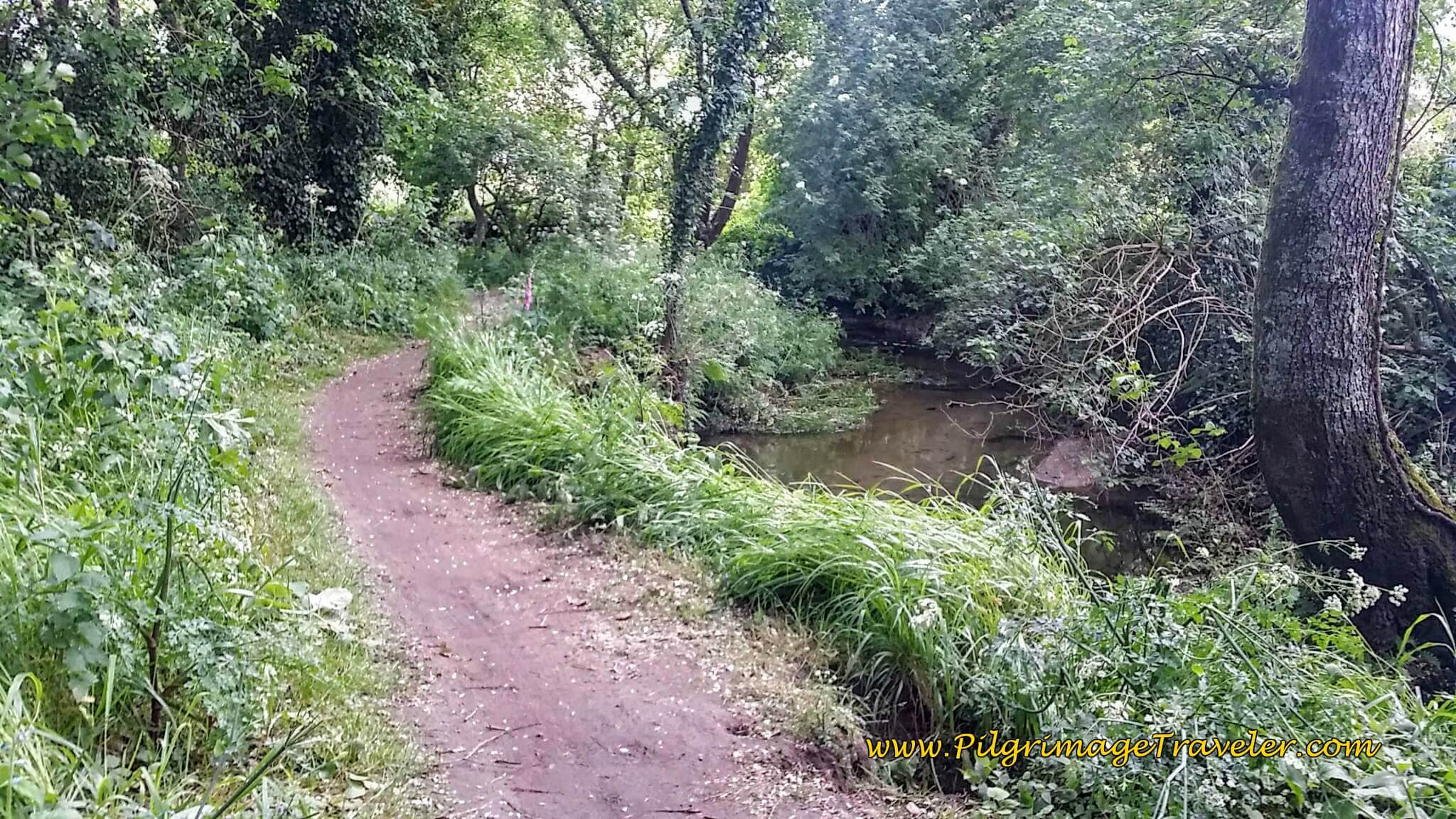
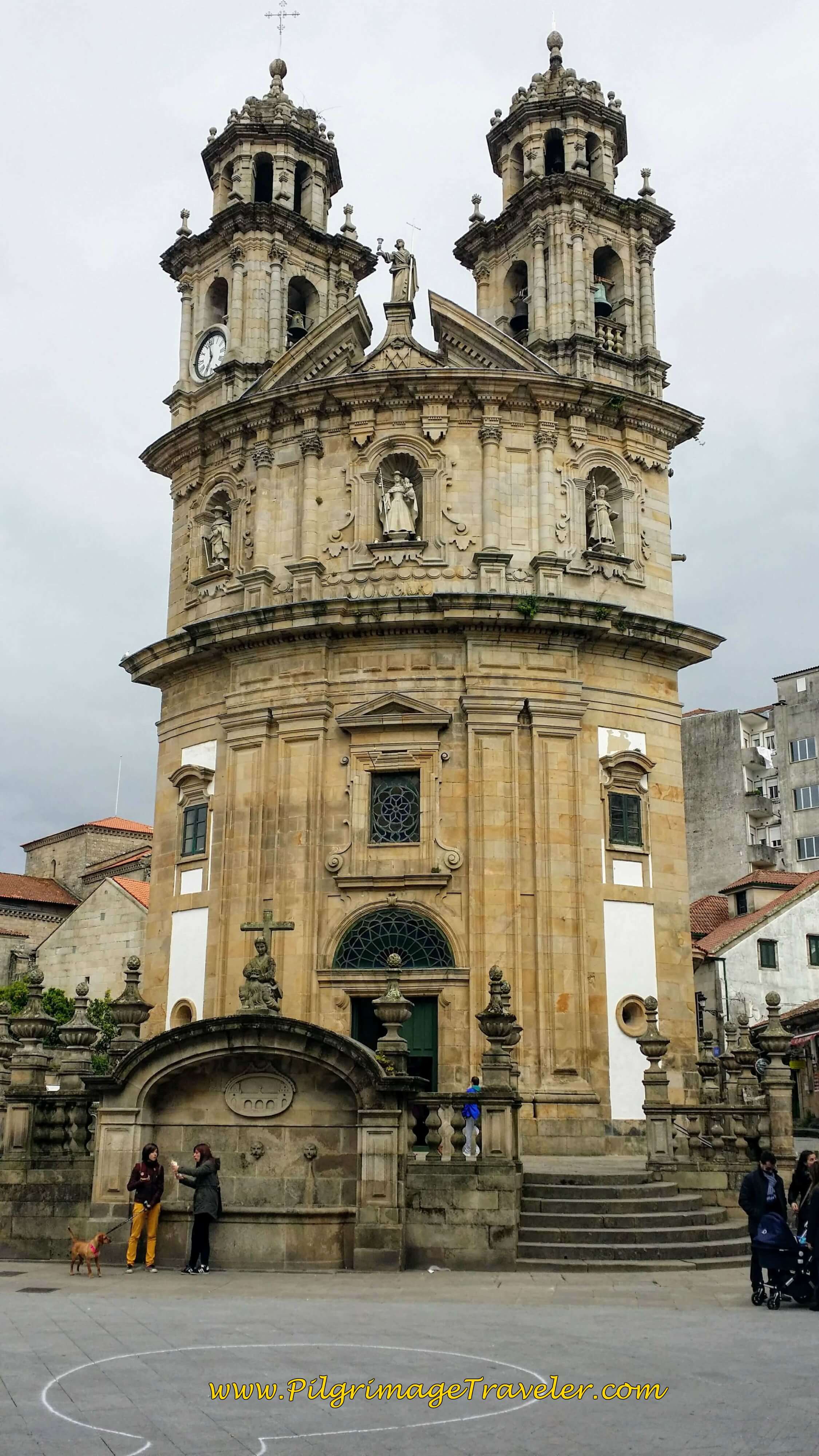

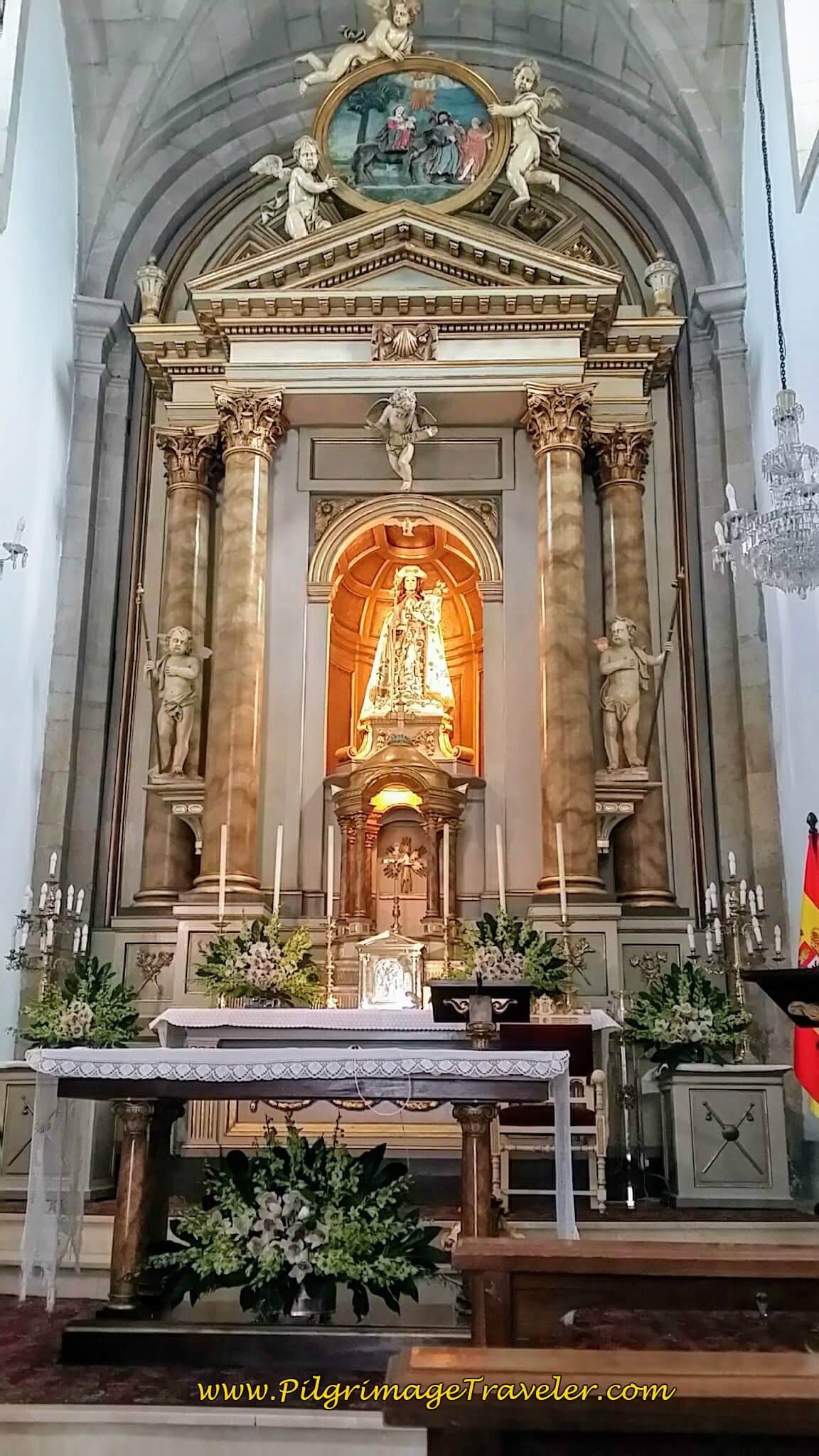
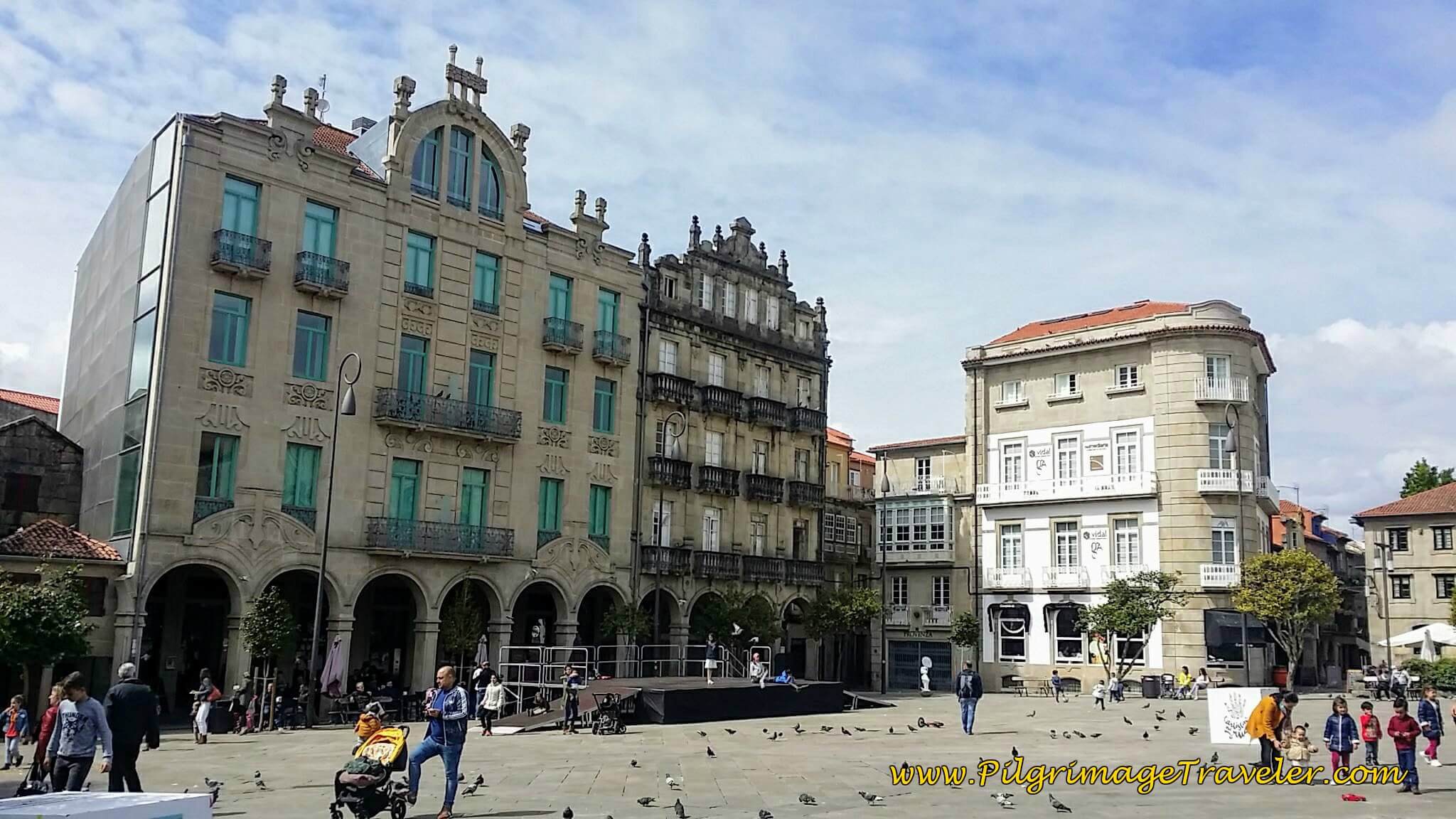
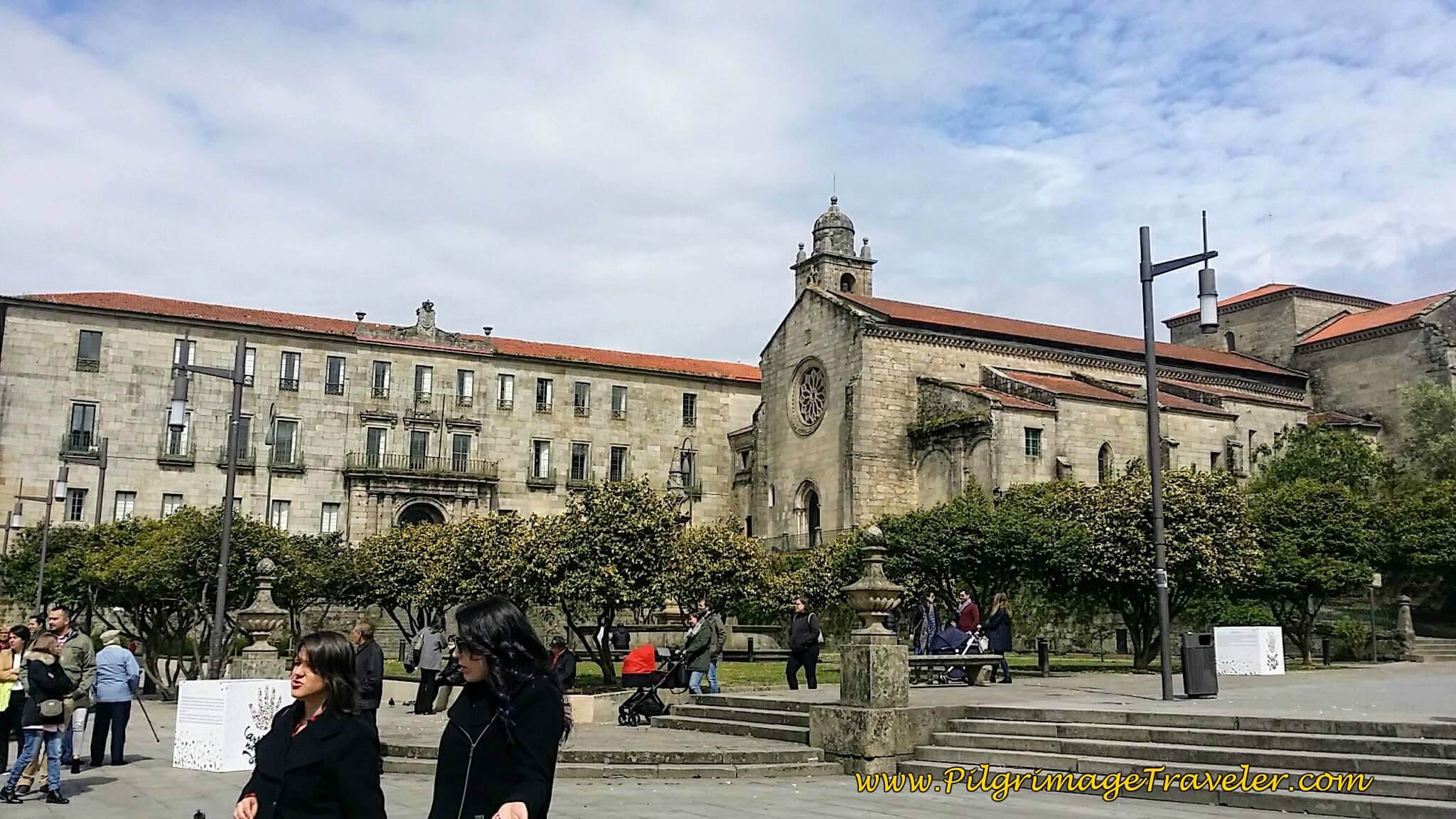
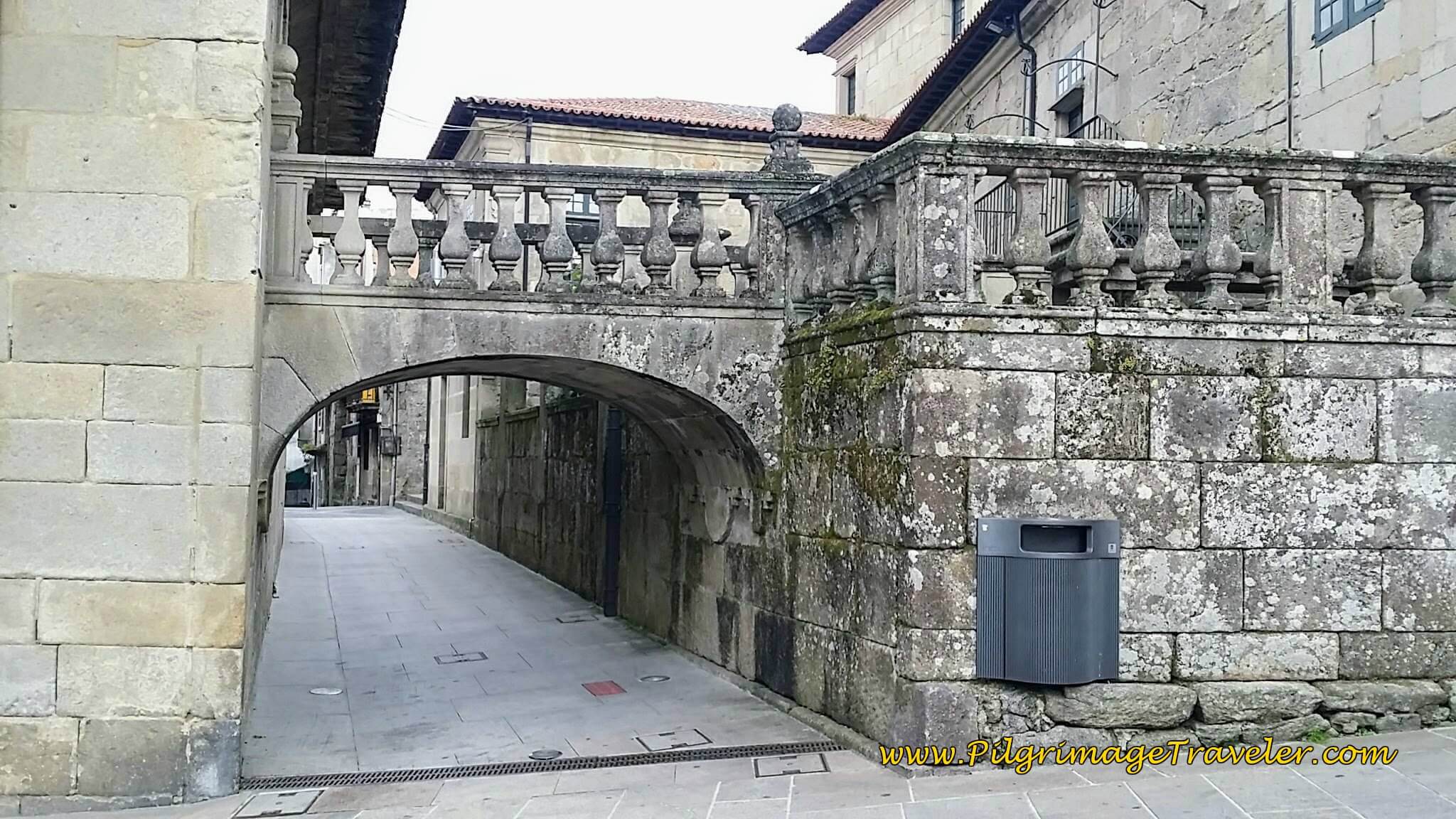

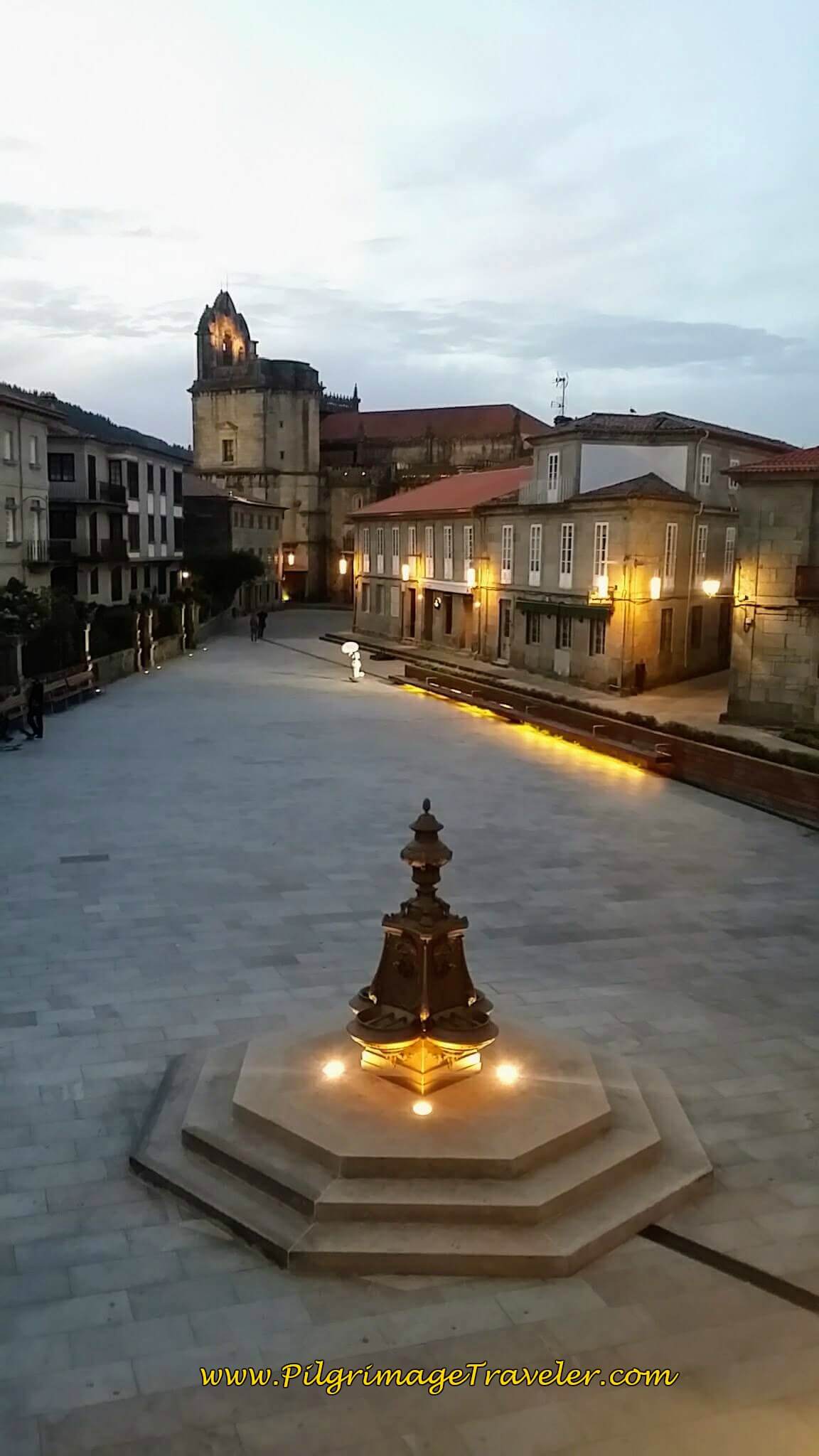


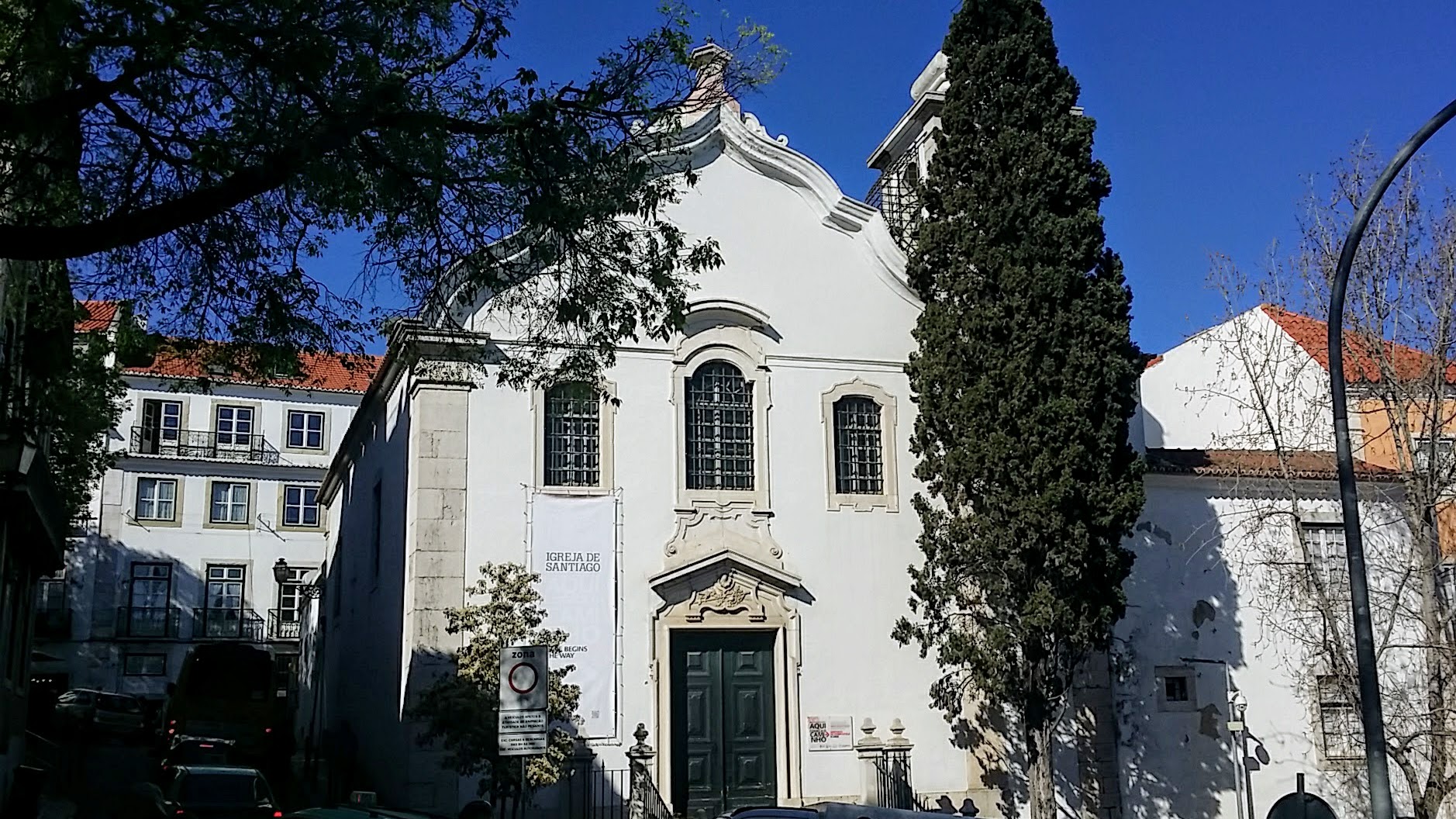

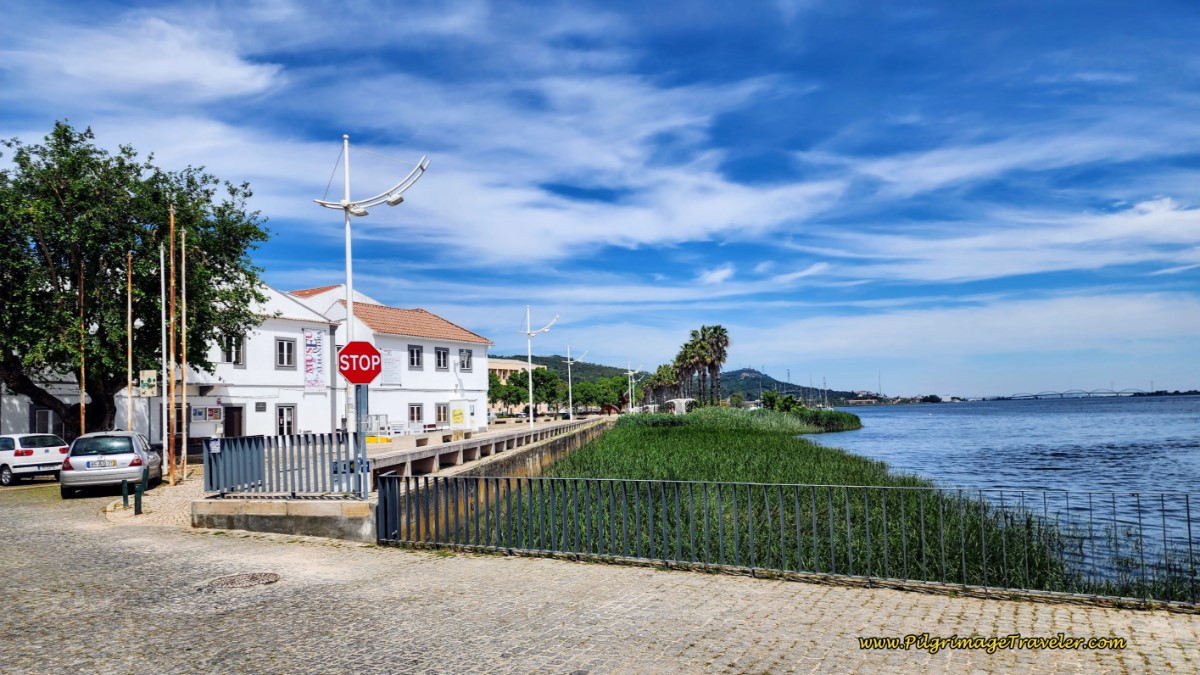









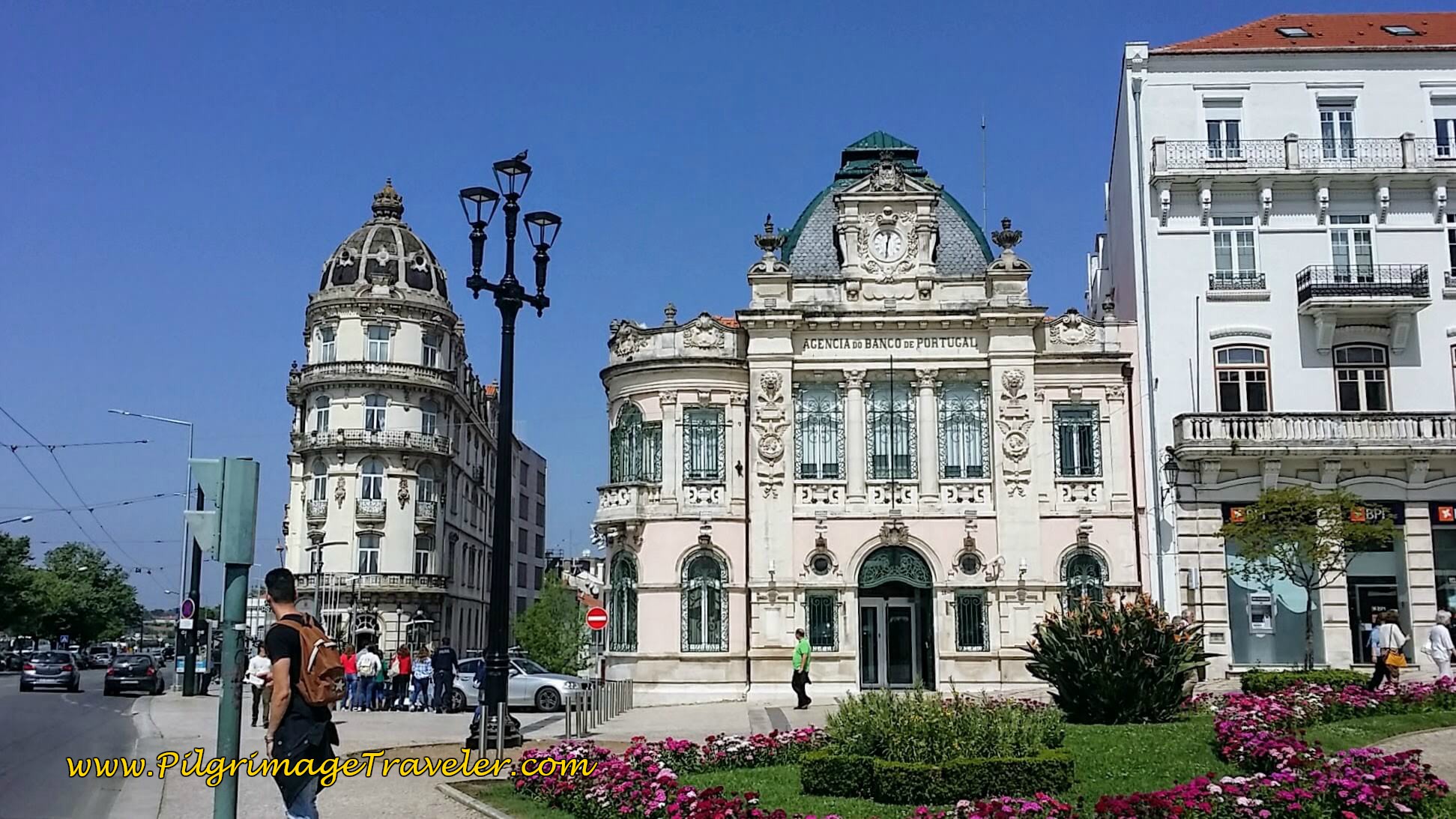






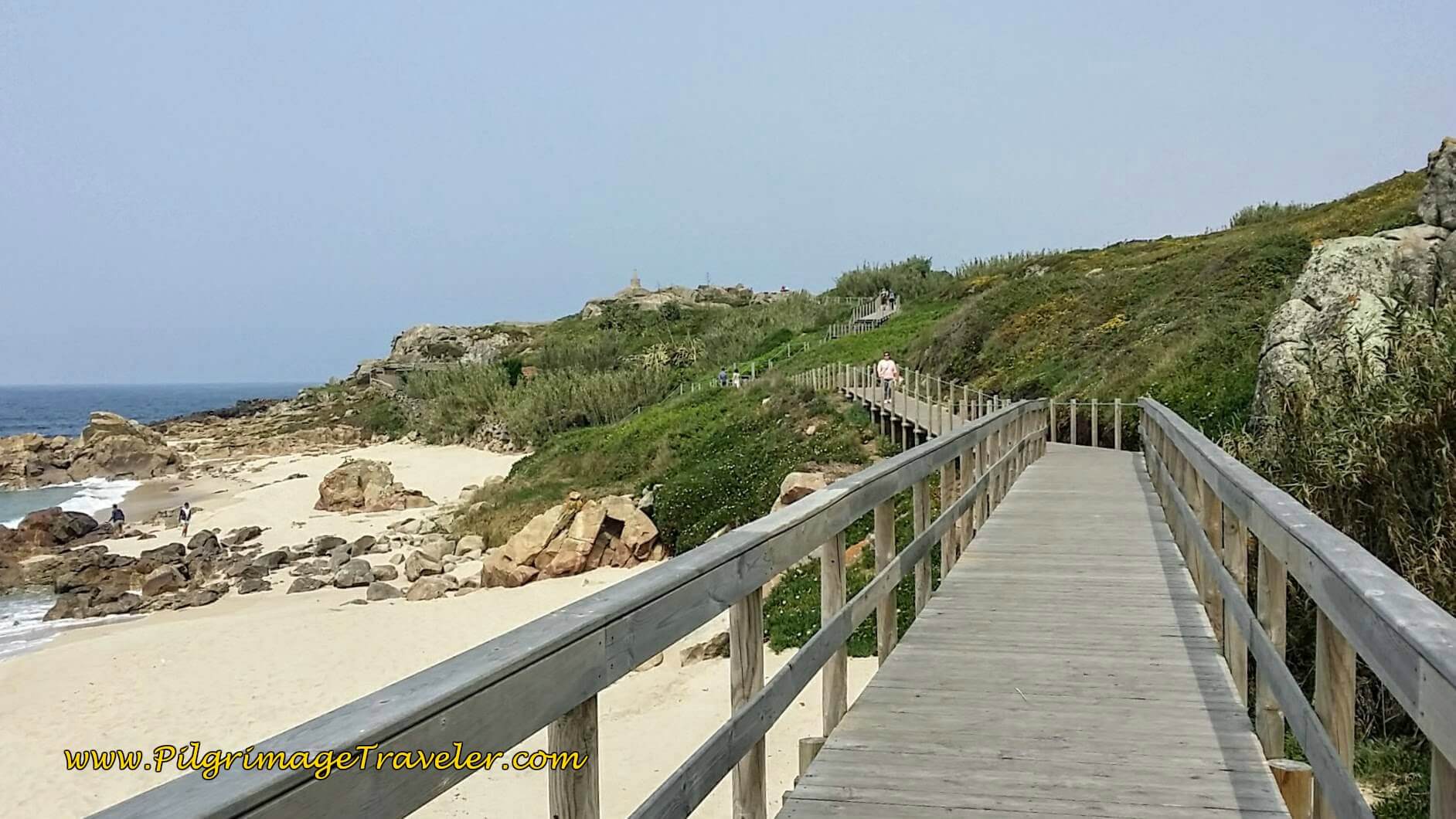

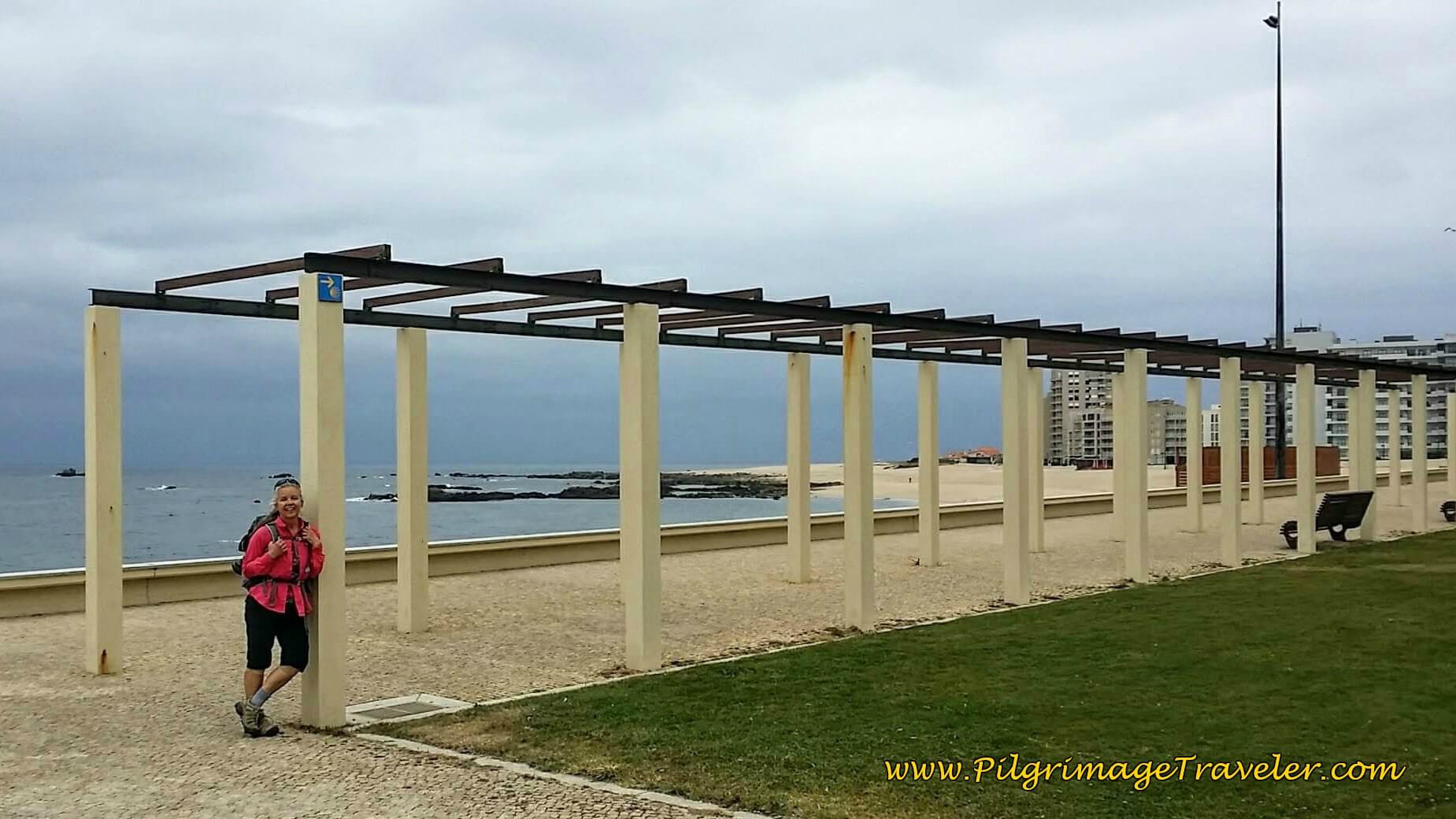

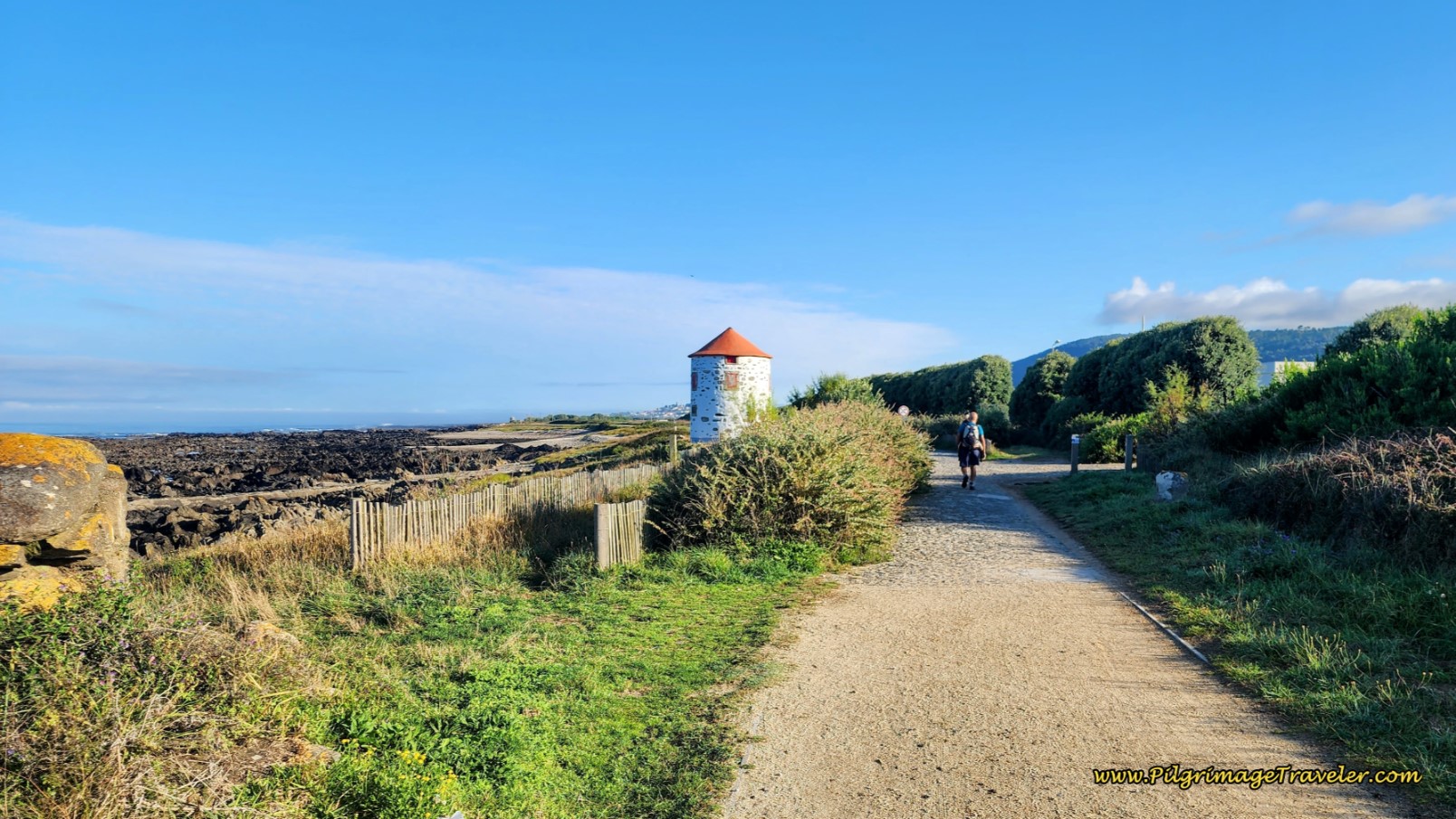








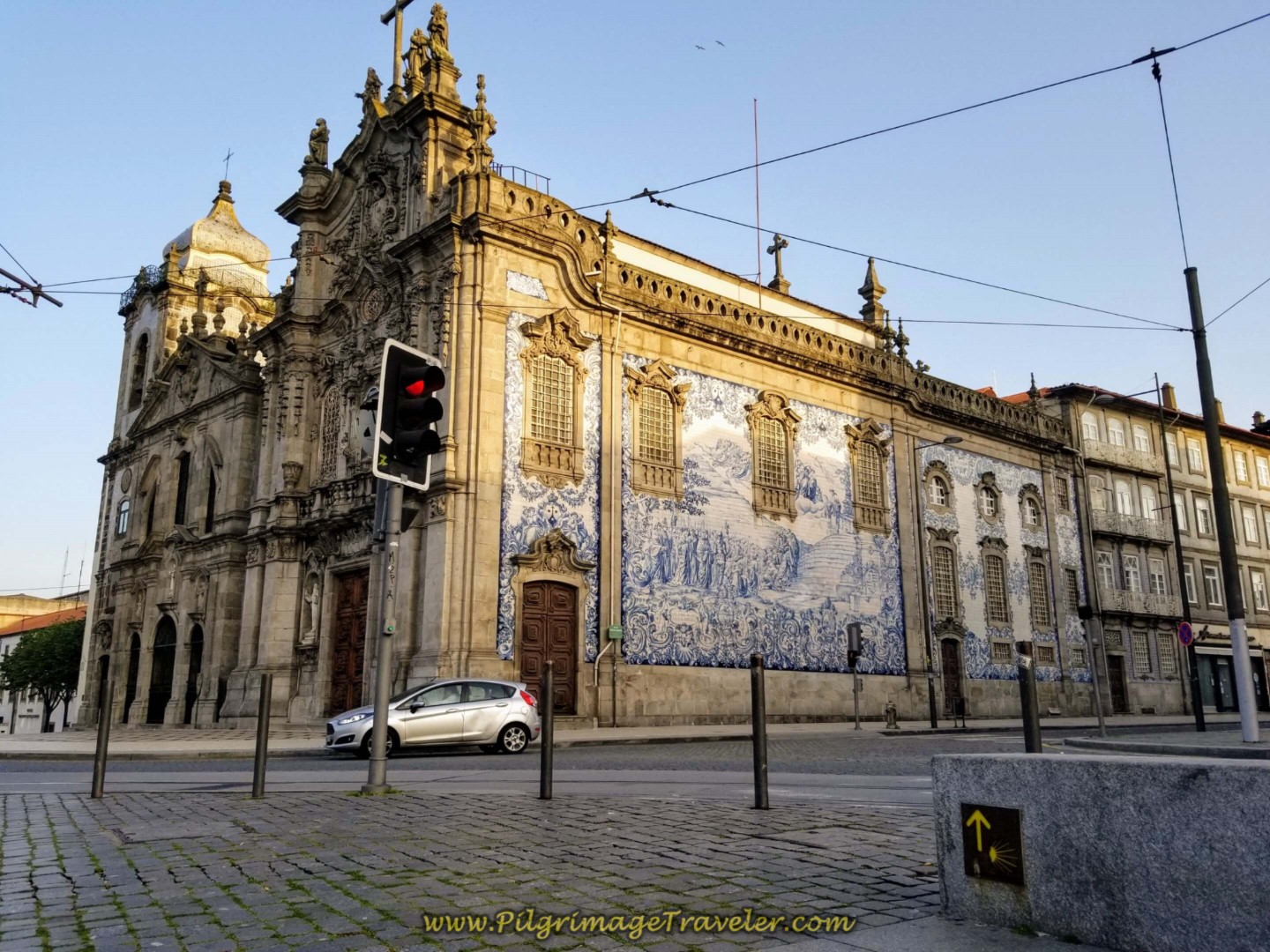





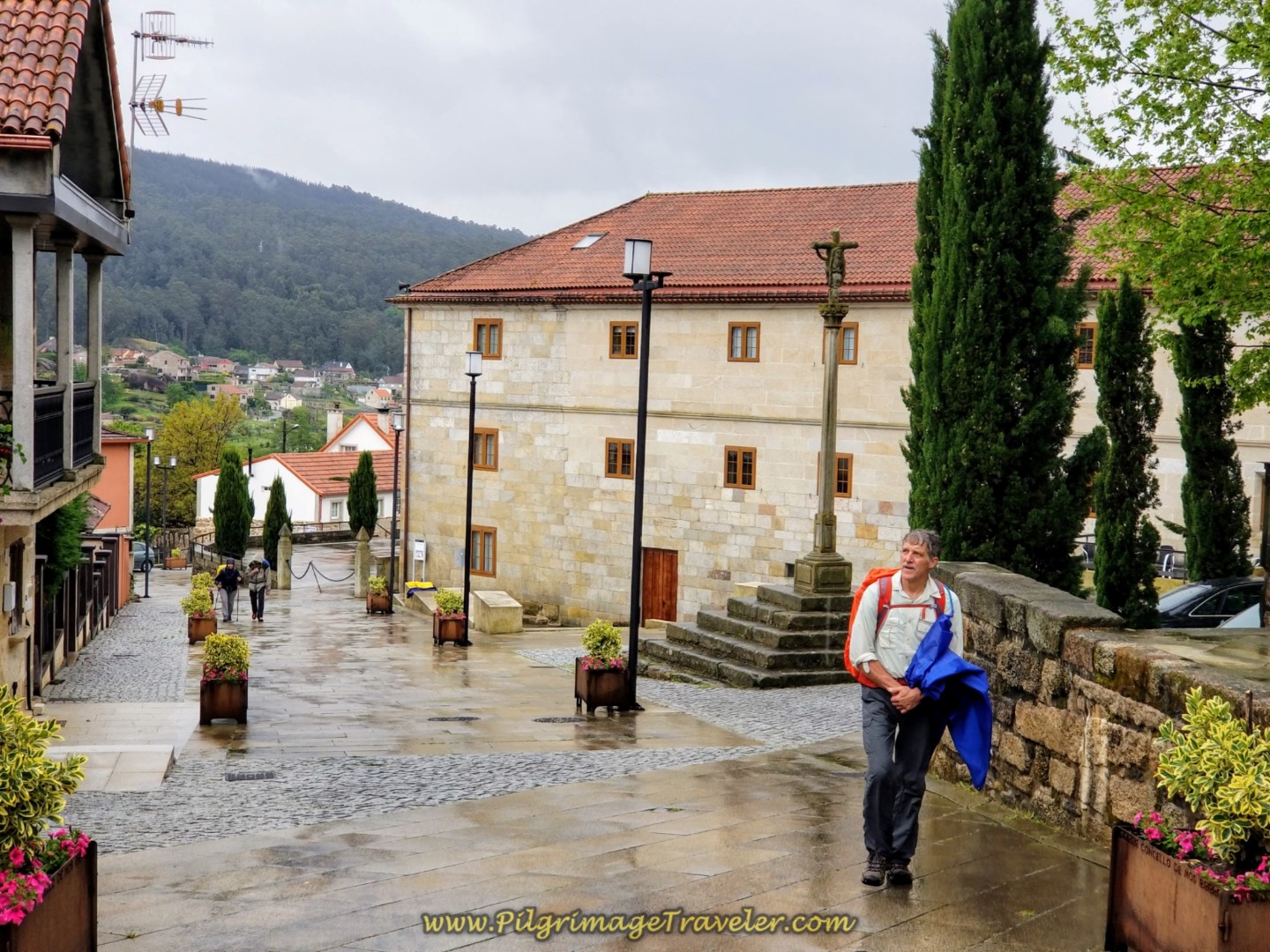

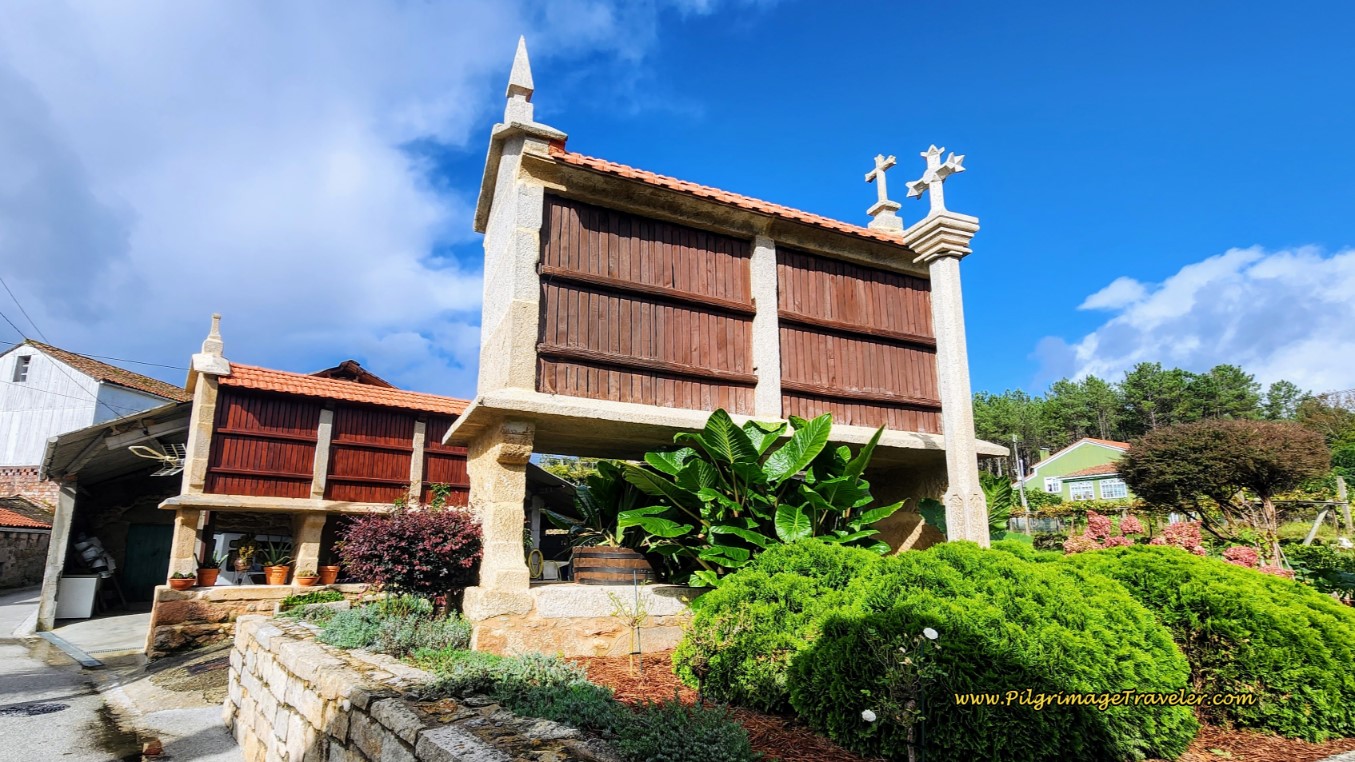


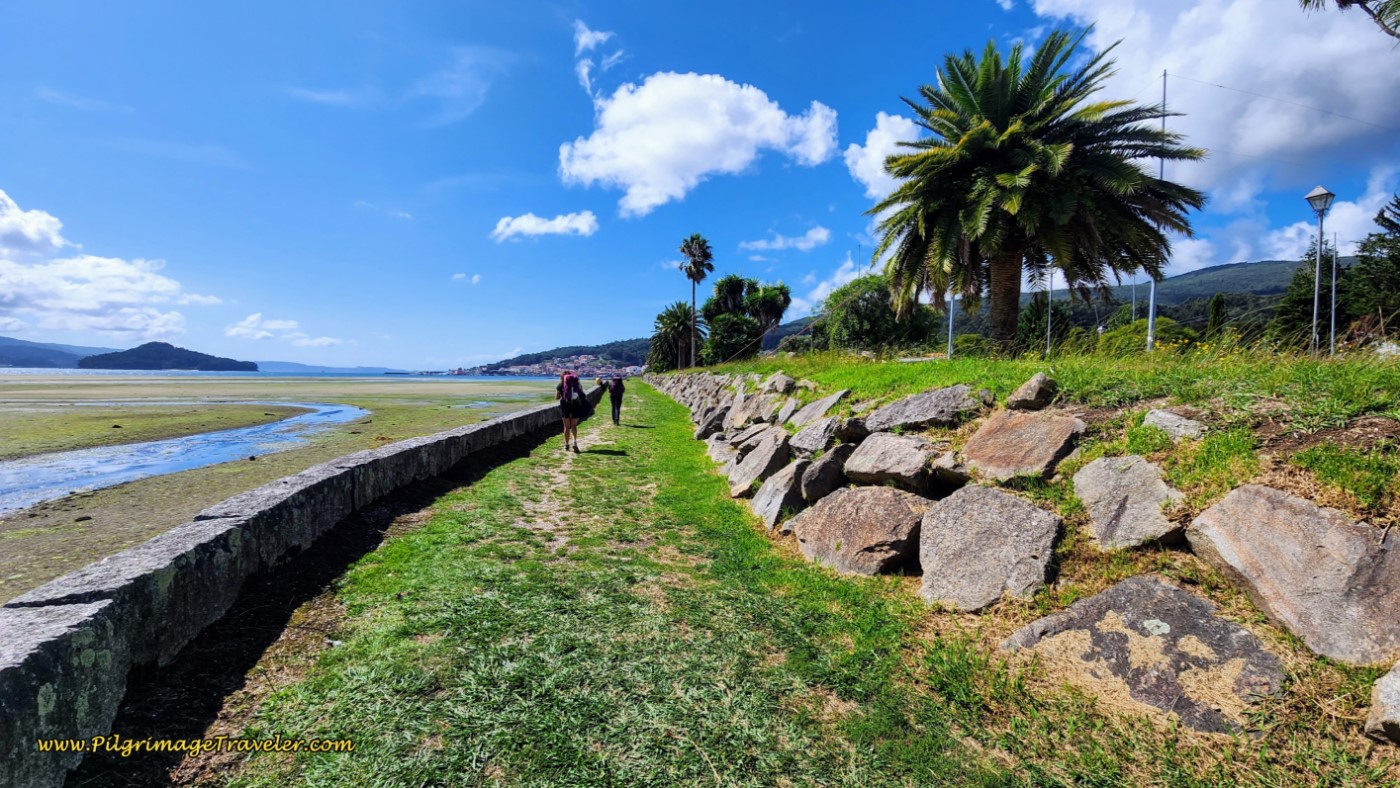
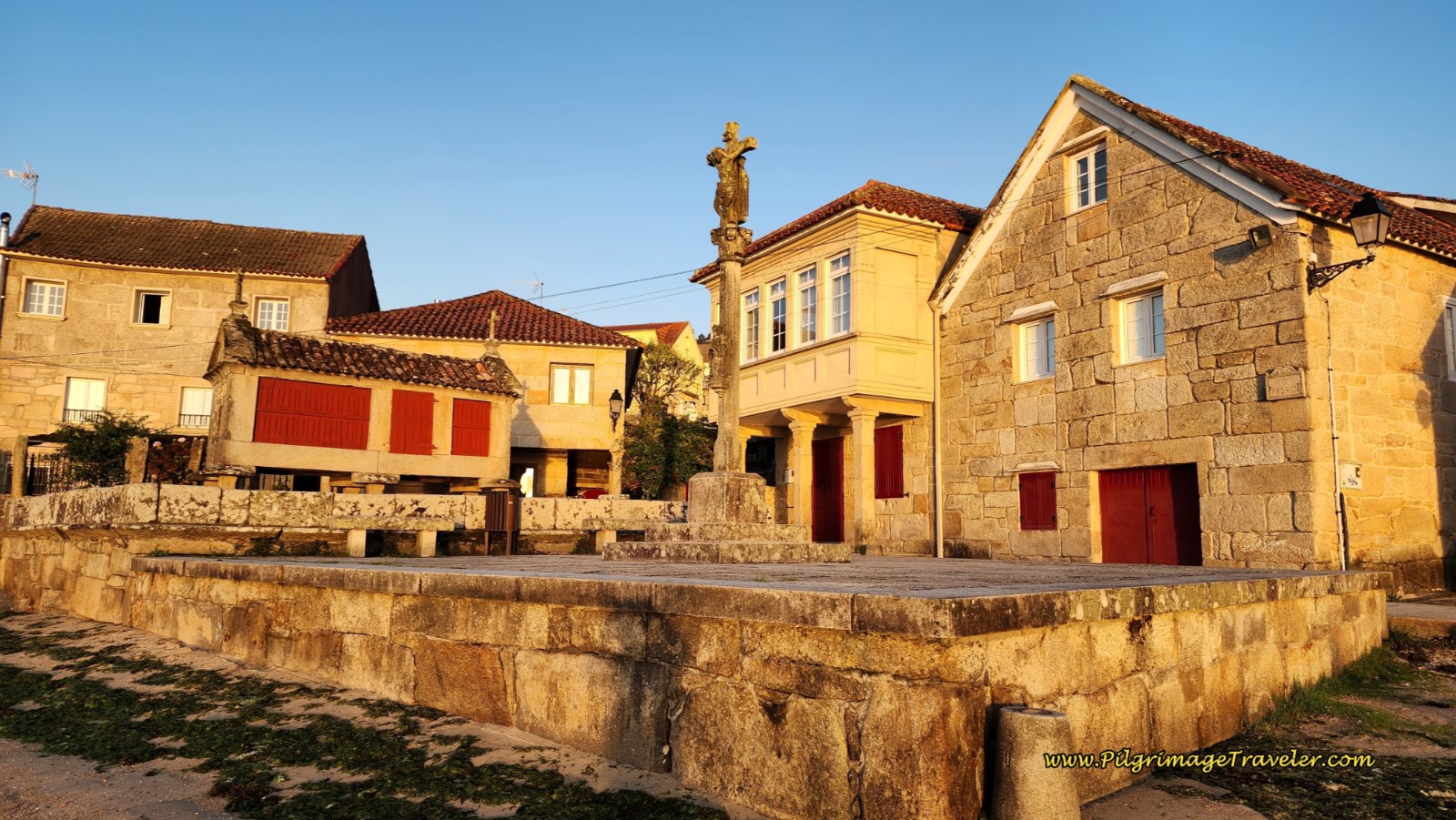



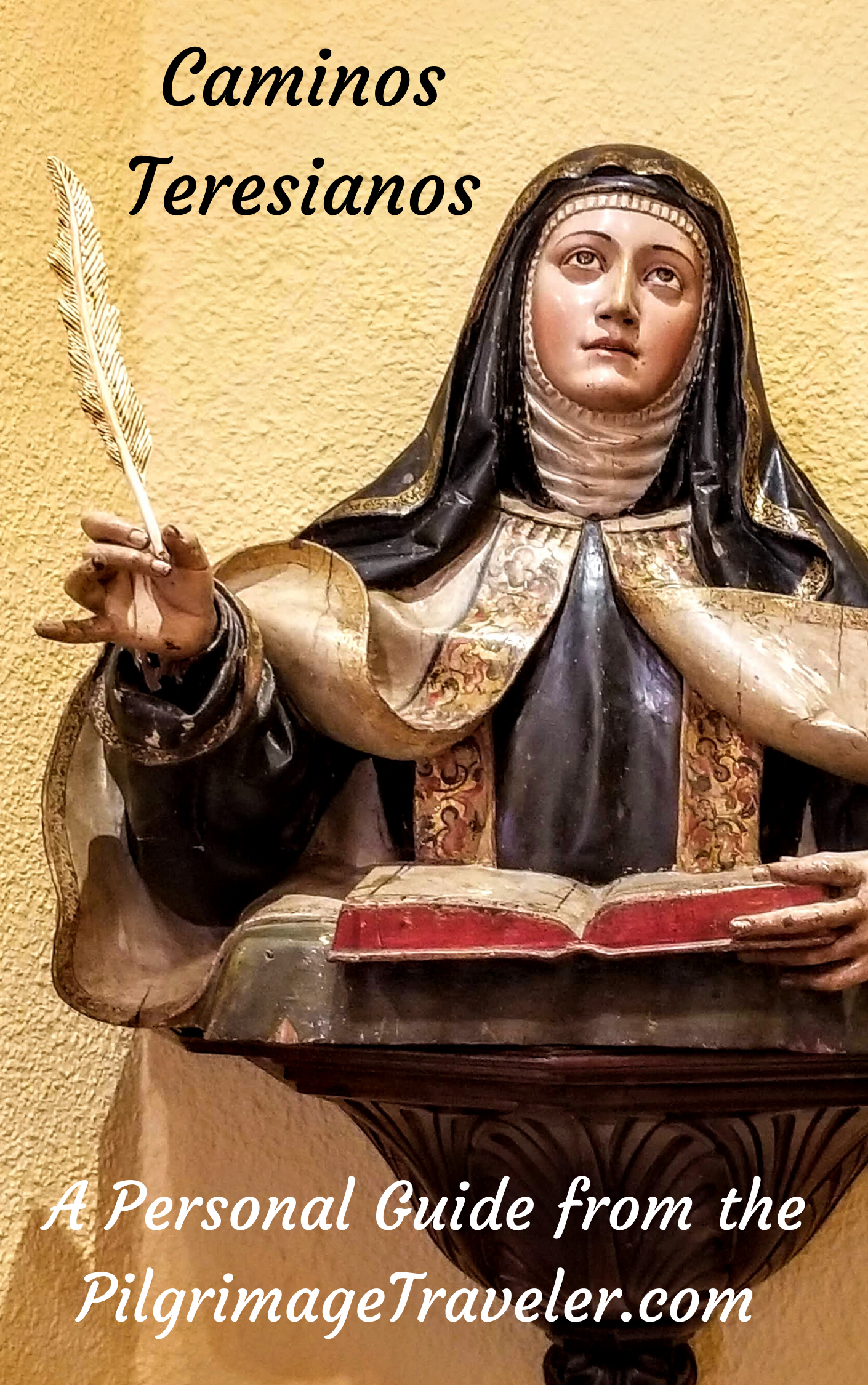
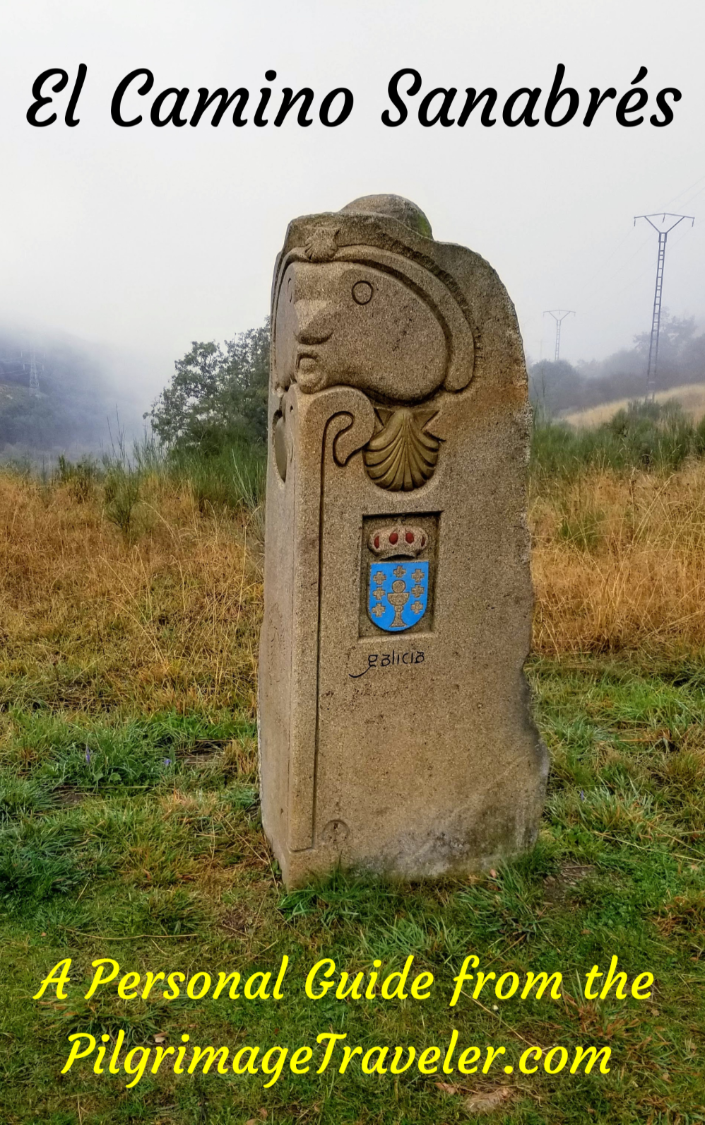
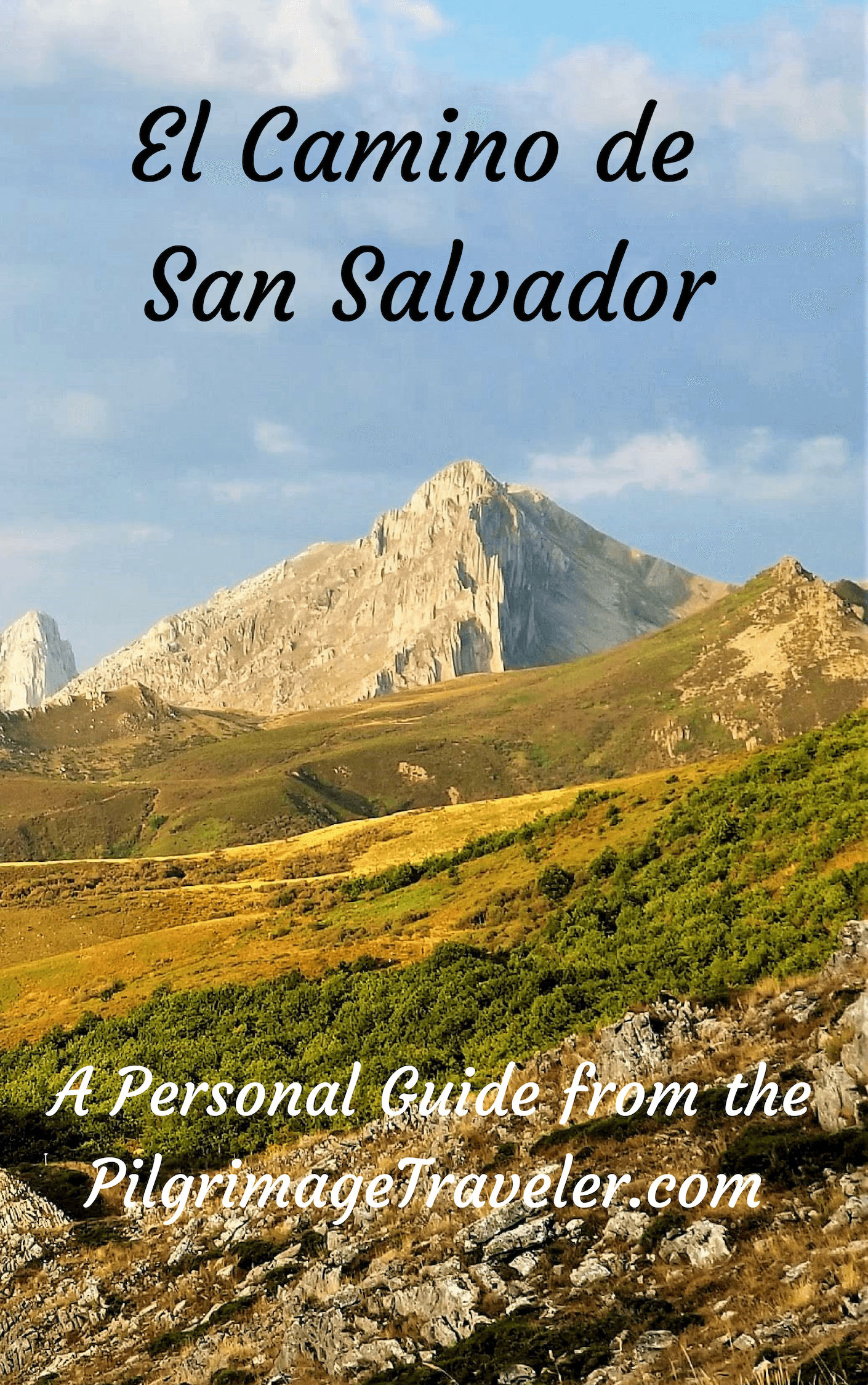
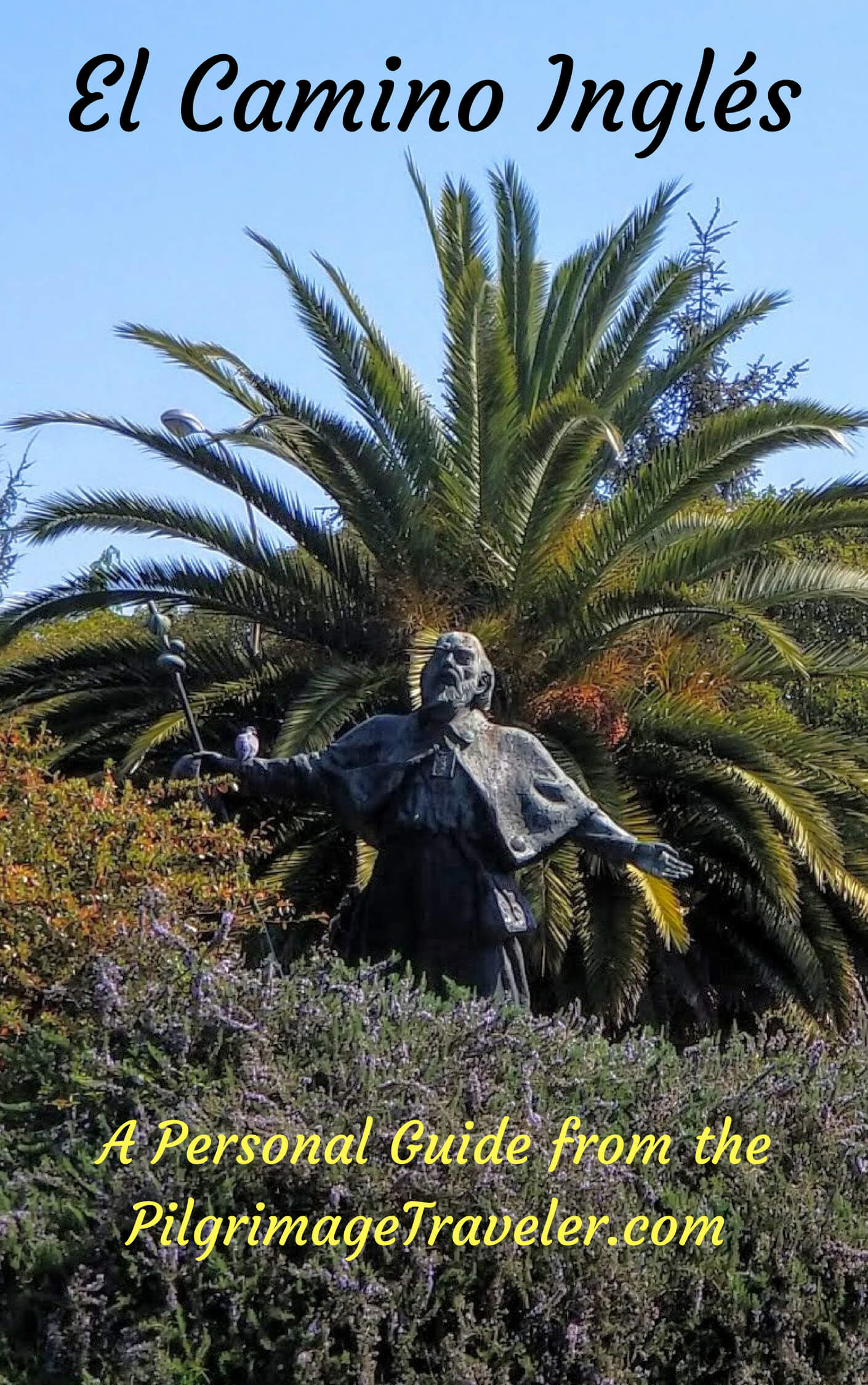
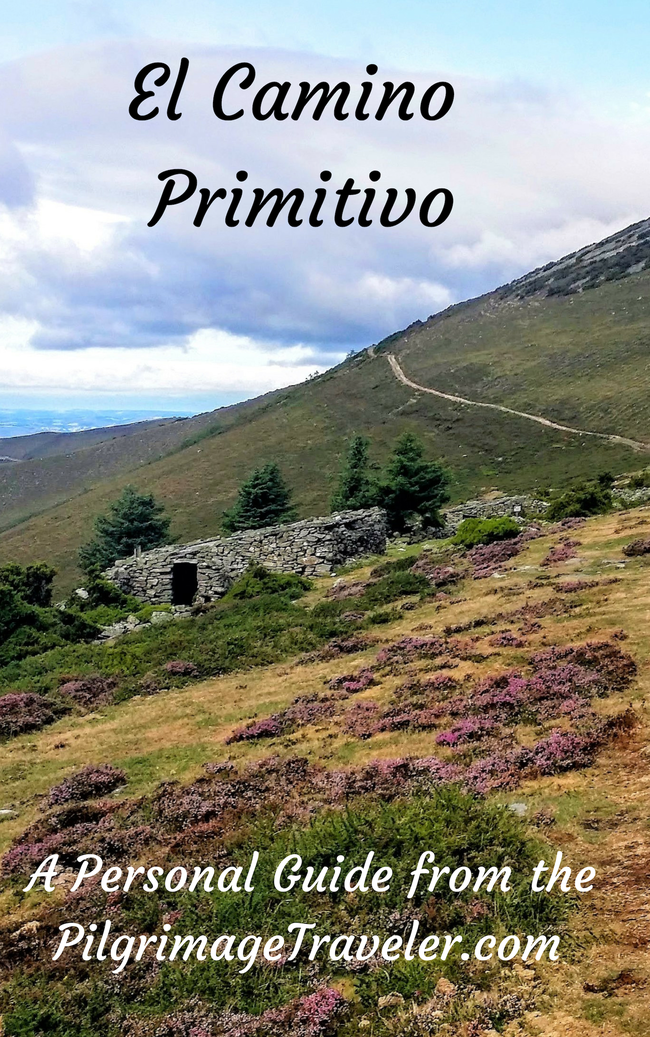
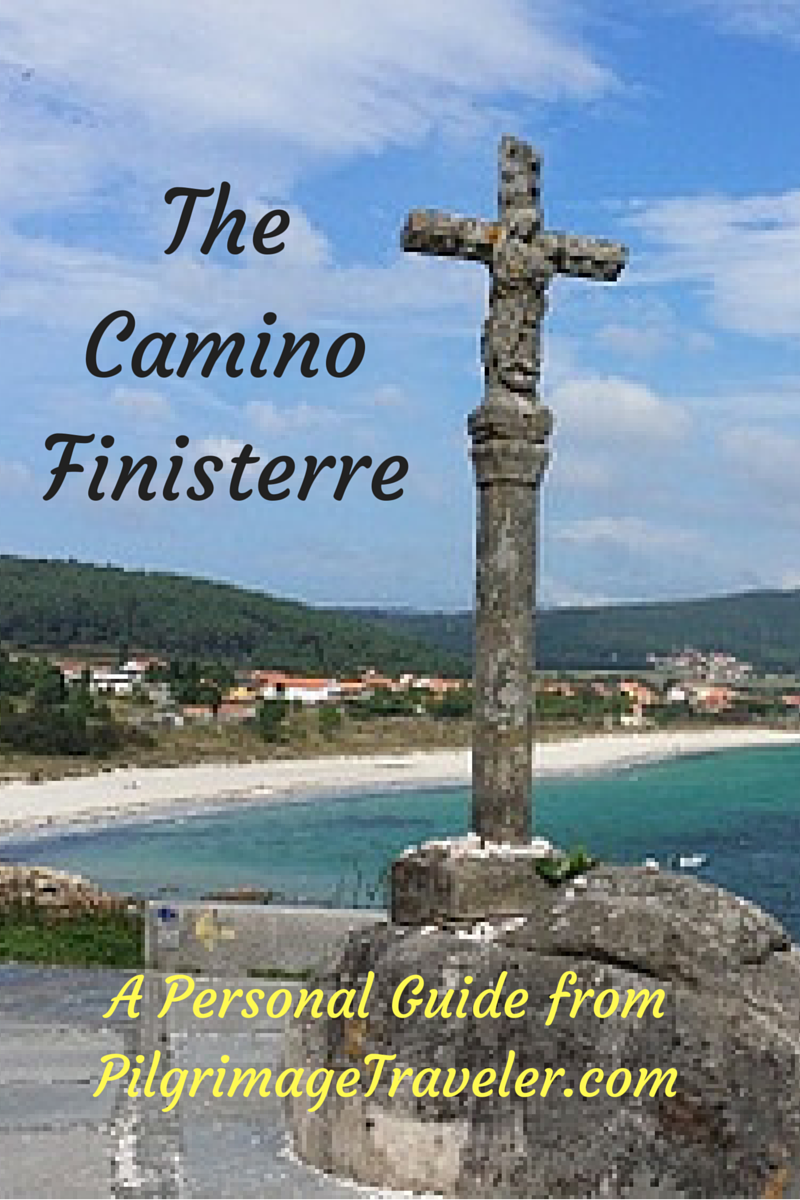
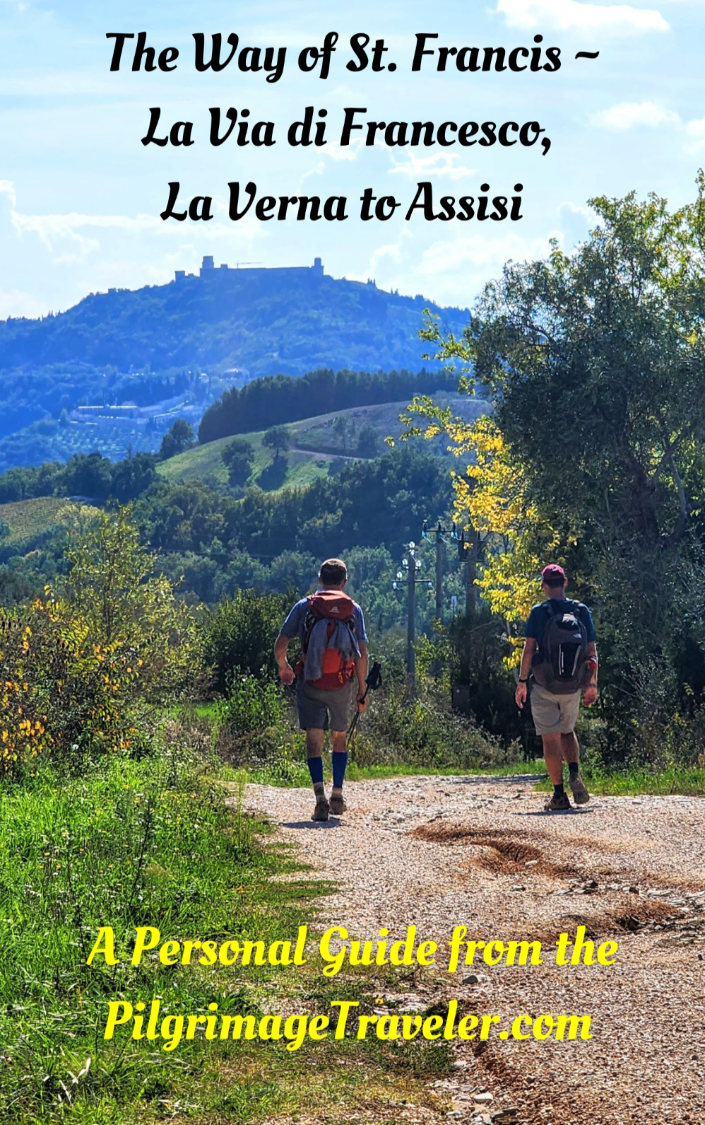
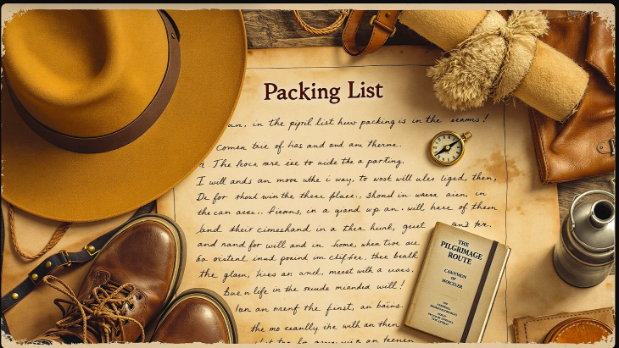
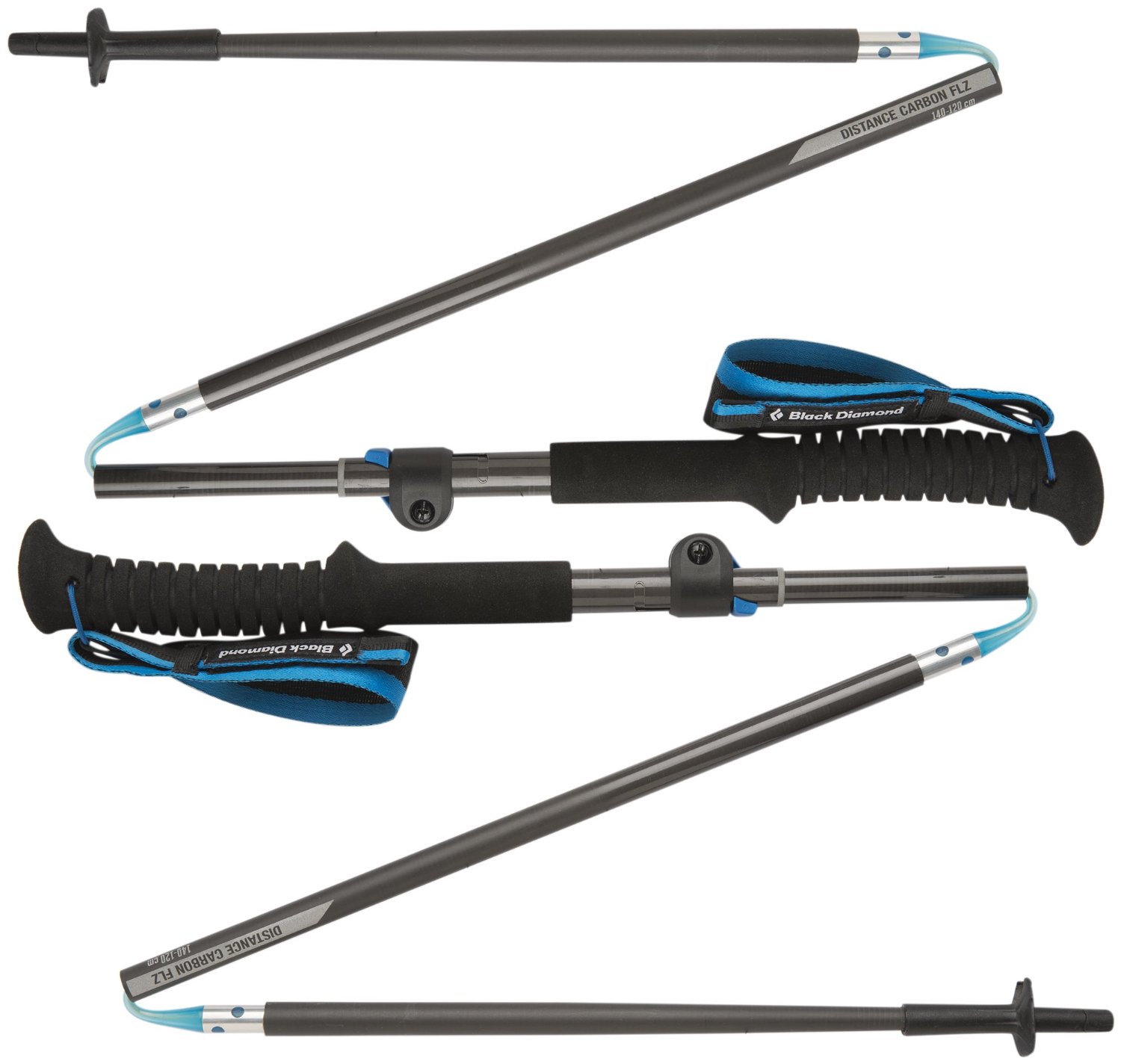

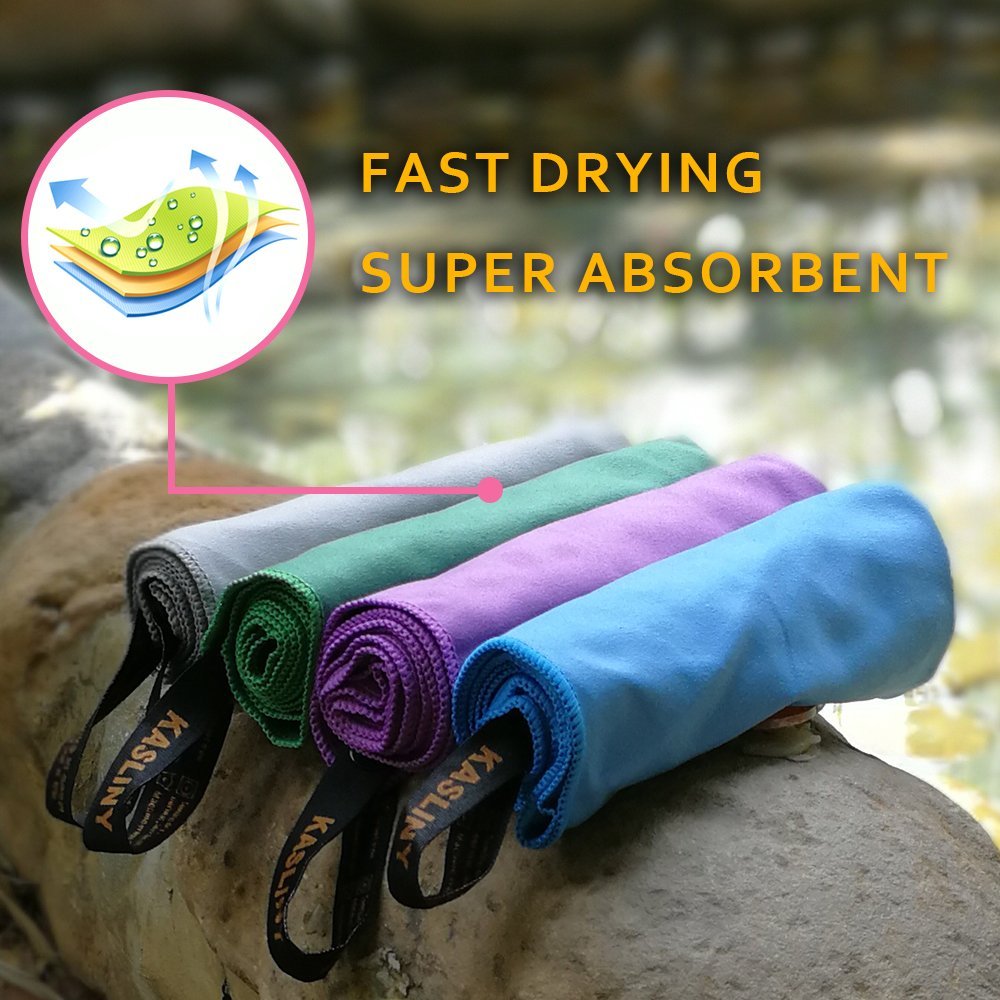
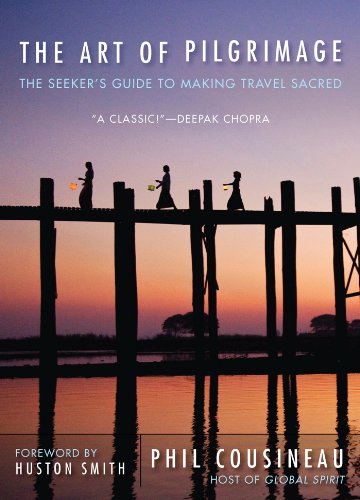


Your Opinion Matters! Comments
Have you had a similar experience, have some advice to give, or have something else you'd like to share? We would love to hear from you! Please leave us a comment in the box below.